4 Volumes
Constitutional Era
American history between the Revolution and the approach of the Civil War, was dominated by the Constitutional Convention in Philadelphia in 1787. Background rumbling was from the French Revolution. The War of 1812 was merely an embarrassment.
Culture: The Flavors of Philadelphia Life
Philadelphia began as a religious colony, a utopia if you will. But all religions were welcome, so Quakerism mainly persists in its effects on others, both locally and in America, in Art, clubs, and the way of life.
Sociology: Philadelphia and the Quaker Colonies
The early Philadelphia had many faces, its people were varied and interesting; its history turbulent and of lasting importance.
Philadelphia: Decline and Fall (1900-2060)
The world's richest industrial city in 1900, was defeated and dejected by 1950. Why? Digby Baltzell blamed it on the Quakers. Others blame the Erie Canal, and Andrew Jackson, or maybe Martin van Buren. Some say the city-county consolidation of 1858. Others blame the unions. We rather favor the decline of family business and the rise of the modern corporation in its place.
Philadelphia Politics
Originally, politics had to do with the Proprietors, then the immigrants, then the King of England, then the establishment of the nation. Philadelphia first perfected the big-city political machine, which centers on bulk payments from utilities to the boss politician rather than small graft payments to individual office holders. More efficient that way.
Philadelphia's Republican Machine
From time to time, someone denounces big-city political machines, making the mistake of describing them as invariably Democrat. Debaters duly object, pointing to Philadelphia's Republican city machine lasting seventy-five years. It was, indeed, a very tough and corrupt organization. Whether it was Republican, is more debatable. The question might be re-phrased: How is it, with Democrats running every other big-city political machine, Philadelphia alone produced a Republican version? The explanation is buried in complex national politics just before the Civil War, when the last and final Whig convention was held in Philadelphia, following which the successors, the Republicans and also the Know-Nothing (American) parties, held their very first conventions here four years later.

|
| James Buchanan |
To stir the Philadelphia pot still further, the person who actually won the 1856 Presidential election was James Buchanan, a Democrat from Lancaster County. Just about everything political was happening right here, all at once. Lots of deals were made. The Pennsylvania Republican delegation emerged as Abraham Lincoln's king-maker, and Lincoln as President rewarded Pennsylvania for its keen insight. Appointing cabinet members from Pennsylvania, the new administration naturally steered war contracts to our local industries. Philadelphia politics immediately became Republican in a big way, and after the war, the Republicans were then in charge of the national government for fifty years. Philadelphia had created a political machine, and it made no sense patronage-wise for many decades, for it to profess allegiance to any other party than the one it started with.
There thus exists a simple and coherent explanation for Philadelphia's exceptional behavior. A more difficult question to answer beyond dispute is: Why do big-city political machines almost invariably develop a Democrat affiliation? We're going to take a pass on that one, falling back on the observation that municipal politics usually have very little to do with national politics, no matter what Tip O'Neill may have said. Indeed, local politicians mostly wish national politicians would go back to Washington and leave them alone. National politicians certainly reciprocate that feeling, especially if they have a safe district.
But Party unity is periodically stimulated (some would say simulated) when the national figures must come back home from Washington seeking voter approval, searching out support in the clubhouses, fire stations and taprooms that are firmly in control of local warlords. Those warlords care little about foreign affairs, interest rates at the Federal Reserve, or globalization, becoming uneasy when the national politicians to whom they owe nominal fealty drag them into messy subjects like abortion and civil rights. In the clubhouses, there is a tendency to measure national leaders by patronage and pork barrel. In return, the national representative wants to be re-elected. He wants voter turnout, campaign funds, and gerrymandered districts. It's mostly the same in both parties, and in all regions.
When Bosses Ruled Philadelphia
A young Frenchman, Alexis de Tocqueville, once wandered around 19th Century America, went home to write a book about what he observed, and had as much impact on American sociology as any American author ever did. We now observe a young Englishman, Peter McCaffery, setting out to do the same thing. His insightful book, written from the sanctuary of Great Britain, is called When Bosses Ruled Philadelphia .
One must forgive his concluding fifty pages of notes and bibliography, and the first fifty pages of fumbling around, as signs of stage fright when the message is both novel and unwelcome. It's likely that an English study which purports to dissect American politics might really be a disguised attack on some English situation. But who cares. Once McCaffrey gets going, he tells a Pennsylvania story succinctly and remorselessly.
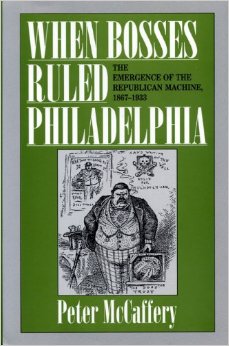
|
|
When Bosses Ruled Philadelphia |
On one level, McCaffrey satisfactorily settles two nagging questions of American political bossism: Why are big-city political machines almost always Democrats, and why was Philadelphia for seventy years the one Republican exception to this rule? To do so, he forces the reader to examine the sins and merits of urban politics, and to ask the ultimate question of democracy: why do decent citizens of a decent city, put up with it? When he is done, the author leaves the reader with a feeling of grudging admiration for the cleverness, as well as horror at the unscrupulousness, of hard-ball urban politicians.
The Philadelphia Republican machine was really two machines, a feudal barony started by James McManus, followed after a few decades by a dictatorship run by Matthew S. Quay. These names are quaintly unfamiliar, unlike Penrose and Vare, as if the author of our book might have pointedly chosen to refer to the Franklin Roosevelt era as the era of Jim Farley. He is indeed making a pointed observation. One of the time-honored rules for being effective as a political boss is to remain outside the nominal hierarchy of government, for the very practical reason that it permits political bribery without any direct bribing of elected officials. Public outrage would be strong, and the laws are quite specific that you mustn't give bribes to a politician. McCaffrey is here pointing out that it really isn't necessary to give the money to a politician.
There really seems to have been quite a lot of graft in Philadelphia's past. Some of it was pretty crude, but the biggest source of the graft was known as "clean graft", where an adjustment of zoning laws, or public construction, or urban redevelopment can be shifted in the direction of putting favored friends in a position to exploit advance knowledge or win the bidding on public contracts. The author cites the Gas Works, the Ben Franklin Parkway, the Roosevelt Boulevard, and a list of other public achievements as primary vehicles for rewarding those who reward you. There probably is a lot of awful truth buried in those fifty pages of footnotes.
But that's the lesser half of it. What emerges here is the disheartening reality of the bosses relentlessly controlling the nomination process, ensuring that pliable, "cooperative", elected officials are placed in a position to divert the public bidding process in one direction, and the public investigative process in another. Colorless candidates are definitely preferred; public leaders who acquire a public following are disagreeably hard to control. The bosses positively liked to see some personal flaws; alcoholism, woman-chasing, and similar peccadilloes mean that the bosses "had something on them". The appalling consequence of such a system is that it deliberately sets out to avoid good public leadership, and intentionally prefers incompetence to competence.
In the early, or McManes, days of this system, the city was ruled by a hundred fierce warlords, who duked it out with vigor. Many recent sociologists have praised the urban machines for serving a useful function in providing needed social services to politically isolated groups. Our author McCaffrey will have none of that. These bosses were in it for the power and the money and had almost no interest in the ideological issues which purportedly supported the political party they nominally served. They were neither Republicans nor Democrats, they were members of the political class. In his opinion, the transformation of the Darwinism of McManes to the dictatorship of Quay was inspired by the growth of utility corporations, with the names of Widener and Elkins prominently featured. Large, geographically scattered trolley, electricity, gas utility, telephone, and similar corporations could not afford to negotiate innumerable bribes with every local bartender's brother. They didn't mind the cost, which could be passed on to the consumer. The new goal was not an absence of graft, but rather efficient one-stop graft. From the briber's perspective, that goal requires a powerful boss in charge of local government, able to keep lesser officials in line so they will remain largely satisfied with how he distributes the tribute.
And the reformers? Well, Philadelphia had one huge convulsion of municipal reform in 1911, when Mayor Blankenhorn drove the money-changers from the Temple. But our English author tells us this brief episode had a little lasting effect because a few officials at the top cannot transform an organization which is organized among thousands of city officials, right down to the humblest clerk. According to McCaffrey, the political bosses simply manipulated Blankenhorn's election to rid themselves of many of their own uncooperative enemies, and then patiently waited for public indignation to subside. It only took one election cycle. The technique for controlling reform types is quite standard: deflect them in the direction of state and national politics, where they won't get in the road. And where they don't matter.
One comes away from this book with an appalling realization how difficult it is for simple honest souls to root out corruption in their local governments. Unless you are part of the game, you don't even know the rules. In fact, you even have to wonder if having a large earnest and honest population might actually be a magnet for con artists.
REFERENCES
| When Bosses Ruled Philadelphia: Peter Mc Caffery ISBN-13: 978-0271034300 | Amazon |
The Republican Convention (1900)
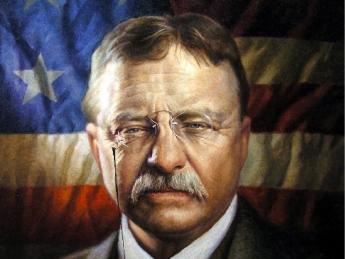
|
| Theodore Roosevelt |
Republican Presidential Convention of 1900 was held across the street from what is now Children's Hospital at 34th and Spruce Streets. Although the re-nomination of an incumbent President (McKinley) is always a boring, foregone conclusion, the Vice-Presidential nomination, in this case, was a hilarious circus. Boss Platt of New York hated Governor Teddy Roosevelt and wanted him out of Albany. So he persuaded Boss Matthew Quay of Pennsylvania to engineer Roosevelt's nomination as Vice President, which Quay did by threatening to deprive the Southern states of half their seats at the next convention, then relenting when they agreed to vote for Roosevelt. This was highly displeasing to Boss Mark Hanna of Ohio, the National Chairman, who didn't like Roosevelt and hated even worse to be beaten on any issue. It looked like Roosevelt was going to win, except for one thing. Roosevelt didn't want the job, which is a notorious political dead end. In the event, after much scheming and rumoring, Roosevelt was the unanimous choice of the convention, except for one vote. He voted against himself.
The Convention presented two other ironies. The first was that everybody had it all wrong. McKinley was assassinated, and Roosevelt became President. Everyone involved would surely have voted the other way if it had been known what would happen.
The other irony was contained in a large electric sign on Broad Street during the convention. Two thousand light bulbs, quite a novelty for the time, displayed in large letters: THE PHILADELPHIA INQUIRER. MORE REPUBLICAN READERS THAN ANY PAPER IN THE COUNTRY.
That Damned Cowboy
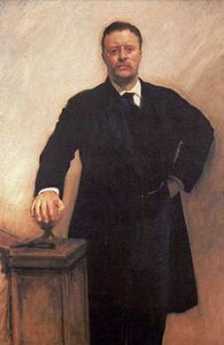
|
| Teddy Roosevelt |
Republican Presidential Convention of 1900 was held across the street from what is now Children's Hospital at 34th and Spruce Streets. Although the re-nomination of an incumbent President (McKinley) is always a boring, foregone conclusion, the Vice-Presidential nomination, in this case, was a hilarious circus. Boss Platt of New York hated Governor Teddy Roosevelt,and wanted him out of Albany. So he persuaded Boss Matthew Quay of Pennsylvania to engineer Roosevelt's nomination as Vice President, which Quay did by threatening to deprive the Southern states of half their seats at the next convention, then relenting when they agreed to vote for Roosevelt. This was highly displeasing to Boss Mark Hanna of Ohio, the National Chairman, who didn't like Roosevelt and hated even worse to be beaten on any issue. It looked like Roosevelt was going to win, except for one thing. Roosevelt didn't want the job, which is a notorious political dead end. In the event, after much scheming and rumoring, Roosevelt was the unanimous choice of the convention, except for one vote. He voted against himself.
The Convention presented two other ironies. The first was that everybody had it all wrong. McKinley was assassinated, and Roosevelt became President. Everyone involved would surely have voted the other way if it had been known what would happen.
The other irony was contained in a large electric sign on Broad Street during the convention. Two thousand light bulbs, quite a novelty for the time, displayed in large letters: THE PHILADELPHIA INQUIRER. MORE REPUBLICAN READERS THAN ANY PAPER IN THE COUNTRY.
Republican Convention in the Wigwam (1860)
There were no Republican National Conventions in Philadelphia between 1856 and 1872, but during this period the town became solidly Republican, and federal political patronage had its biggest impact on the region's economy. Pennsylvania threw the nomination to Lincoln in 1860, and Lincoln paid us back.
The 1860 Convention was held on Wacker Street in Chicago, in a building called the Wigwam. Abraham Lincoln was the favorite son on Illinois, and so his cronies had considerable influence on the convention arrangements. They used this influence, for instance, to counterfeit several hundred tickets of admission to the galleries. The strong favorite to win the nomination was Mr. Seward of New York, and it is fair to say he confidently expected to win. The galleries roared with applause and shouts of approval of any mention of New York, or Seward. On balloting day, the Seward supporters went out into the streets with a joyous noisy parade, which greatly stirred their fervor. However, when they returned to the Wigwam, they found their seats taken by the Illinois supporters of Abraham Lincoln. From that point forward, all mentions of Lincoln, Illinois, or the Great City of Chicago were greeted with thunderous applause and acclamations by the audience.
On the first ballot, as expected, Seward was in the lead,173 votes to Lincoln's 102, followed by about fifty votes each for Simon Cameron (of Pennsylvania), Salmon Chase of Ohio, and Edward Bates of Missouri. Since everyone knows that Lincoln eventually won, we can now look forward to Lincoln's cabinet, which was to contain William Seward as Secretary of State, Bates as Attorney General, Chase as Secretary of the Treasury, and -- Simon Cameron of Pennsylvania as Secretary of War.
The Pennsylvania delegates from Bucks and Chester Counties were than the rest of the state, and privately regarded their favorite son Cameron, as a crook. Having dutifully voted for their favorite son on the first ballot, the Pennsylvania delegation was then free to make deals. As the roll call of the second ballot moved down the line, there was not much changing of votes. The people in the galleries were shouting away as usual, but the delegates were carefully marking their lists with stubby pencils. When the vote came to Pennsylvania, the insiders were electrified with the realization it was all over. Pennsylvania threw essentially all its votes to Lincoln. Ohio and Missouri immediately got the message and stumbled along to climb on the bandwagon. Lincoln was in.
Historians have frequently noted the unexpected upset had a disproportionate effect on Southern opinion -- after all, scarcely any Southern candidates made it even to the first ballot, and no Southern boss was anywhere near the smoke-filled rooms where the leadership settled things while the ordinary delegates were out at parties. Furthermore, it was an anti-slavery sentiment that made Pennsylvania switch.
But somewhat less noted is that the highly political new President soon got a hard-minded new Secretary of War. Cameron wanted, and got, lots of factories to make boots and uniforms, guns and gunpowder, Army depots, Naval Bases -- and so on, and so forth. The Pennsylvania Republican machine was in business for decades to come.
Mayors and Limos
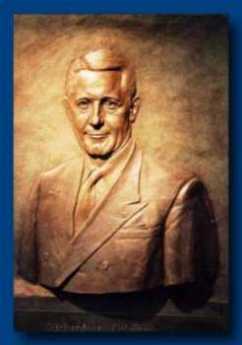
|
| Mayor Richardson Dilworth |
A number of prominent figures participated in the downtown revival of Philadelphia after the Second World War, with a surprising amount of jealousy among them. Mayor Richardson Dilworth would have to be mentioned in any list of those leaders, but one who was more admired than loved. Aristocratic and flamboyant, he disdained the little hypocritical dissembling so characteristic of politicians. In fact, he didn't see himself as a politician at all, he was a leader.
Once Dilworth became convinced that Society Hill revival was not only desirable but feasible, he moved there. He purchased two houses next to the Athenaeum on Sixth Street, and in spite of the protest of preservationists that those two houses were particularly fine examples of Federalist style on Washington Square, he had them torn down. Furthermore, in spite of outcries that the house he was building in their place was merely a pseudo-colonial gesture, he constructed a very expensive but extremely comfortable modern house. Those of us who were familiar with the neighborhood were impressed with the courage he displayed in doing this, because the area was just a little dangerous, and almost no one else lived there. You could buy dozens of twenty-room houses in the neighborhood for less than $2000 apiece, and it seemed foolhardy to make such a large personal investment in what might become a stranded gesture. This was described as flaunting his personal wealth because it was not just a fine house, it was possibly going to be a big loss.
Dillworth got away with it. He was seen as courageous, and a leader. Others started moving into the area, mostly rehabilitating old mansions. By the time the house was eventually sold by his estate, his conspicuous consumption turned out to be a profitable investment. Smart.
Dilworth had some practical problems. It wouldn't have been smart politics to have a long black limousine pick him up in the poor neighborhood. The only people who do that are undertakers and the Mafia. On the other hand, the driver of a limousine often doubles as a bodyguard, and a bodyguard wouldn't be a bad idea. Those of us who drove down 6th Street every morning at 8:30 gradually noticed what Dilworth did to solve the problem.
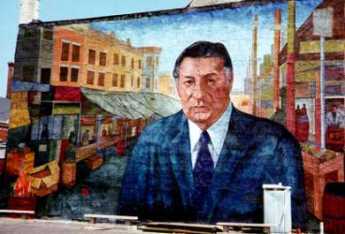
|
| Frank Rizzo |
Every morning a Yellow Cab could be seen parked outside his door. It always had the same uniformed driver, and on closer inspection, the cab was the cleanest shiny late-model car, painted yellow. It was only six or seven steps from the door of the house to the door of the car, and he was off and gone in a moment.
Other mayors have had quite different styles.Frank Rizzo had his long black car and several like it parked on the sidewalk outside City Hall. His image was that of a poor boy from the neighborhoods who had made it to the top. No matter where he went, Rizzo was leading a parade.

|
| Ed Rendell |
Ed Rendell, on the other hand, was playing the role of America's Mayor. His driver would blow the horn, put on the headlights during the day, roar through town, making screeching u-turns right and left. Several times a day he would put on this act, going two blocks from City Hall Annex to the Convention Center, to address an audience of visitors.
Well, mayors and bank presidents are supposed to have limousine service. Anyone else would have to ask whether it was worth all the trouble if instead, you could just catch a cab. Those long cars are surprisingly uncomfortable to ride because the roof is so low you have to crawl on hands and knees to get in a seat. Finding a place to park one of those monsters, or even a wide enough opening next to the curb to let out the back-seat occupant, can be a problem in the center of a city. Even with portable cellular phones, there is a delay after you call for the car when you are ready to leave your appointment. Those who have tried it find that hiring a driver almost always confronts you with a demand to circumvent taxes by paying the driver in unrecorded cash. In South America, where bodyguards are really necessary, the great majority of them flee in terror at the first sign of the underworld. Limos are a pain.
At least in Philadelphia, you can get a fairly clean, fairly new cab with a fairly knowledgeable driver, by simply holding up your hand at any center city street corner. During business hours at least, you can hail a cab in three minutes. That doesn't just happen that way, and the mayor has something to do with it. Cities usually have a Medallion system of cab licensing, and existing cab companies don't want any medallions issued to competitors. In politics, such a situation helps campaign funds considerably. The result is a shortage of cabs, surly drivers, and high prices. Boston is such a town. On the other hand, if medallions are easy to obtain, as they are in Washington DC, the cabs become numerous enough but are shabby dilapidated old vehicles, driven by recent immigrants who don't know the street names. In Philadelphia, we take our good fortune for granted, but we do owe a debt to the city government for managing the supply and demand situation to the point where it mostly would be foolish to have your own car and driver. In this town, every man a king.
As a matter of fact, in Boston it got so bad that Ned Johnson, the richest man in town (he personally owns the Fidelity Mutual Fund Investment Family) got so enraged that he couldn't ever get a cab that he founded his own cab company. It's a very elegant one, although a little expensive. The Boston Coach Company supplies immaculate and impeccable service for a fee. At first, it was only available to Fidelity executives but now has spread out to anyone willing to pay for it, and flourishes in many cities, plus chartered airplanes if you don't like to wait in security lines at airports. You have to admire Johnson for his golden business touch, but in Philadelphia, we can just use cabs.
Mark Twain Observes 1890 Pennsylvania Politics
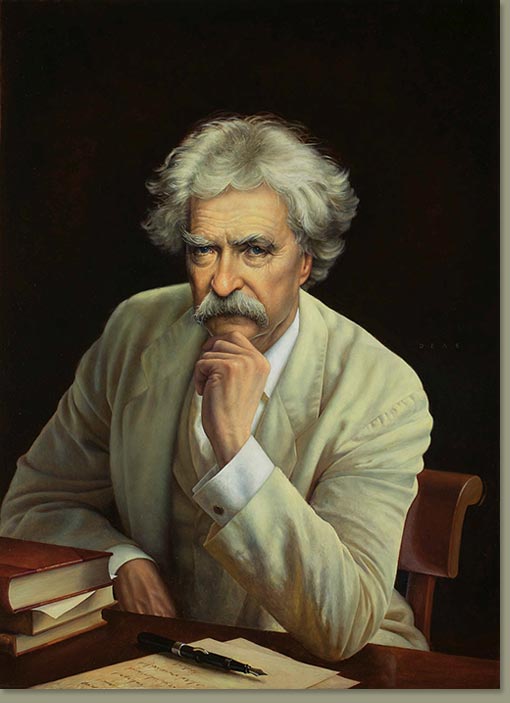
|
| Mark Twain |
Mark Twain's Notebook, Aug. 1890-June 1891:
" Wm.Penn achieved the deathless gratitude of the savage by merely dealing in a straightforward way with them--well, kind of a square way, anyhow--more rectangular than the savage was used to, at any rate. He bought the whole state of Pa from them and paid for it like a man. Paid $40 worth of glass beads and a couple of second-hand blankets. Bought the whole State for that. Why you can't buy its legislature for twice the money now."
Local Elections (2)

|
| Office |
We've had our local city elections, " but most of us are a little uncertain what they were all about. The Discovery of FBI listening Devices in the Mayor's ceiling almost certainly turned a close contest into a triumph for the incumbent. Whether he was a victim of persecution or just an agile manipulator of public opinion is unclear except to extreme partisans, and the rest of us will just have to wait to see what it was that convinced a Federal judge to permit the wire-tapping, and what will come of it in later court actions.
What the wise-guys are saying is that the election should have been about this: whether it is a good idea to borrow money in order to expand the tax base. In its most extreme form, it might mean floating a bond issue to lower the wage tax. Or, it might mean a bond issue to pay for large public works, hoping that either a lower wage tax or a new public activity might attract business to the city, eventually generating extra taxes. One might say it is the Laffer Curve, or supply-side economics, revived in the language of liberals. The idea has its plausible features since it is essentially an extension of the accepted business maxim that you must spend money to make money. Unfortunately, the idea was extensively tried out in Pittsburgh recently and seems to have driven Pittsburgh to the edge of Municipal Bankruptcy.
"At the very least, the concept needs to include the warning that if you hope to stimulate the local economy by building stadiums, you must be either wise or lucky in your timing. A recession, after all, is a time when most businesses are hesitant to make new investments, so municipal investments during a recession have greater risks, too. Such counter-cyclic behavior at the Federal level can be paid for with inflation if you are willing to pay that price, but a local municipal government can't print money. Therefore, such borrowing to widen the tax base is probably dependent on the ability to get assistance from the Federal government, and those wire taps in the Mayor's ceiling suggest a certain amount of Federal unfriendliness.
The other way to look at this matter is to say that Pittsburgh financial pickle will force the state legislature to be less generous with other parts of the state, especially Pittsburgh's traditional urban rival on Delaware. Having a former mayor as governor will help Philadelphia, maybe, but it must be remembered that state governments are not allowed to print money, either. And in case you thought having two Republican Senators would induce the Federal Bureau of Printing and Engraving to be completely unconstrained, remember that the certain consequence of inflation is a fall in the value of the dollar, a rise in interest rates to combat inflation, and hence a rise in the price of both commodities and imports. It's a little hard to be sure that it's worth that in order to have five new sports stadiums.
Local Elections
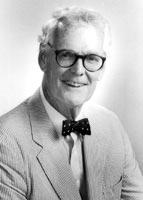
|
| Thatcher Longstreth's |
Philadelphia will have local elections in early November, 2003, electing a mayor and city council. No doubt we can anticipate the Inquirer will have an editorial one or two days earlier, stating the preferences of that newspaper in the election. Between now and then, there might be a few articles in the news section describing some antics of one candidate or the other, desperately trying to get some news attention. If the candidates are particularly desperate, there may be a lawsuit filed about something or other, which will quietly disappear from sight a few days after the election. But the public is smart and will ignore any lurid stories in the month before an election. The day after the election there will be a headline telling the world who won and in which districts. After that, business as usual. Perhaps the whole thing is business as usual.
So, it is of some interest for us politically non-involved people to overhear how a real insider politician recently described this election. For all I know, there isn't a word of truth to it, but at least we all can momentarily share in the corridor gossip of the courthouse gang. Nobody said that corridor gossip had to be true. My pol friend rattled on like this:
You may think this is an election between a Democrat and a Republican. Well, it's really an election between three Democrats. One of them isn't even on the ballot, and there is even an argument about which of several people is the third man. The City Charter contains complicated rules which have the effect of electing five Democrats and two Republicans to City Council. The Democrats are split into two factions, three to two, so the real control potentially falls in the hands of the two Republicans, who thus have the power to swing things one way or the other. Therefore, it is possible to say the exciting election this November is not between the two candidates for Mayor, but rather among the several Republican candidates for Thatcher Longstreth's vacated seat in"Chestnut Hill. The two Democrat factions are silently struggling to elect the particular Republican whom they think they can influence to come over to their side. Now, the Republican candidates are not likely to tell you which Democratic faction they are bargaining with, but you will eventually be able to tell. The Council, once elected, will then elect the President of City Council, and by the identity of who gets chosen President of the Council, it should become obvious even to outsiders what deals the Republican made. That is, you will be able to tell if you just know which faction the successful City Council President himself belongs to. If Street becomes Mayor and his enemies control City Council, things will be interesting indeed.
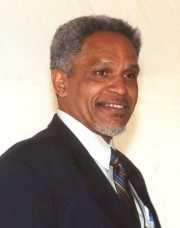
|
| Mayor John Street |
But that's only one way to read the election. A second way is to watch what Bill Gray has to say. Bill Gray, the former congressman, who represents the upwardly mobile, better educated, the portion of the black community. In the cruel language of bar-room politics, Gray leads the house slaves, while Mayor Street leads the field slaves. (I'm only just quoting, to give you the flavor of cynical
Highway Beautification

|
| Prince Grigory Potemkin |
Someone who has traveled in modern China -- and is at all observant -- knows that the extensive slums and trashy wastelands of the Inner Kingdom are systematically hidden from tourist's eyes by fences and plantings of tall trees. In a few years, the trees will grow a few feet taller and fully conceal what is behind them, but today modern tourist buses are high enough so you can see over the treetops if you look. When American tourists notice this, they are very smug.
The term Potemkin Village is a somewhat exaggerated term for the process Grigory Potemkin used to clean up the villages that his girlfriend Catherine the Great passed through on her visit to southern Russia and Crimea. He apparently did not construct whole fake villages as enemies claimed, but he was unnecessarily forceful,
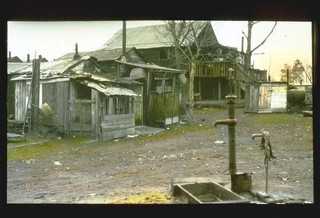
|
| West Philadelphia, at one time. |
let us say, in his efforts to smarten things up. After taking a few rides on Philadelphia's suburban commuter trains, or a boat ride up to its rivers, the idea does cross most minds that we could use a Potemkin in charge of our Streets Department, or maybe a Communist Chinese on loan. We have miles, maybe even hundreds of miles, of overgrown weeds along our embankments, spiced with the discarded trash of historic duration. Since nobody wanted to live next to coal-burning locomotives, and most people even dislike the noisy though cleaner replacements, the houses along the railroad clearly deserve to be hidden. That's true in almost every town in the world (not Japan, not Switzerland) and it's deplorably true in our Philadelphia. Seaports and riverbanks are a mess everywhere, too, and we are certainly in style in that department as well. Why can't the Schuylkill look like the Seine, next to the cathedral of Notre Dame?
So the Chinese have combined the concept of cleaning up their public spaces, which we applaud, with the concept of hiding the economic truth, which we sneer at. Maybe we should give some thought to a spin campaign, the essence of which is a metropolitan crusade to pick up the trash, build some strategic fences, and plant a whole lot of tall evergreens along with the public ways. We've made a good start with Boathouse Row; why not extend it to Gray's Ferry, or even to Norristown? The idea is not a new one; Lady Bird Johnson made it her main goal in public life.
In 1965, Lyndon Johnson used his famous powers of legislative persuasion to give his wife what she wanted. The Highway Beautification Law of 1965 was passed by Congress on Lady Bird's birthday, with everyone in the gallery dressed in evening clothes. With the vote counted and enormous standing applause registered for fifteen minutes, the whole group traveled over to the White House for a signing of the law with nineteen pens. There followed the birthday party at the White House, to end all birthday parties. Highway billboards were a thing of the past.
That was forty or so years ago, and unfortunately, the billboard companies didn't like it at all. Through administrations both Democrat and Republican, the Department of Transportation has never issued regulations, so Highway Beautification was never implemented. It represents just one more unwritten aspect of the Constitution that James Madison and his friends didn't fully anticipate.
Henry George, Single Tax
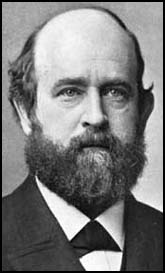
|
| Henry George |
Philadelphia was the birthplace of Henry George at 413 South 10th Street between Pine and Lombard, in 1839. The house has been restored to its 1839 condition and serves as the Philadelphia extension of the Henry George School for Social Studies, where you can take a course or two on the economic theories of Henry George, especially the Single Tax. If you do so, you can join the rest of us in pondering whether Henry George was a genius or a nut; he certainly combined some elements of both.

|
| Henry George House |
Leo Tolstoy no less, felt there was a conspiracy to keep people from knowing about the theories of Henry George, saying, "People do not argue with the teaching of George, they simply do not know it." In 1879 Henry George published a book, "Progress and Poverty which made him so famous he became a candidate for Mayor of New York City. Although he lost the election, he outpolled the third candidate, Theodore Roosevelt. The underlying thesis of his book would probably not find much approval among contemporary economists, who would likely say he was fooled by a cyclic increase in the value of land as an asset class. What he said was there was a remorseless trend of land to increase in value, while the proportion of wealth represented by labor and capital steadily diminished. Nevertheless, it can still be argued that: proceeding from the wrong premise about the causes of poverty, he might have propounded an attractive cure -- the single tax. Henry George asserted that we should stop taxing buildings ("improvements") and place all municipal taxes on land.
There could be something to this. It is uncomfortably true that your taxes go up whenever you build a new building or substantially renovate an old one. The increased taxation of improvements is a disincentive to the building, renovating and improving a property. Placing taxes on the underlying land, by contrast, would create a positive incentive to build something and put the land to use. Evidence can in fact be produced that partial adoption of this principle has caused considerable prosperity in Pittsburgh, notwithstanding that city's recent flirtation with bankruptcy for unrelated reasons. Pittsburgh has shifted the proportion of real estate taxes from structures to underlying land, several times, and each time the change was followed by a demonstrable flurry of real estate development. Philadelphia had no similar flurries at those times, and it is said the contrast was caused by State Law which forbids such "discriminatory" taxation in first-class cities. Pennsylvania has only only one first-class city, Philadelphia, so you don't have to guess which city the Legislature had in mind.
Before we let ourselves get too embittered by dirty politics, we should take a look at Arden, Delaware, which is another nearby town to try the Henry George approach. Arden is a little country suburb of Wilmington which became a summer art colony, with theater groups, especially favoring Shakespeare. Arden, which is Shakespeare-speak (in As You Like It) for the Ardennes Forest in France, applied the Henry George rules to taxing the land not the summer houses of the area. So, go take a look there at the result. More and more houses crowded closer and closer together -- on the same land. There's plenty of open land over the next hill where Arden supporters could drive or even walk in ten minutes, so the Henry George system is quite effective all right. But the effect is not entirely what was intended. Leo Tolstoy is gone, so someone else must unravel this riddle.
TV and Politics
 Political campaign costs are mostly on TV costs. It has the effect of silencing TV news reporting. 
|
| Dr. Fisher |
If we must have a national debate about political campaign finances, with laws being proposed by candidates for office, perhaps it is time to say a few things that politicians are forced to skirt. About 75% of the campaign finance money is spent on television advertising.
The effect on television itself has not been mentioned. While the net revenues of television are simply astronomical, television news coverage is getting skimpier and skimpier. That's clearly not because they need to save money. It's because television is now in a position where it cannot afford to offend any politician by expressing opinions about current affairs. Both political parties in any local, state or national election have plenty of money to spend onTV advertising, and there is a significant risk to television revenue if they take any sides on any issue.

|
| Newspaper Extinct |
Meanwhile, television is one of the main factors in the decline of newspapers, who characteristically do take partisan sides. There can be lots of reasons why newspapers are more opinionated, but they have relatively little revenue to lose from political advertising, hence little to fear in the way of retaliation. But television has been stealing the advertising revenue of other sorts, forcing the newspapers to cut expenses. Between the two news sources, the effect has been to reduce the flow of news, one because it can't afford news, the other because it doesn't dare injure its golden goose. There once were forty newsmen assigned to cover Philadelphia City Hall. Now, there are five. What do you suppose that will do to the volume of corruption?
Curiously, the effects extend in other strange directions. Television has jacked up its prices for advertising in the month of October to the point where a lot of advertisers are forced out of the market. October is just before Christmas, the main retail selling period. That can't be very good for Christmas sales volume.
These things are beginning to attract attention from groups like the Committee of Seventy, who are starting a website of their own to fill the vacuum. There's been a lot of talk about internet blogs creating competition for the news. Maybe, the bloggers are just filling an unmet need.
The Web As Investigative Reporter

|
| Reporters |
Freedom of the Press seems a tiresome, old topic, until the Internet gets considered. What's fundamentally always been at issue is the election process, useless without people knowing what they are voting on. Freedom of the Press has smaller value, the day after election.
The point here is that the Internet has added considerable speed to the spread of public information, and its two-way character also speeds up the process of reporting falsehoods. Everyone understands politics can get dirty, and it is most important to discourage lies and discredit liars, in time for election day.
Newspapers are only a part of the process. Investigative reporters actually investigate very little; they sit about the newsroom hoping for someone to bring in the news of a scandal. Because informants usually have some self-serving motive, a responsible editor will not permit such a story to be printed without independent verification. If the election comes and goes before the story is verified, it's too bad for democracy, why to bother with a useless expose; The traditional way to slow down publication is to threaten a libel suit. In this way, libel suits, investigative reporting, editorial courage, and political campaigns are all one big ball of wax, different parts of the same game. Protection of anonymous press reports accelerates publication, while libel suits retard publication. Early in November, time matters, so enter the Internet.
In a funny sort of way, the Internet tends to diminish the injury of labeling someone, just because it lacks much restraint. Websites have a smaller audience than newspapers, and their audience is more specialized. Therefore, collective injury to an innocent person's reputation is greater where the audience is also more innocent, as it is when a whole city picks up the morning paper. Furthermore, the Internet audience can react. They can pummel the reporter's boss, the editor. They can pummel the editor's boss, the publisher.
Hit and run dirty politics will always be with us. But with the web there's getting to be less time to run -- after the hit, but before the exposure.
Benjamin Franklin: Chronology

|
| Ben Franklin on the cover of Time magazine |
January 17, 1706 Born in Boston, the thirteenth child of a candle maker; only went through 2nd Grade, Apprenticed to his brother as a printer, ran away to Philadelphia age 17 .
1723 Arrived in Philadelphia penniless, readily found work as a printer.
1725-26 First trip to England. Researched printing equipment, but probably lived a riotous life.
1726-1748 Returned to Philadelphia to found his own print shop and bookstore. Wrote and printed Poor Richard's Almanack organized local tradesmen into the Junto, formed partnerships with sixty printers throughout the colonies, obtained the print business of local governments, became postmaster. Able to retire at the age of 42 by selling his business for 18 annual payments, which offered him comfort and ease for considerably longer than his life expectancy.
-------------------------------------------------------------------------------
1751 Helped found Pennsylvania Hospital. Entered the legislature.
1751-1757 Active in legislature, rising to leadership during the French and Indian War, Pontiac's Rebellion and the uprising of the Paxtang Boys.
1754Took a noteworthy carriage trip to the Albany Conference, accompanied by fellow delegates Proprietor Penn and Isaac Norris at which he proposed unification of the thirteen colonies to fight against the French. Composed the first political cartoon "Join or Die" for that purpose. Notes for the trip on the blank pages of "Poor Richard's Almanac", now at Rosenbach Museum. The other delegates rejected the plan.
1757-1762 Second time in England. Acted as representative of both Pennsylvania and Massachusetts. After his electoral defeat, he returned to England for a total of eighteen years, suggesting hidden British sympathies may have been present. .
1762-1764 Returned to Pennsylvania Legislature, where his unpopular agitation for replacing the Penn Proprietors with direct Royal government led to his electoral defeat and the end of his elective career. The defeated but determined Quaker party sent him to England to lobby against the Penn family and for the rule of Pennsylvania by the King.
1764-1775 Third British visit. Although unsuccessful in his lobbying, his fame as a scientist made him welcome among the famous members of the Enlightenment, like Hume, Adam Smith, Mozart. Meanwhile, the colonies became considerably more rebellious than he was. His blunder with the publication of some letters gave the British Ministry an opportunity to humiliate and disgrace him in public, probably as a warning to the mutinous New England leaders. It irreconcilably alienated Franklin, who sulked, then packed up and joined the Continental Congress the day he arrived back home.
March, 1775-October, 1776 Brief but fateful return to America. Decisions were made in London to put down the colonists by as much force as necessary. Meanwhile, Franklin persuaded the Continental Congress they must declare independence from England if they expected help from the French.
July 4, 1776, Independence is declared within days after the arrival of a massive British fleet in New York harbor. Franklin dispatched to France to secure the assistance he was confident he could get.
1777-1785 France. Franklin served admirably as American ambassador, his wit and charm persuading the French to overextend themselves with ships, supplies, and money, and very likely contributing to the French Revolution by popularizing the American one.
1785-1790 Returning as a national hero for his final five years of life, Franklin loaned his personal influence to the constitutional convention, became President of Pennsylvania, worked for the abolition of slavery.
April 17, 1790 Died, probably of complications associated with kidney stones.
Corrupt and Contented
In 1904, first in McClure's Magazine and then in the book Shame of the Cities, Lincoln Steffens described the root cause of Philadelphia's bad local politics as failure of the people to turn out to vote.
The Philadelphia machine isn't the best. It isn't sound, and I doubt if it would stand in New York or Chicago. The enduring strength of the typical American political machines is that it is a natural growth -- a sucker, but deep-rooted in the people. The New Yorkers vote for Tammany Hall. The Philadelphians do not vote; they are disfranchised, and their disfranchisement is one anchor of the foundation of the Philadelphia organization."
Just exactly a century later, a Republican member of the Legislature coined a phrase:
"You show me a hundred thousand dollars, and I'll show you a Pennsylvania judge."
Asked to comment, two Democratic politicians on the inside (although one is dead and the other is in Federal prison for embezzlement) replied:
"That isn't precisely so. The precise way of stating it is that, to be elected a judge has two basic requirements. The first is the approval of a local ward leader. The second is the expenditure of between seventy and hundred-thirty-thousand dollars. With these two requirements fulfilled, just about anyone can be elected judge, regardless of legal qualification."
Is it a mystery why we have a malpractice crisis? Other explanations are offered, but this one, the system of "elected" judges, should be examined first. It's a slightly worse system than appointing them. Someday, someone will discover why state courts are much more corrupt than federal ones. Is the court system getting worse from the bottom up? Or getting better from the top down?
Mussolini in South Philadelphia
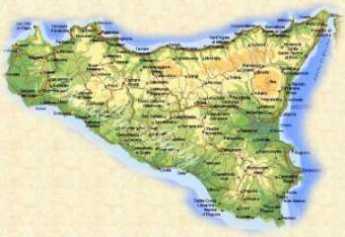
|
| Sicily |
The western tip of Sicily is as mountainous and remote from the heart of Europe as the Hebrides in Scotland. Like the Highland Scots, the western Sicilians ran their own informal government out of sight and out of reach. Even the Church in that region of Sicily had a sense of kinship to Eastern Orthodoxy rather than to Roman hierarchy. The flavor of the local culture can be sampled in Tomasi di Lampedusa's classic novel The Leopard which, among other things, helps explain why so many Italians hated Garibaldi, mostly known to the rest of us as Italy's great unifier. Mussolini was in the same class.
At the time of the great Italian immigration early in the Twentieth century, Italy was in near-chaos. Benito Mussolini presented himself as a welcome strongman who put down crime and disorder, particularly Communist disorder and made the trains run on time. Most of his efforts took place in the urban centers of Italy, paying little attention to rural regions like the far tip of Sicily until rather late in his rule. Meanwhile, western Sicily had its own traditional medieval way of maintaining order. The Mafiosi contained elements of the old feudal nobility, following secret activities similar in ceremony and brutality to the southern American Ku Klux Klan. Most of the inhabitant families had been living in the same villages for centuries, and by intermarriage had become very cohesive. They knew who was who, and who could be trusted. Secrecy, omerta, was their rule, murder a regrettable tradition. In this way, the stable community protected itself against roving brigands, local psychopaths, and thieving government officials. There were competitive bands who needed to be warned against; the "Black Hand" was a notorious group of local extortionists who employed dynamite as their signature. Although murder and mysterious disappearance were common enough, the Mafia had their official secret nobility, and murders were not condoned unless they were authorized by the legitimized but secret nobles. It was this secret competitive government that Mussolini decided to stamp out.
Meanwhile, back in Philadelphia clusters of immigrants from the same immigrant groups formed organizations based along the same lines. Every wave of immigrants from whatever country has always brought a crime wave with them to America, prison records document these immigrant waves, and most of the victims of each crime wave are almost always fellow immigrants. In the case of the Italians, the organizations were already in existence. For a while, the Black Hand terrorized the slums. And then the Mafiosi got themselves together, steadily eliminating trouble makers but only after a certain amount of due process authorizing the rubouts as justified. As has been true of every immigrant wave, the police were not trusted to see that justice was done, and gradually withdrew to let the informal government govern in the neighborhoods. The established American government would certainly not tolerate a rival nation within its borders, but rendering unto Caesar was moderately tolerable. Soldiers were appointed to an ununiformed militia, the victimized immigrants were coerced to contribute to the cost of their own protection, just like taxation in the more open community. The original and most enduring source of revenue for the Mafiosi was the one that was traditional back home in Sicily -- paid protection.
So when this group learned that back home Mussolini was waging war against the Mafia, the ties of loyalty to Italy were readily severed. Fascism, whatever that strange word meant, was a bad thing. Maybe the American government wasn't so bad, even when there was a war against Italy.
Healthcare Reform: Looking Ahead (3)

|
For fifty years, turmoil in the health insurance industry has originated in the steel and auto industries. It seems strange that no heroes have come to general public attention, although there may be heroes who are known to insiders; somebody may yet write a book about it. This may be of only passing importance, but the present distress in the American Big Three automakers suggests that unexpected legislative proposals concerning health financing could emerge from that direction. The turmoil in Detroit once centered on the auto industry enjoying windfall profits which labor wanted to share. More recent discord comes from the opposite direction: the automakers now cannot afford to honor those contracts they signed with labor having to do with health benefits.
The contract for the United Auto Workers was certainly generous. Printed up in a little red book for wide distribution, the contract states emphatically that an employee for six months or more will be completely covered for medical expenses for the rest of his life. If Medicare pays some of the cost, that is fine, but if Medicare reduces its benefits, the employer is liable. Some features of this contract may have been changed since it was printed, but it is difficult to imagine what incentives the UAW would have to agree to modifications. Except, of course, the self-interest which emerges when it looks as though the employer might go out of business unless there is some form of relief from wage costs.
To judge what is going to come of this is to judge the likelihood of the various arguments, predictions, and recriminations that are so common in heated disputes. Two things are pretty clear to auto industry outsiders: the UAW contract provides more generous health benefits than almost any other employee group enjoys, while the auto industry has worse earnings than many or most other industries. Consequently, both the employees and the stockholders have an incentive to make adjustments in the auto industry, a situation shared by the steel industry and other major auto suppliers. The form this has seemed to take is to favor some form of national health insurance, in which the taxpayers would take over the obligations of the auto manufacturers. So, look out for proposals from Senators and Congressmen from Michigan, and watch which nominees for U.S. President are favored by the rust-belt political delegations.
Workers in other industries are not certain to go along with such proposals. After all, most people resent it when someone else makes out better than everyone else for decades, and then comes asking for a hand-out.
New Jersey: A Keg Tapped at Both Ends (2)
 The New Jersey legislature first fought for Independence, then about debts, then railroads and corporations, and now -- about debt, again. 
|
The New Jersey legislature ratified the Declaration of Independence in the Indian King Tavern of Haddonfield, then moved to Princeton and ever since has been in Trenton. The Statehouse in Trenton is the second oldest in the nation, after the one in Annapolis, although it has grown like a snail with the original building nestled inside many additions. In one sense it is totally unique; it's the only state capitol in the nation where you can look out a window and see another state. It's right on the water's edge of Delaware, a hundred yards from those Hessian barracks that Washington surprised in 1777.
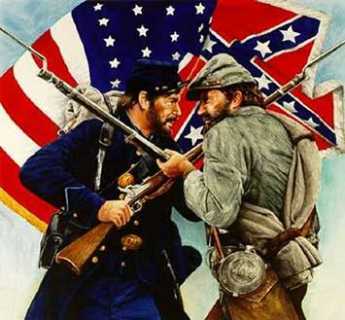
|
| Rivals, North and South |
In its early years the legislature concerned itself with raising troops during the Revolution. After that, it spent a great deal of time settling debts to pay for the Revolution. From that arose the traditional rivalry, even hostility, between the northern and southern halves of the state. To some degree, this reflects the two original provinces of East Jersey (Scottish Quakers) and West Jersey (English Quakers), but the Quaker character persisted much longer in West Jersey. The northern half, with many Dutch settlers spilling over from New York and Congregationalists from Connecticut, evolved into mainly a population of debtors; debtors enjoy inflation because it cheapens the cost of their repayments. The southern half of New Jersey, persistently Quaker in the settlement, was where creditors lived; creditors want to recover the value of the money they risked, so they hate inflation. The Mason Dixon line, extended, would cross southern New Jersey. However, it was the northern half of the state which favored the Confederacy during the Civil War, whereas the Quakers in the south were strongly opposed to slavery. Later on, irritation over permitting Atlantic City gambling was one of the various issues which eventually prompted South Jersey to try to secede from the northern spendthrifts; the secession proposition was actually on the ballot in the late Twentieth Century. Up until 1966 the Republicans always dominated the Senate, but that was because each of the 21 counties had one senator, and you can't gerrymander county lines. Then, it was deviously proposed that the state should be re-divided into 40 numerically equal Senatorial districts (i.e. instead of counties); the Senate has had a Democratic senatorial majority more or less ever since, in spite of numerous Republican majorities in state-wide elections. The legislative districts in the Assembly are reapportioned every ten years to respond to the new census; it is close to the facts that the subsequent gerrymandering of that decennial reapportionment effectively forecloses the politics (and predicts the agenda outcome) within the Assembly for each subsequent decade. In recent years, state Congressional delegations have all become increasingly polarized as a result of partisan gerrymandering. New Jersey leads the way in this unfortunate process: the Assembly and the Congressional delegation are polarized in what has become a national pattern, but in addition, its state Senate is permanently gerrymandered by substituting "districts" for "counties", and redrawing the boundaries in the state constitution.
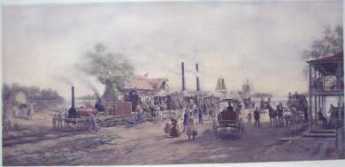
|
| The Amboy and Camden Railroad |
Over time, the early legislature devoted most of its time to chartering corporations, because there were no universal corporation laws and each new corporation required a separate legislative charter. During the early Industrial Revolution, a great many new businesses sought the authority to limit investor liability. Each corporation had its own enabling act and hence its own deal, its own set of rules and conditions open to limiting amendments by competitors or favorable restatement at the urging of lobbyists. Along came the first railway in America, Stevens's conception of the Amboy and Camden Railroad. The New Jersey legislature, no doubt persuaded by private inducements, not only gave the Amboy and Camden permission to use eminent domain to acquire its right of way, but also conferred a perpetual tax exemption, and perpetual railroad monopoly. For the next fifty years, the legislature then concerned itself with hardly anything except railroad matters. As Willie Sutton said about banks, that was where the money was.
Perpetual is a pretty unambiguous adjective, of course, and it might be an interesting topic in judicial gymnastics to observe how the state would get itself out of the impossible economic straight-jacket of conferring a perpetual monopoly on only one railroad. It proved achievable, however, when the proprietors of a new Stanhope Railroad slipped exemptions and enabling legislation for itself into one of the thousands of corporation bills which flooded through the legislature, unread by anyone except the authors. After the Governor who also hadn't read the bill, signed this sleeper into law, the uproar was predictably loud and accusatory. In a sense, the wrangle about New Jersey railroads was not finally settled by the legislature at all but by the Pennsylvania Railroad, which crossed Delaware at Trenton, and went south to Philadelphia along the Pennsylvania side of the river. New Jersey had not only lost the advantage of railroad competition, but it had also essentially lost all of the main North-South railroad traffic made possible by improved bridge construction methods. Almost all rail traffic was East-West, and the Pennsylvania RR soon captured national dominance. Among other things, railroads thus avoided the expensive hidden costs of going before the New Jersey Legislature. New Jersey preferred to seek a new constitution with a new organization of matters, but one thing about New Jersey never seems to change. Between eleven and twelve thousand bills are still introduced every year. Overloading the attention of the legislators creates the main opportunity for corrupt politics in all legislatures, and is the central strategy for its concealment. It's even worse than New Jersey actually passes about 300 laws a year by sitting for a hundred hours in plenary session: the legislature sits for 30 or 40 three-hour sessions in the afternoon each year, usually Monday and Thursday, from November to May. We try to be a nation of laws and not of men, but it would be hard to praise the application of that truism in New Jersey, where quite obviously the Governor does most of the governing, and deciding, and dispensing. Recent Governors have evidently preferred to borrow money rather than pay any attention to balancing a budget, since New Jersey has gone during fifty years from having no income or sales tax to having the highest of them both, and the highest property taxes, plus $50 billion in debt. Let's repeat the central point: the thing which will matter for a decade is how the legislature gerrymanders the voting districts after the 2010 census. The second source of corruption is the severe limitation of individual political contributions, combined with a lack of limits of donations to the County political machine; the machine totally dominates all New Jersey nominations, and by gerrymandering can ignore the general elections. The public has discovered that this process leads to the second-highest state tax rate in the nation, and wealthy people are fleeing to other states in noticeable numbers. Since wealthy people pay a disproportionate share of taxes, the disappearance of this tax source throws a major tax burden onto those with lower incomes. As this process spirals out of control, something about it must change.
Chester: To the Dark Tower
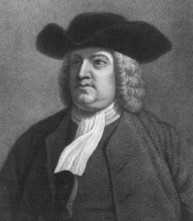
|
| William Penn |
Chester is the original word for Castle in old English, and accounts for towns called Manchester, Lancaster, Dorchester in the Midlands of England. Although much is made of his Welsh ancestry,William Penn grew up and lived in the neighborhood of Manchester. When he first landed in his new colony, he named the place Chester before deciding to move upriver to be above the mudflats and snags at the abrupt turn of the river where we now have an international airport. On several occasions, this protection from pirates and invaders made it possible to remain rich and prosperous without abandoning Quaker pacifist principles. As a further bit of history, the second public reading of the American constitution took place in the courthouse at Chester. During the industrial revolution, Chester became a mighty industrial town somewhat in advance of Philadelphia. The industry has, sadly, abandoned Chester.
Chester repeats the age-old tradition that slums are created when towns are abandoned, making cheap housing available. There's even a particular Chester twist to this principle: the old Sun Shipyards have been turned into a casino. Now, that will create poverty if anything will.
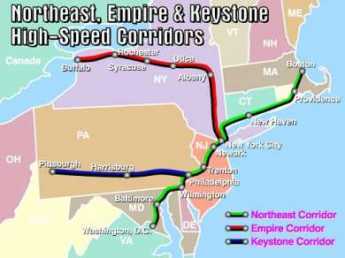
|
| Amtrak's Northeast Corridor |
Peter Barrow is a local real estate man who is determined to lead a revival of the old Chester, and certainly makes a good case for its future. Although much of the city was abandoned, the infrastructure remains. The roads, sewers, water supply, railroads, port facilities may be old but they are essentially intact, making revival much cheaper. Chester is still served by the R2 train from Philadelphia to Wilmington, and is on the main line of Amtak's Northeast Corridor. It's now near the airport, and near the electronics industry developing in Chester County along Route 202. Those things are economic drivers, and they are social ones, too. The old Chester urban Democratic machine and the rural Delaware County Republican machine can no longer afford to remain ossified in perpetual denunciation, in the face of new residents with new outlooks on things. So, there's agitation for reforms and both votes and discontent to propel it forward.
Given a magic wand, the one thing Mr. Barrow would change would be education. The public schools are undisciplined and unsafe, and mobilized by the teachers' unions to resist charter schools no matter what. Things have even gone to the point where Widener University is thinking about starting a charter high school, and the more graduates of charter schools the more momentum builds up for still more charter schools. Hidden in this struggle are two less defensible issues: parochial schools and vocational schools, pro, and con. The struggle over church schools goes back to the founding of our country in the sixteenth century and firmly resists any objectivity about whether parochial schools are better schools, or not. For them, that's not the point. The other tradition at play here is the historic opposition to vocational schools by trade unions. This one might be a little easier to work with since resistance to the development of more plumbers and carpenters was understandable enough during the industrial days of the city, but really is no longer relevant in an era when we now must import illegal immigrants to serve our needs in the mechanical trades.
Chester seems to have a chance to get its act together. Success or failure of this important the struggle could well depend on one or the other of the entrenched political machines, urban and suburban, seeing an opportunity -- and grabbing it.
WWW.Philadelphia-Reflections.com/blog/1322.htm
Social Disintermediation
 A term borrowed from the banking world seems to explain the recent decline of local government, local clubs, and local news sources. 
|
The growing speed of communication, especially the electronic sort, exacts its price. Western civilization spent several centuries building up valuable social structures intended to unite citizen opinion with that of their leaders. A lot of that now seems unnecessary. Most people now know how to read, write, type and press enter. A dozen systems attempt to catch up with Google in the art of telling people what they say they want to know. C-span lets us hear our leaders speak, more or less in person, and then answers our phone call, sometimes.
Quite a change from the days when people knew nothing and knew they knew nothing. Benjamin Franklin formed dozens of little clubs and societies for people of like minds to learn what was going on, and to magnify the force of their collective opinion to influence it. That's essentially why Philadelphia remains a city of clubs, but the diminishing need for such megaphones also goes a long way toward explaining the decline of clubs. The Bar Association has less importance for lawyers, the AMA less for doctors. One consequence that is noticeable is an ascension to power within such declining organizations of minority groups, fringe opinions, and other elements still desperately searching for a voice. The power elites now prefer to aspire to befriend and influencing national power centers directly, and in the process unconsciously augment the importance of centralized power. The upper layers of the government bureaucracy have become infiltrated with educated and high-minded graduates of elite schools, and toward them often go the appeals of former classmates with less plausible motivations. Quite rapidly for a social revolution, people are changing political sides, and the consequence is polarization.
Regardless of laments for the systems and institutions of the past, polarization is dissolving the old glue that binds the nation together, heedless of the new glue of electronics and instant communication with like-minded strangers. It's hard to know what people really believe about the polarizing effect of gerrymandering congressional and legislative districts because it brings people of like opinion together and people generally enjoy that. But professional analysts of the political scene focus on the effect of each ten-year census and claim that the elections of the next decade are easily predictable once you know how the revised census was gerrymandered. Contrast the difference in deportment between the scruffy members of the U.S. Congress with those of the U.S. Senate, where gerrymandering is impossible. The consequence often goes unnoticed, because gerrymandering means that people of the same opinion are more likely to find that everyone they know -- agrees with them. It's not entirely a new phenomenon. When Franklin Roosevelt defeated Alfred Landon in the greatest landslide in our history, many voices were raised that the election must have been fixed because everyone they knew voted for Landon. Something like that misperception affects many who voted in the two elections of George W. Bush, differing in these essentially tied elections only that both sides believe they were cheated. The buffering organizations, the clubs, ethnic groups, and even the political parties either no longer survive, or are dominated by die-hards.
How much of all this is just temporary disorientation, how much is a growing trend predicting the future, is unclear. The harsh and thoughtless oaths and demands which have become so disagreeably common may pass away when people get a grip on themselves, or they may escalate into our normal level of public discourse. Negative campaigning, experts say, is effective. Political campaigns get progressively harsher and dirtier as they approach election day. Money talks, and it talks by buying professional assistance to say what the buyer is ashamed to say. A political party wants to win elections above all else; those who lose elections are quickly hounded into oblivion. And yet, and yet. A slogan or two can still turn this sort of thing around. Just tell a loudmouth that he sounds like a junkyard dog, and see how quickly the listeners quiet down. It's a vicious thing to do, but it works, using vile attacks to silence vile remarks.
To a considerable degree it works because it draws attention to how little substance is to be found in these shouting matches. Someone who heard a major general gives a talk may be emboldened to offer a different opinion on combat strategy, but he still knows how little he knows and retreats at the first sound of answering fire. The person who just listened to the Chairman of the Federal Reserve talking about interest rates may claim to disagree but soon looks a fool if asked to document that opinion. The barroom orator, unrestrained by association with local opinion makers in person, is emboldened to rise to combat with the champions of the opposition. Most of us soon learn not to pick fights with the varsity, and there is at least some small hope that civility will eventually return when a few more noses get bloodied.
You can try soft reasoned analysis if you wish, but at the moment it isn't very popular.
Port of Philadelphia

|
| Ports of Philadelphia |
When federal appropriations are doled out, it is a great advantage for the Port of Philadelphia to appeal to six U.S. Senators. However, the overlapping control of port operations can come close to paralysis. In short, we may have less chance of agreement on what we want -- but a greater chance of getting it. Right now, the ports of the world are struggling to adjust to revolutions of containerized cargo and gigantic oil tankers, plus political pressure from concern about the environment.
Some of the main arenas of our gladiator fights are as follows:
DRPA: The Delaware River Port Authority operates several large bridges, the PATCO high-speed subway line, and the cruise terminal, all leading to control of potentially large sources of revenue. The 1992 Congress expanded its charter to include the economic development of the port region.
SJPC: The South Jersey Port Corporation owns two marine terminals in Camden, and is planning a third in Paulsboro.
DSPC: The Delaware State Port Corporation operates the Port of Wilmington, DE.
PRPA: The Philadelphia Regional Port Authority has little to do with city politics, but is an arm of the state government of Pennsylvania, operating 7 marine cargo facilities, and planning more.
In addition, every county, city, and town along the riverbank has some degree of authority. Every business and union involved in regional or international trade is desperate to protect its interest in the politics of port regulation. Lately, the Homeland Security Agency has taken a large role. Scientists, engineers, fishermen, oil refinery operators, economists, and others abound. The news media convey their own opinions and the opinions of others. Opinions abound because most issues about ports are important.
In addition to the traditional cargoes of coal, petroleum, iron ore and forest products, which are mostly declining in importance, the rising cargoes include meat, cocoa beans, and South American fruit. General, or casual, cargo tends to be more valuable than bulk cargo, but greatly complicates the Homeland Security risks. The ratio of imports to exports is important because it is expensive to have a ship return empty. Shippers will, therefore, favor a port where there are expectations of return cargo. Oil tankers are particularly likely to return empty since their ballast is mostly river water; but, who knows, perhaps global warming will make dirty river water seem valuable to some tropical oil producer. A quirky problem is that most of the crude oil entering East Coast ports are currently coming from Nigeria, a notoriously corrupt nation. This has led to a thriving business of car-jacking in the Philadelphia suburbs, with the stolen cars promptly packed in empty containers returning to Africa.
Of the 360 major American ports, the Delaware River ranks second in total tonnage shipped, and eighth in the dollar value of the cargo. Every year, 2600 ships call into our port, which claims to employ 75,000 people. According to Bill McLaughlin of the PRPA, the future of the port will depend on the settlement of three major disputes:
1. Deepening the Channel. The historical natural level of the river is 17 feet, artificially deepened to 40 feet up to the level of the Walt Whitman Bridge. It sludges up by two or three feet every few years, so dredging is a continuous issue. The enlargement of tankers and container ships has led to a need to deepen the channel to 45 feet. It is true that the Wissahickon schist pokes up at Marcus Hook and will have to be blasted out, but mainly the issue is dredging up the gunk on the river bottom, and hauling it away somewhere. In Delaware Bay below Pea Patch Island, the bottom is sandy and hence valuable. The State of Delaware has plans for riverfront development, and would actually like to have the 8 million tons of sand, so no problem. The 7 million tons of clay and silt which must be dredged out of the upper Delaware River channel for a 45-foot depth is more of a problem, but users can be found for most of it. Or so the Pennsylvania representatives maintain; the New Jersey representatives led by Congressman Rob Andrews say it would be an environmental disaster to dump a thimbleful on New Jersey. Feelings get pretty hot in these things. The Haddonfield representative is portrayed as selling out his district in order to further his own state-wide aspirations, acting on the orders of North Jersey politicians who dominate New Jersey politics, who want to lessen competition with the Port of New York, which also shares a border with New Jersey. Feelings are not soothed to see the Port of New York deepening its channel to fifty feet while resisting forty-five in the Delaware port.
The document currently at the center of this interstate dispute is called PCA, the Project Cooperation Agreement. New Jersey won't agree to sign the proposal, which contains clauses to remove the DRPA from authority and replace it with PRPA(essentially transferring control and revenues from Philadelphia to the State of Pennsylvania) as the "non-federal sponsor". PRPA would then enter into a contract with the Army Corps of Engineers to get the work done.The price, probably low-balled, is $219 million, to be compared with the Port of New York's dredging price (probably high-balled) of $50 billion. There are, of course, a great many features of this political negotiation which are unlikely to appear in print.
2. Southport. The grand plan for the Philadelphia Port is to center on an intermodal complex of piers, railroads, and highways which would extend as a continuous terminal from the Walt Whitman Bridge to the old Naval Yard. No doubt this idea is linked to the round-the-world concept of Philadelphia as a way station from India to Vancouver, overcoming the empty return cargo problem by never looking back. Good luck.
3. Monetizing the Port. Like the turnpikes, ports could be sold to private investors. Of course, that could extend to selling the property to foreign investors, triggering the nationalist reaction readily observed when port management was once offered to Abu Dahbi. It could well give a new meaning to the expression, being sold down the river, but who knows maybe it's a good idea. When you criticize motives it never bothers real political pros, because it's simple to say you don't have such motives, and who knows. But the people seriously involved in government finances say they most fear that the do-gooders will be allowed to sell or lease publicly-owned facilities to improve the financial balance sheet. And then the pros will just take the money and use it to pay interest on more borrowing.
WWW.Philadelphia-Reflections.com/blog/1337.htm
Detroit Makes, Philadelphia Takes

|
| Junk Yard |
Let's look at the economics of a junkyard in a business-school way. Derelict auto bodies worth $80 a ton at current prices can be profitably converted into $235 worth of scrap metal, provided the cost of doing so can be kept below $155 a ton. The Camden Iron and Metal company are able to do so for $115 in expenses, and so reaps a profit of $40 a ton. That's not to mention the relief the owner of a useless car feels when the derelict hulk is taken off his hands, or the relief the City feels in ridding itself of thousands of vehicles abandoned in various alleys and public places. Or the worth to the steel mills of being able to produce new metal at a reduced price compared with starting with iron ore and limestone. Or the benefit to our balance of trade from being able to export the motor blocks and transmissions salvaged intact from the wrecks, leading to foreign motor cars of a quality that may, or may not, withstand impartial examination..
Camden Iron and Metal, Inc. is crawling with engineers who help cope with the currently dwindling steel content of contemporary autos, and the consequent increase in non-ferrous metals, glass, plastic and whatever. The most profitable component of the salvage company thus lies in a subsidiary, Innovative Recycling Products, Inc. The copper content of scrap used to be a headache, but is now a revenue center, for example. There once was a time when scrap iron was chopped up and buried in landfills. Nowadays, people are getting rich digging up such landfills and mining the scrap metal. There are other problems you probably wouldn't imagine, such as the disagreeable discovery that lots of those crushed auto bodies have dead dogs locked in their trunks.
It's big business, where a single crane, of which this company has a great many, costs $1 million, and the grinding mills and purifiers cost much more, last only a year, and must be maintained or replaced. There is an increasing plastic content in cars, so that stuff is ground up, pulverized, and burned to produce energy to run the shredding operation. Trucks bringing in a scrap for processing typically run all night on the highways, which reduces the public profile of the salvage operation but increases its 24-hour efficiency. When metal is torn apart, internal friction creates 2000 degree heat, cooled by water, producing huge clouds of steam. The closing of the Bessemer Steel Works reduced the local market for scrap steel, prompting more exports of scrap, and stimulating more search for ways to salvage other ingredients of the scrap. Increasingly, the purification of the raw material has thrust the scrap processors into the role of a pre-processing step in the steel industry. Just as slaughterhouses used to boast of using all of the pig except the squeal, hardly anything is now left of the bodies of discarded autos except for the unattractive scrap heap. Hey, if every housewife admires the idea of household recycling, maybe they can grow to love auto body recyclers.
And then, friends, this is Philadelphia so politics enters in. It has come in the form of visits from the Governor who wants the shredder to move to the waterfront, but who also has a struggle with New Jersey over dredging the river channel to balance in his mind. So, sometimes expensive relocation proposals are made, partially implemented, and then suddenly abandoned for reasons best known in Harrisburg and Trenton. It's conjectured that a central issue in this scrap iron struggle is the high price charged for electric power by New Jersey utility monopolies, tending to drive the scrap salvagers over to Pennsylvania. Since macing utilities is a central feature of modern urban political financing, it's equally possible that Pennsylvania power is produced at a subsidized loss in this struggle, or that New Jersey is concealing its tax burden within electric bills. One would have to know more facts to form an informed judgment, in a situation where facts are hard to come by.
Unwritten Constitution
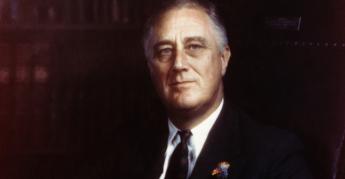
|
| Franklin Roosevelt |
After Franklin Roosevelt was elected to the Presidency four times, the 80th Congress reacted by proposing what is now the Twenty-second Amendment of the Constitution, that two terms are all that will be permitted in the future. The supporters of Roosevelt have continued to argue that the Amendment was a mean-spirited insult to a man who was no longer able to defend himself. In their view, the Amendment implies that Roosevelt wished to be a dictator, in the pattern of most dictators from Julius Caesar or even earlier. That would seem an unfairness to a man who apparently had sufficient popularity to be re-elected for as many decades as he lived. Dictators, by contrast, characteristically have a succession problem leading them to believe realistically a bloodbath might ensue in the aftermath of relaxation of iron rule during a transition. That is indeed the usual case; if there were nothing more to it, this Amendment would not have much justification. That is not all there is to it.
It might well be said that George Washington started an unwritten rule by voluntarily stepping down after two terms since he too could have been re-elected as many times as he pleased. Furthermore, political parties as we know them had not then been invented, so he could not have been motivated by the reasons I now wish to explore. He apparently just felt in his bones that a limited period was best, and the nation came to agree with his opinion. Ulysses Grant and Theodore Roosevelt both seem to have toyed with the idea of longer presidency but retreated in the face of public hostility. Just why the public felt that way is not clear; much was said about Washington's wise words, but that seems unconvincing.
-->As the country has grown in size, the man we elect to leadership is mainly elected for symbolizing the attitudes of the network of acquaintances he brings along to power. What we know as political parties only partly represent that power network. It is composed of those who seek an agenda that is not currently being addressed, plus those who oppose the agenda that is being pursued. When the combined numbers become a majority, the incumbents are replaced, and the cycle then goes on to repeat itself indefinitely. In that sense, the terms of office state a minimum. It is disruptive to replace governance too soon and too often. The Constitution is silent on the other side of it, of how long is too long, probably because there were no useful models to follow in this first democracy of modern times. We have to surmise that Washington reflected on this question for a period of time before he announced his answer with his own example. Eight years is long enough.
Washington surely had ample opportunity to observe the gradual assumption of power by the network of people who actually carried out public policy, to the point where they bitterly resist the loss of their power which is inevitably the consequence of losing their leader. He may have lost his taste for glory but they have not. Indeed, when you can see signs of their rebellion, you know it is time for the whole lot, to go. It is really pretty hard to see the frail, sick, disabled Roosevelt hungering for more power; it was his cronies who did. That he could be persuaded to make the effort is as good as a sign as you can find, that it was well past time for him to retire.
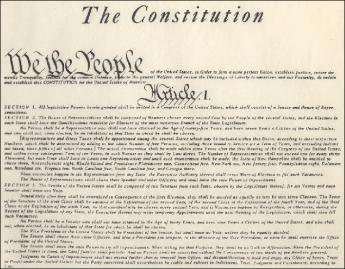
|
| Article Constitution |
We live in an age of aphorisms, called bites of sound. The argument might well be reduced to saying that since power corrupts, there does come a time to throw the rascals out. When the new reforming heroes take over, power will similarly corrupt them in time, so we must throw them out, in turn. It's a system we sort of eased our way into, and after a while, we came to feel that eight years is about long enough to get your reforms reformed, not quite long enough for corruption to become entrenched. And after two hundred years, we finally got around to making it official. Instead of talking about plumbing inspectors taking bribes, or lobbyists paying for Vicuna coats, or drunken congressmen cavorting in fountains with women of light repute, let's go right to the central figure in the controversy, the man who was indispensable even when he was uremic. The example has to do with patent protection, deemed important enough to write into the third Article of the Constitution, even though term limits were left vague.
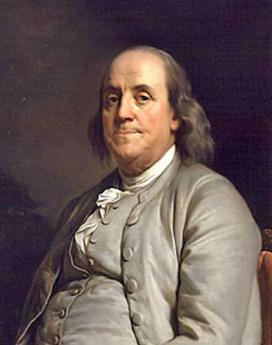
|
| Benjamin Franklin |
Franklin Roosevelt hated monopoly, as do most of the rest of us. He carried this antipathy to the point of opposition to all patent protection for inventions, which Benjamin Franklin felt promoted innovation, but which FDR saw as creating a monopoly. Both tradition and the Third Article stood in the way of his doing much about it, at least overtly. However, he did control the appointment of federal judges, who controlled the enforcement of patents. We are told that all judicial nominees were interviewed privately on their views about patents, and one by one the judiciary was filled with patent-hating judges. Roosevelt, as mentioned, was elected four times, and it reached the point where it was effectively impossible to enforce any patent. The Eighth Judicial Circuit in Minneapolis did not sustain a single patent until 1969 since Roosevelt appointees continued on the bench long after new presidents, even new political parties, had come and gone. Regardless of how we may feel about trial lawyers and Bleak House lawyers, and litigation -- and even ridiculous assertions of patent protection for the human genome or patents for business methods -- the state of patent protection is most readily demonstrated by the number of patent lawyers. In 1950, there were only ten patent lawyers in Philadelphia, 4000 in the whole country. In 2007, there are four thousand patent lawyers in Philadelphia and over a million nationwide. Whether the instinct is to see this as a good thing or a bad thing, it is certainly proof that the Constitutionally protected right of patent protection was snuffed out by a process entirely contrary to Constitutional intent. And that process, whether saintly or utterly corrupt, was only made possible by flouting the traditional limitation on terms of office.
Commercial Academic Think Tank
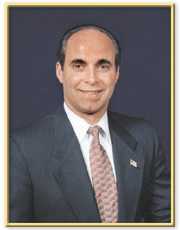
|
| Stephen P. Mullin |
Stephen P. Mullin recently addressed the Right Angle Club of Philadelphia about assorted economic subjects; he is certainly qualified. He was once the only Republican in Mayor Rendell's cabinet, acting first as Finance Director and then as Commerce Director. At first, he doesn't appear extroverted enough to be a politician but quickly demonstrated that he knew the first names of more of the members of the club than the president did, so maybe he does have the innate talents of a politician. Urban political machines don't usually respond cordially to graduates of Exeter and the Wharton School of the University of Pennsylvania. A number of University professors are consultants to the firm, which offers statistical economic advice to the many law firms in town, to philanthropic organizations considering public-interest projects in the region, to government agencies faced with regulating unfamiliar activities, and very likely to anyone else willing to pay for the service of academics, statisticians and analysts. It certainly sounds like a service that governments and philanthropies need, and which the region needs to avail itself of. In a way, it is probably something the University needs, as well. A friend of mine is now retired, but at one time I commuted on the train with an academic administrator of the Wharton School, who was quite obviously disturbed by handing diplomas to students who promptly took jobs which paid those graduates more than he was paid himself. Obviously, such a system cannot persist very long without creating a brain drain, so income supplementation by commercial consulting is a necessary and valuable support for academics. There are, of course, probably some negative features as well.
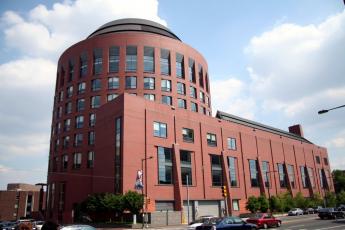
|
| The Wharton School |
It is interesting to hear from Steve how Philadelphia can be variously described. We have, for example, significantly less foreign immigration than other cities. New York, by contrast, has net immigration of about 700,000 persons a year; such forces can quickly transform a city in a variety of ways. The bombing of West Philadelphia during the Goode Administration was news for a while, then vanished from the papers. But it had a shattering effect on Philadelphia commerce, leading to a period of 8 or 9 years when there was essentially no private investment in the city. Philadelphia indeed now needs to have its municipal bonds issued by the state bonding authority, because our own bond rating is so low the extra cost of municipal debt is a significant one. And there is the cost of invisible shifting of power to Harrisburg. An unexpected result is that sales and real estate transfer taxes escalated to make up for property taxes which they could not possibly be raised as much as inflation. Real estate was in big trouble; whether ingenious strategies like the 10-year tax abatement for a new property will be successful in rescuing the real estate industry, remains to be seen. New office towers have been built, but they drain off tenants from older office buildings. We're seeing a massive conversion of older office space into residential apartments, an apparently successful maneuver. But that drains the older residential areas, which leads to -- well, who knows what it will lead to, but it could be slums.
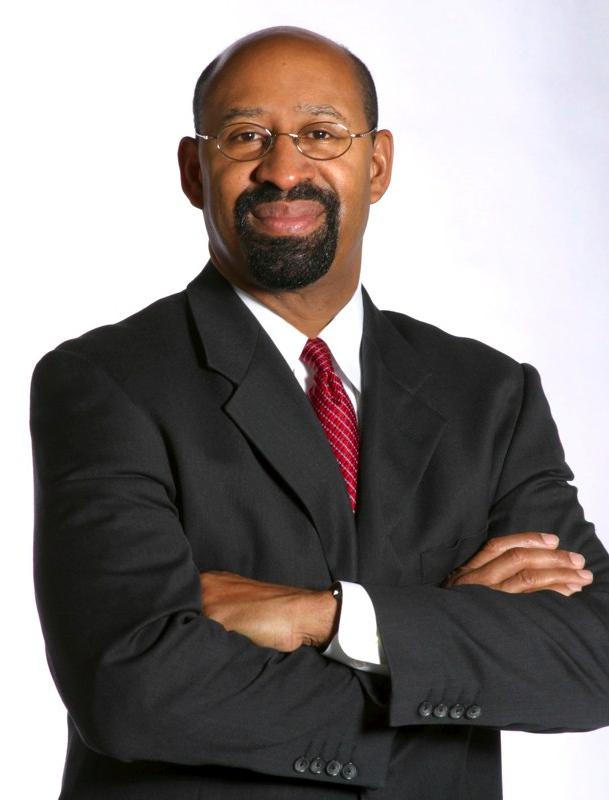
|
| Mayor Michael Nutter |
The traditional hostilities between Philadelphia and its neighbors can be defined in a new way, too. For a century, Philadelphia contributed more tax money to the rest of the state than it received in state services. But in the past 20 years, Philadelphia city has become a net importer of an annual billion dollars -- from the rest of the state. Two or three billion go to the schools, which the rest of the state regards as a deplorable waste in view of the quality of the product. And yet, the most hopeful feature of the situation is the vigor and ingenuity of the attempts being made to rescue the situation. In a certain sense, Mayor Nutter is the candidate of the Wharton School. He may well have some innovative ideas, and academic places like the Wharton School will surely suggest others. It remains to be seen whether Nutter can combine idealism with sufficient ruthlessness to make the city function. Cynical oldtimers will grumble that a mayor has to employ a moderate amount of deception and corruption in order to accomplish his mission. Maybe that overstates things, but it is very certain he must be tough. He's dealing with construction unions who will certainly be tough, and whose interest in sacrificing their own agendas in order to help the schools or street crime -- always fairly small -- is even further impaired by the econometrics that 70% of them live in the suburbs. We wish our new mayor all the best, since he seems smart enough to know what needs to be done, and is definitely smart enough not to drop any bombs on houses. He's smart enough to see that extra city revenue derived from gambling might permit the lowering of wage taxes, and hence an urban business recovery. But is he tenacious enough to stay in office long enough to achieve the balanced result; or will the forces of evil simply kick him out of office before wage taxes can be lowered and gambling discontinued? He won't break his promises, but will they break them for him? Beyond being competent, a city mayor needs to be tougher than the convivial but very mean friends he needs to associate with. He must, for example, decline to run for national office, the traditional way that city machines rid themselves of pointy-headed reformers.
War Dance
History Footnote: Before the white man came, the Iroquois "nation"devised rules still characteristic of our modern political parties. At various times, there were five, six, or seven tribes in the Iroquois confederacy headquartered in upstate New York, allied to each other with fluctuating loyalty. Philadelphia's tribe were Delawares or Leni Lenape, but the most warlike and dominant tribe were the Mohawks. Confederations work best when allied against a common foe. The rest of the time, member tribes mostly beat and cheat each other.
The Philadelphia Democratic Party appeals to a number of minority groups and recent immigrants, but it is more meaningful to think in terms of players. For example, university professors are mostly Democrats, but the teachers union is an active political player. Minorities generally vote Democratic, but the Black Ministers are players. Lawyers are rather evenly divided between Republicans and Democrats, but Plaintiff Trial Lawyers, the ones who sue people for a share of the award, are players.
Some people are players but keep it quiet. Certain rich donors are players but don't want to be known as such. The chiropractors and optometrists claim to be players but would rather not have the truth known. The news media and utility companies come close to denying they are players in spite of abundant evidence otherwise.
Well, the local players had a war dance just before the November 2005 elections; the timing was no accident, and it was publicly described as a SEPTA contract negotiation. The issues had mostly been settled in advance, but the real deal-breaker was health benefits, Blue Cross health insurance paid by the employer to escape income tax and to make the pay packet appear smaller to the taxpayers. Step by step for twenty-five years, employers in the form of the Republican politicians had been keeping up a steady drumbeat, trying to reduce the incentive to overspend health insurance because it seemed free, with resulting increase in employer costs. Slowly, business management convinced a majority of the public that "first-dollar coverage" was a villain, since the person covered by the insurance has no skin in the game. Even party loyalists had to admit that it looked as though the tax exemption of health insurance was injuring the image of labor. That concept carried the slogan of "sending jobs to China", or killing the goose that lays golden eggs in the Rust Belt. Five million Health Savings Accounts were sold in 2005 in spite of state laws hampering this form of health insurance, and from experience it seemed certain that five times that many would be sold if early-adopters reported satisfaction. The surrogate was deductibles and employee contribution to health insurance; just about everybody recognizes the need to make some token contribution to health insurance in order to have skin in the game and keep costs down. But not the SEPTA workers. In 2005, the brotherhood of Septa workers would go on strike for fifty days rather than pay one penny of "give-back" for health insurance. Their energy level was high, they were waving their arms, they were ready to overturn ashcans.
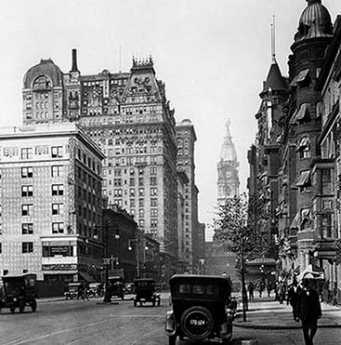
|
| Bellevue |
When union contract negotiations go on for days, all day, the public gets an idea the negotiating table is a shouting match the whole time, with "negotiators" carrying on with tom-toms and tomahawks in an even more physical and extreme model for their supporters on the street corners. For about ten minutes a day, that's true. But then the television people can turn off their lights and the war hawks fan out to talk with their supporters outside the room, which in this case happened to be in the Bellevue Stratford Hotel. Perhaps you didn't know the Pennsylvania Governor has quite a nice set of offices there. Perhaps you haven't noticed that all the parking spaces on the side alleys near the Bellevue "belong" to various politicians. Just try parking there yourself to learn a few facts of Philadelphia life.
In negotiating classes, they teach you never to make the first concession. By that reasoning, no negotiation would ever end. The more practical advice is to forget about any serious bargains until the last day of the contract, or even a couple of days after that. The hard reality is that no one will make a concession while there is time for some invisible player to back out; no one wants to give his constituents time to realize he has sold out their trust or violated their loud, insistent, wholly unrealistic demands. And so in 2005, after the shouting had gone on for some time, and even a real strike began, the Governor finally sauntered into his nice Philadelphia office. Time to get to work.
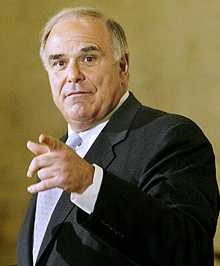
|
| Ed Rendell |
Those who didn't know him made the comment they could almost believe he was a victim of Attention Deficit Disorder. He talked all the time, moved all the time, and apparently showered all the time. That is, he was in and out of sight all night, but invariably reappeared with fresh shirts, clean shaves, and sharp creases. His aides confided he wasn't very good at "detail work", which is to say he conducted the whole affair on a primeval level of dominance, bluster, charm and implied threat. Don't bother me with facts. Mayor Street, on the other hand, would come in and mumble something incoherent, and then had to leave for an important engagement. Word came in that the school teachers felt they really had to pay a small health insurance deductible, and it wasn't so bad. Foo, no guts.
Somewhere along the line, the newspapers started to echo that deductibles had their merits. Foo, bunch of Communists. The black ministers were reported to feel that if their people all had to pay deductibles, why couldn't the transit workers. Bah, bunch of muddleheads. In the hubbub, someone asked what Andy Stern thought. The trial lawyers didn't have as much to say as they once did; SEPTA had reduced liability costs by $87 million through adamantly refusing to settle any case without going to court. Paper tigers. What about chiropractic benefits, we demand the inclusion of chiropractic benefits. No, said SEPTA, we aren't going to agree to any of that sort of thing. Well, what about twenty visits a year to chiropractors?
One by one, the other players deserted the SEPTA workers. The message from the other tribes in the confederation seemed to be, get what you can for SEPTA, but stop the strike by election day. The Governor produced the razzle-dazzle, a loan to the city to pre-pay the Blue Cross premium, in return for which Blue Cross would reduce the premium. The effect of that was to produce enough cash to appear to add ten cents an hour to the pay packet. We'll have to wait a year to see how this money gets restored to Blue Cross, but that's the general idea.
The strike was over, hurray. The next day, the Democrat party elected Democratic governors in New Jersey and Virginia, defeated some California amendments which would have hurt the trial lawyers and teachers unions. Surely, someone in the Democrat party nationally was telling himself that caving on the Philadelphia transit strike was a small price to pay for that.
A Pennsylvania Farmer in Delaware
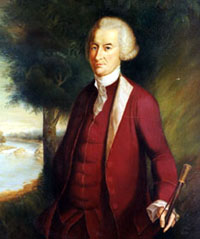
|
| John Dickinson |
It is difficult to have a coherent view of the mind of John Dickinson. Seriously offended by the Townshend Acts, he rightly perceived them to be the work of a few malignant personalities in British high places who would mostly soon be replaced. Later on, he refused to be troubled by the inconsequential Tea Act, which he appraised as a face-saving gesture of reconciliation, but more recent historical information demonstrates was more likely aimed at avoiding an unrelated vote of no-confidence in Parliament. Unfortunately, Dickinson was too remote from these events and additionally could not comprehend reckless hotheads among his own neighbors. Reckless hotheads in turn seldom comprehend the measured meekness of Quakers. In any event, although Dickinson played a major role in the Declaration of Independence, he refused to sign it when the time came, evidently sensing an opportunity to separate the three lower counties from Pennsylvania and its Proprietors. A few months later when the British actually invaded the new State of Delaware on the way to capturing Philadelphia by way of Chesapeake Bay, Dickinson enlisted as a common soldier and fought at the Battle of Brandywine. Obviously, he was seriously conflicted.

|
| John Dickinson's Farmhouse |
Dickinson had become internationally famous for twelve letters he had meant to publish anonymously. The Letters From a Pennsylvania Farmer were written about 1768 out of resistance to the Townshend Acts. Because the three counties which were to become the State of Delaware were then still part of Pennsylvania, many school children have become understandably confused about the actual location of the man who became governor of both states, simultaneously.
The causes of the separation of the two colonies are still a little vague. Delaware schoolchildren are taught the two states separated, but often report they didn't retain much information about why it happened. The Dutch and Swedes who originally settled southern Delaware were not sympathetic with Quaker rule, which could be seen as a reaction to their living here for generations as Dutchmen before William Penn arrived, but then saw the colony sold out from under them. As a further conjecture, there might have been friction with the Quakers over slavery, similar to the hostility of other Dutch settlers in northern New Jersey when William Penn purchased that area. This pro-slavery attitude resurfaced in both areas during the Civil War. One alternative theory which has considerable currency in Delaware is local dissension about Quaker pacifism during the Revolutionary War. On a recent visit to Dickinson's home outside Dover, a school teacher was overheard to instruct his flock that the Dutch Delawarians wanted to fight the British King, but the Quakers wouldn't give them guns. "We value peace above our own safety," was the unsatisfying response they received from the Pennsylvania Assembly. But that line of reasoning bumps up against Dickinson's role in local affairs, his ambiguity over the Declaration, and his vacillation in warfare. One would suppose the simultaneous Governor of both states would play a major role in the separation of the two.

|
| over Air Force Base |
Dickinson's plantation, quite elaborately restored and displayed, is tucked behind the Dover Air Force Base. Perhaps all that aircraft noise will discourage sub-development in the area of Dickinson's plantation and the rural atmosphere may persist for years. At the time of the Cuban missile crisis, your correspondent happened to be driving past, observing the sky filled with bombers, just circling and circling until the diplomats settled matters. Since eight-engine bombers are seldom seen around Dover, it has always been my presumption that they came from elsewhere to be refueled at Dover; but that's just a presumption. One of the pilots later told me he was carrying nuclear "eggs" and was completely prepared to take a long trip to deliver them.
To get back to Dickinson's wavering about the Declaration, maybe there was a good reason to waver. Joseph J. Ellis (in His Excellency, George Washington) relates that after the devastating British defeat at the Battle of Saratoga, Lord North made an offer to settle the war on American terms. In a proposal patterned after the concepts of the separatists in Ireland, America could have its own parliament as long as it maintained trade relationships with England. As an opening offer, that comes pretty close to what the colonists had been demanding. Governor Morris was active in disdaining this offer, although it is unclear whether he was acting alone or as the agent of others. The offer came too late to be accepted, but it might have shortened the war by six years, and we might now have a picture of the Queen on our postage stamps.
REFERENCES
| His Excellency: George Washington: Joseph J. Ellis: ISBN-13: 978-1400032532 | Amazon |
| Letters From A Farmer In Pennsylvania To The Inhabitants Of The British Colonies (1903): John Dickinson: ISBN-13: 978-1163969533 | Amazon |
SCUBA Tours of the Andrea Doria
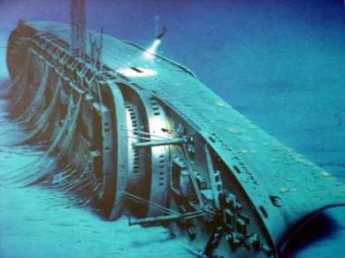
|
| The Andrea Doria Wreck |
Robert J. Burns, who runs clinical trials of medical instruments at Boston Scientific, on July 25,2008 told the Right Angle Club about what he does on weekends. It seems to amount to coming within an inch of getting killed, scuba diving. His favorite place to visit is the sunken wreck of the Andrea Doria, lying on its side in 250 feet of water, forty-five miles from Block Island in international waters. Built in 1951 in grand style, the Andrea Doria was the pride of the Italian ocean fleet, with 190 First Class passengers, 267 Cabin Class, and 677 Tourist Class. There were about 600 crew members aboard. Two of the passengers on July 25, 1956, were Mayor Richardson Dilworth of Philadelphia and his wife, so when it sank, the Andrea Doria dominated the news. After it was all unscrambled later, it seems the radar of the liner Stockholm had incorrect markings and misled the helmsman into thinking distances were five times greater than they actually were. On a day of dense fog, the Stockholm knew the Andrea Doria was near, but greatly underestimated how near. When the Stockholm suddenly found the Andrea Doria looming up, the helm was sharply turned in both ships, causing the prow of the Stockholm to gouge out most of the side of the Doria, which soon sank. That would ultimately mean the Stockholm was mainly at fault, but the Italian liner's image was as damaged as its hull by having the crew commandeer the lifeboats for themselves and essentially abandon the passengers. The rescuing ship was the Ile de France, who told the newspapers that at first, they thought they were rescuing an all-male ship. It's not completely certain how many people were killed in the collision; between 47 and 52 individuals were missing. A matter of great interest to the news media was the story of an 11-year old girl on the Andrea Doria, who was scooped out of her cabin by the prow of the Stockholm and eventually located safe and sound in the bow of the Swedish ship.
Because of German submarine activity in World War II, the Atlantic coast is littered with sunken ships from Boston to North Carolina. Most of them attract great schools of fish and scuba divers, but the Andrea Doria is a favorite because of all the souvenirs to be found on it. Three classes of dining rooms provide tons of monogrammed dishes and tableware, greatly in demand for the trophy cabinets of avid scuba enthusiasts. Just about the first salvage hunter was Peter Gimbel of the department store family, who cut a hole in the first class area and liberated the safe which might be presumed to be full of jewels. As it turned out, it only held some well-soaked Italian currency.
Scuba diving at a depth of 250 feet requires a certificate, and $7000 worth of training for five years is required just to be eligible to risk your life. Even so, plenty of people have lost their lives playing this game, whose central thrill seems to be that you have to get dozens of maneuvers right, every single time, or you've had it. The Martini effect is probably a big part of it, too. Every fifty feet of depth gives a degree of narcosis equal to drinking one Martini, so a diver to the Andrea Doria operates as if he had drunk five Martinis. Under those circumstances, judgment gets clouded but every single knob on every single hose has to be adjusted every so many minutes, adding and subtracting oxygen, substituting helium for nitrogen, and modifying the pressure and flow rates. Then, because it's dark down there, you have to remember to turn left after ten feet, then right after twenty feet, and reverse it all when you come back out with your monogrammed dish. Deep sea diving with a hard hat is safer and more comfortable because you are attached to a hose and have a handler upon the surface keeping track of things for you. But hoses would get cut by the jagged edges of the interior of the hulk, and all in all, diving with a hard hat just isn't what real men do. The hard hat may offer some protection against the myriads of sharks to be encountered, but that's only if the shark prefers to attack your head. If you are using a lot of helium in your breathing mixture, you tend to get very cold, and the preferred answer is to wear a suit inflated with Argon. If that gets punctured by sharks or one thing or another, the discomfort can be memorable. It's cold, it's dangerous, it's dark, it's lonesome, but think of all those dishes you can collect. And maybe the five Martinis are part of the attraction, too.
www.Philadelphia-Reflections.com/blog/1499.htm
Vote Counting, Past and Future
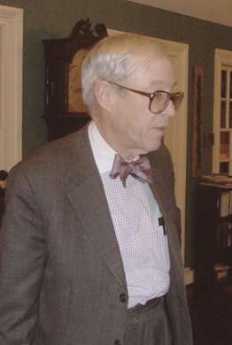
|
| Greg Harvey |
The Right Angle Club was recently fascinated to hear Greg Harvey, a Montgomery McCracken expert on election laws, discuss the snarled Florida situation in the 2000 Presidential race, and the prospects for similar problems in upcoming elections. With the aid of retrospect, candidate Al Gore deserves much of the blame for his own loss, and the U.S. Supreme Court does seem to have terminated the uproar without affecting the final result.
A consortium of major newspapers funded an extensive investigation of the Florida election and were forced to agree that George W. Bush would probably have won that election no matter what. The central issue in these contests is the 35-day time limit to contesting elections. It is true that right or wrong, the country needs to settle its elections promptly and get on with its business. Furthermore, if a national election is so close that it takes months to decide the winner, there can't be a great deal of difference between the candidates, so who cares.
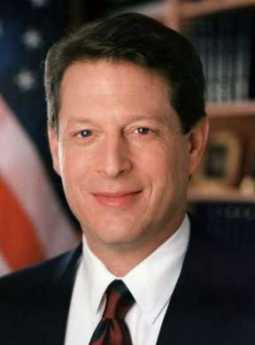
|
| Al Gore |
Looking back at the 2000 election with the leisure of time and appreciable resources, it is possible to see that Al Gore might have won that election if he had made several lucky choices in contesting its result. But it seems highly unlikely that anyone in his position would have been able to identify the winning combination of choices -- within the 35 day time allowed for pursuing them. He had to guess that ballots with two candidates marked ("over balloting") would pick up more Gore votes than ballots without an indicated choice ("under balloting"); he guessed wrong. He had to decide whether challenging late ballots from absentee military was worth the unpopularity of pursuing such a technicality to the disadvantage of soldiers serving overseas. His ticket-mate Joe Lieberman urged him to avoid that touchy issue which did prove to cost him some votes he needed. The decision was one to be proud of but is the main reason why his party faithfuls later turned rather viciously against Lieberman. A second wrong guess was to fail to go after the software mixup on invalidating the ballots of convicted felons. He might have picked up a couple of thousand votes, but only if willing to have the world learn that convicted felons are overwhelmingly pro-Democratic voters. The one decision he made that makes him look rather sappy to professional pols was to challenge ballots in the districts where he was already very popular.

|
| Vote |
Vote counters and poll watchers tend to be strong political partisans, usually drawn from the local district. When votes are ambiguous, these people lean in the direction of their party. Therefore, most party insiders would know immediately; if you challenge districts, challenge the districts which favor your opponent. Choices like this do have to be made. The thirty-five-day rule makes a challenger run out of enough time to look elsewhere if early guesses prove wrong. So, although it is possible in retrospect to construct for Gore a winning strategy for selective challenges, the newspaper consortium and the Supreme Court which pondered the choices before him rightly concluded he was destined to lose.

|
| HAVA |
Some of these lessons are enduring ones, but future elections face unexplored difficulties. A new election law (the Help America Vote Act, or "HAVA") sought to reform the election system by prohibiting the use of punch card ballots, requiring states to use auditable vote records and provisional ballots in doubtful cases, stricter voter identification methods, and statewide voter registration databases. In response to these record requirements, many states opted for complicated data in code, sequence-scrambled to prevent individual identification. In the event of a challenge, however, deciphering these records will be time-consuming, and the potential is created for the candidate who is initially ahead to stretch out the process until the challenge effort collapses at the 35-day time limit.
Several states, including Ohio, are thought to have the potential for very close 2008 results. In that particular state there are some complicated rules about voting in the "wrong" district, that is, to be registered in one district, but attempting to vote in another. It would not seem difficult to do a little of this on purpose, either as a voter, or an election registrar. It seems unlikely that very much challenge among the three possible culprits could be accomplished within thirty-five days of a contested election. So the challenger in Ohio would be faced with the same sort of impossible snap decisions that faced poor old Al Gore, surrounded by excited partisans shouting at the top of their voices.
So perhaps Greg Harvey's law school classmate Appellate Judge Richard Posner has a sustainable position on this. It was his judgment that the 2000 election was essentially a tie. Letting the Supreme Court decide it wasn't the worst possible choice.
www.Philadelphia-Reflections.com/blog/1515.htm
Merging Cities With Their Suburbs
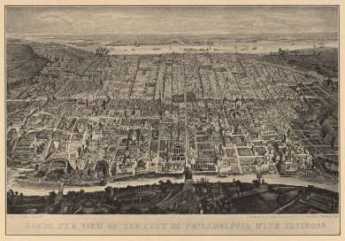
|
| Philadelphia 1854 |
When the City of Philadelphia turned into the County of Philadelphia (or vice versa) in 1854, the area had about 150,000 residents in 1850 but 500,000 in 1860. It qualified as one of the largest cities in America at the time, but what we today call middle-sized cities are about that same size. As a generalization, when a thriving American city approaches a size of about half a million, the business community often gets the idea that the city should expand its limits by annexing the neighboring districts. And, as a further generalization, the metropolitan newspapers are simply ecstatic about the idea of expanding their market reach, while the working classes of both the city and the region it proposes to swallow, are violently opposed. Since the business community typically feels that expansion would be good for business, labor unions are subdued. Leadership of the conservative middle-class rebellion is therefore generally led by the police and volunteer firemen, who are the most organized groups within the combative working class in a metropolitan region. Many citizens of all classes are of course quite indifferent about the matter. As history has turned out, only one such proposal in five will be successfully adopted, but it is almost unheard-of for a successful amalgamation to be reversed once it happens. In recent years, this general pattern has been followed in Indianapolis, Lexington, Jacksonville, Nashville, Baton Rouge, and Louisville. In countless other cities, the effort has been defeated by the voters.
It requires thriving prosperity for the business community to become politically dominant in a city, so the political context of these circuses amounts to a contest between the business "elite", often augmented by "carpet baggers from out of town" threatening comfortable lives within settled neighborhoods by merging them with culturally discordant residents in suburbs or countryside. On a political level, professional urban politicians favor expansion, because increasing the electorate generally makes it more expensive for an outsider to raise the funds to defeat them in an election. Exceptions to this rule occur when the two merging regions have different political parties in control, or when working-class city districts are so opposed that urban politicians fear to anger them. A symptom of this conflict for control of a city machine can be observed in the seemingly unrelated issue of a city charter with a "strong mayor" design. Cities with a strong city council generate greater ability to defeat the machine and are hence more reluctant to see mergers with suburbs. Nevertheless, the attraction which the business community can offer to the politicians is a larger tax base, although in the surrounding suburbs the dynamic is exactly the opposite. In the suburbs, it is the local businesses and professions who feel threatened, and who attempt to agitate the suburban politicians to protect their tax collections.
Although campaign rhetoric in these battles tends to exaggerate or distort the probable economic changes, academic studies find that the actual effect of city expansion is generally of modest subsequent growth, with modest increases in taxes. These effects seem comparatively weak since a metropolitan region is unlikely to produce a successful merger unless the economy is already growing fast enough to generate expansionism, and that vigor is likely to persist after the merger. These political uproars talk a great deal about economics, but in fact, the issue is primarily political. One commentator calls them "chess games pretending to be circuses", and the real force at work is usually an elaborate variation of gerrymandering. Urban minorities who usually vote Democrat can be swallowed up by suburban majorities who usually vote Republican. Or else a thwarted inner-city business community hopes to replace the urban machine with a more favorable suburban set of attitudes. There is seldom a uniform political gradient as the city border is approached from either side, so the chess game takes these patchwork population variants into detailed consideration. It is often argued that crossing a political boundary is unworkable, but since the thriving city of Atlanta is located in two different counties, that must not be a dispositive argument.
In their most elemental form, these expansion efforts have to do with political boundaries. It is therefore not surprising that the people most concerned are politicians. The battle cry is often to create a city without suburbs; failure to act leads to suburbs without a city. In fact, the underlying agendas are much more prosaic.
Philadelphia City-County Consolidation of 1854
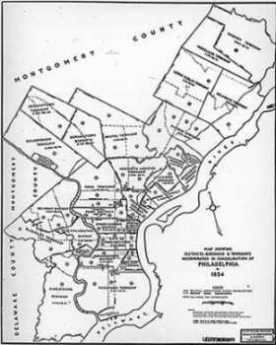
|
| Consolidation Map 1854 |
Philadelphia is still referred to as a city of neighborhoods. Prior to 1854, most of those neighborhoods were towns, boroughs, and townships, until the Act of City-County Consolidation merged them all into a countywide city. It was a time of tumultuous growth, with the city population growing from 120,000 to over 500,000 between the 1850 and 1860 census. There can be little doubt that disorderly growth was disruptive for both local loyalties and the ability of the small jurisdictions to cope with their problems, making consolidation politically much more achievable. A century later, there were still two hundred farms left in the county which was otherwise completely urbanized and industrialized. For seventy-five years, Philadelphia had the only major urban Republican political machine. By 1900 (and by using some carefully chosen definitions) it was possible to claim that Philadelphia was the richest city in the world, although this dizzy growth came to an abrupt end with the 1929 stock market crash, and the population of Philadelphia now shrinks every year. In answering the question of whether consolidation with the suburbs was a good thing or a bad thing, it was clearly a good thing. But since Philadelphia is suffering from decline, it becomes legitimate to ask whether its political boundaries might now be too large.
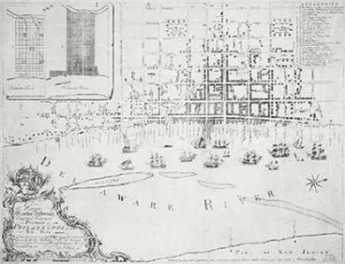
|
| Philadelphia Map 1762 |
The possible legitimacy of this suggestion is easily demonstrated by a train trip from New York to Washington. The borders of the city on both the north and the south are quickly noticed out the train window, as the place where prosperity ends and slums abruptly begin. In 1854 it was just the other way around, just as is still the case in many European cities like Paris and Madrid. But as the train gets closer to the station in the center of the city, it can also be noticed that the slums of the decaying city do not spread out from a rotten core. Center City reappears as a shining city on a hill, surrounded by a wide band of decay. The dynamic thrusting city once grew out to its political border, and then when population shrank, left a wide ring of abandonment. It had outgrown its blood supply. Prohibitively high gasoline taxes in Europe inhibit the American phenomenon of commuter suburbs. The economic advantage of cheap land overcomes the cost of building high-rise apartments upward, but there is some level of gasoline taxation which overcomes that advantage. Without meaning to impute duplicitous motives to anyone, it really is another legitimate question whether some current "green" environmental concerns might have some urban-suburban real estate competition mixed with concern about global warming. Let's skip hurriedly past that inflammatory observation, however, because the thought before us is not whether to manipulate gas taxes, but whether it might be useful to help post-industrial cities by contracting their political borders.
Before reaching that conclusion, however, it seems worthwhile to clarify the post-industrial concept. America certainly does have a rust belt of dying cities once centered on "heavy" industry which has now largely migrated abroad to underdeveloped nations. But while it is true that our national balance of trade shows weakness trying to export as much as we import, it is not true at all that we manufacture less than we once did. Rather, manufacturing productivity has increased so substantially that we actually manufacture more goods, but we do it with less manpower and less pollution, too. The productivity revolution is even more advanced in agriculture, which once was the main activity of everyone, but now employs less than 2% of the working population. This is not a quibble or a digression; it is mentioned in order to forestall any idea that cities would resume outward physical growth if only we could manipulate tariffs or monetary exchange rates or elect more protectionist politicians to Congress. Projecting demographics and economics into the far future, the physical diameters of most American cities are unlikely to widen, more likely to shrink. If other cities repeat the Philadelphia pattern, the vacant land for easy exploitation lies in the ruined band of property within the present political boundaries of cities, or if you please, between the prosperous urban center and the prosperous suburban ring.
Many American cities with populations of about 500,000 do need more room to grow, so let them do it just as Philadelphia did a century ago, by annexing suburbs. But there are other cities which have lost at least 500,000 population and thus have available low-cost low-tax land which would mostly enhance the neighborhood if existing structures were leveled to the ground. Curiously, both the shrunken urban core and the bumptious thriving suburbs could compete better for redeveloping this urban desert if the obstacles, mostly political and emotional, of the political boundary, could be more easily modified. But that's also just a political problem, and not necessarily an unsolvable one.
Constitution V: The Unforeseeable
At the 1787 Constitutional Convention in Philadelphia, the Framers had pride in their accomplishment, but great anxieties about how long it would survive. Few of them would have predicted it would survive for several centuries, unmatched in durability by any of its imitators. A dozen wars and unimaginable changes in the nature of American society have not shaken it. It survived two particularly ominous threats, the Civil War, and the 1937 Roosevelt Court-Packing episode, but more remarkably it survived momentous, unpredictable, changes in our political, social and economic environment.
The Invention of Political Parties.
It emerges in retrospect that the founding of the American republic took place during The Enlightenment, a comparatively brief interlude of general allegiance to rational behavior. Almost all efforts at the representative government for thousands of years had previously developed many political parties, and vicious ones at that. The Framers expected that elected representatives would disagree about policy and decisions, but would refuse to win political arguments by personally attacking the political opponents who expressed disagreement. The Enlightenment was world-wide, but the American version had strong doses of Virginia Cavalier courtesty and Pennsylvania Quaker humility of speech. Scarcely anyone in the former colonies was true to the manner born, and so almost everyone was both self-conscious and a little unrealistic about the mannerisms of gentlemen. Mix that with an aversion to the aristocracy recently rejected, and there emerged a hesitation to declare a true gentleman would want to be elected public representative for any reason except sincere desire to serve the public as a duty, and certainly not to seek raw power itself. George Washington was the particular exemplar of this model. Renouncing personal power at the moment of his greatest military acclaim, Washington was outspoken about his hatred of partisanship. Resigning as the victorious leader of the armed forces, his return to private life was an act that exited notice and admiration from the whole world, which had fully expected him to create a throne and sit on it firmly. He soon refused to come out of retirement to accept the Presidency unless it was offered unanimously, and agreed to only one term of office. After he was persuaded to accept a second term, he adamantly refused a third because he wanted to establish a tradition of voluntary transfers of power. Along that line, he was seriously concerned that he might die in office, preventing him from establishing a tradition of peaceful transfer of power. No one dared suggest political parties in Washington's presence, but the moment John Adams became President, partisan ugliness began. And it was Thomas Jefferson who was itching to begin it. Jefferson never considered waiting patiently for Adams to complete two terms, but began attacking him during the first one. However much Washington wanted to establish an enduring tradition of courtliness, his administration during the Philadelphia years now sticks out as a quaint aberration.
So the republic was started and established for at least Washington's term, with the proclamation that partisan politics of the sort universally seen before and afterward was only to be deplored. This period was the ten-year temporary period when Philadelphia was the nation's capital, so the concept persisted in Philadelphia as the dominant local standard for another fifty years. Meanwhile, the rest of the country degenerated into the deplorable politics of the frontier, the ignoble, and well, the gutter. Even after Philadelphia evolved into a serious player of machine and state politics, enough guilt about naked ambition remained to restrain the Quaker State from its normal role as a national political power. James Buchanan was indeed elected president but is believed to have been a failure. Since then he serves as an example of why politics are inherently dirty, not suitable for the ambition of authentic Philadelphians. Digby Baltzell blames much of this on Quakerism; that's a partial possibility, but ignores its lack of application to non-Philadelphia Quakers like Herbert Hoover and Richard Nixon, and its visible watermarks stamped on Philadelphians of all religions.
Not mentioning parties, the Constitution says nothing about their number or management. Since the original language contemplated the election of individuals, it leans toward all-or-none victories, thereby sparing us debate about proportional representation. We expect a two-party system, although we do not forbid more than two. The purpose of a party is to help people get elected, so can he win? is the decisive question in the selection of a party candidate. Extremists in both parties disqualify themselves by this test, so when the election finally arrives, comparatively little difference separates the two candidates, and losers can accept the winner. Our elections are unlikely to be followed by civil war, are more likely to be followed by legislative cooperation. Consider the situation with proportional representation among a dozen parties spread over the political spectrum: in nations that try it, one party seldom wins a majority and must form coalitions after the election results are known in order to achieve that governing majority. A succinct summary of the difference is that Americans make their deals before the election; countries with proportional representation have the election first and make deals later after the electorate is excluded. In the rare circumstance when the public wants the wrong thing, proportional representation is a way to do the right thing against the wishes of the public. While it is possible to envision a good outcome from such a situation, it is not easy to imagine public approval of it.
The Mysteries of Property
Everyone was once a nomad. When vast unoccupied land stretched in all directions, ownership meant very little; everyone moved at will. A particular water hole had importance, perhaps, but ownership of it merely meant fighting off others who came near; tribal ownership was a matter of having enough friends to help exclude intruders. If the tribe moved away and came back, intruders again had to be thrown out. This was essentially the situation of native American Indians when the Europeans arrived.
Conventions of land ownership existed under English common law in 1787 but were only a step better organized than the Indian conventions. All land belonged to the king, who might cede large estates to loyal nobles, but could also take it back if the vassal proved disloyal. The Magna Carta and the English Civil War could be viewed as steps in the disruptive process of eventually ceding portions of the King's land to individuals permanently, to have and to hold. The concept of private property became embedded in English common law and was carried over into our own Constitution, although the awkwardness of Indian rights created an incentive to be a little vague. English common law was not so much transferred into our system as recognized to "inform" it, a characterization which allowed the Judiciary to adopt, modify or ignore the awkward parts. Although the rules were imprecise, the Framers of the Constitution and John Marshall's court created a hybrid system, with enough flexibility to deal with remnants of the two preceding theories of land ownership, the farmer and the cowboy. Pre-revolutionary Royal caprice was frozen at the moment of independence, followed by successive recorded transfers through an unbroken chain to the present. If you could establish your position to the satisfaction of the courts, it was your land, your property. This seems to have been the basic model the Framers envisioned when they wrote the Constitution and served as a template for other kinds of ownership when they wrote of the sanctity of contracts. Because this uniform theory of ownership contained some delicate threads of reasoning, well recognized to conflict with the attitudes of the earlier Indian owners, and a little stretched when extended to concepts like intellectual property, it was essential to establish it as uncontested. Land ownership at that time was the main place to store wealth, and transforming a limitless continent into the useful property was the main route to acquiring wealth. Money in the form of currency was a tool for facilitating wealth transfers, banking was a step removed and remained contentious for a century. The property was wealth, and more sophisticated definitions of wealth were treated as property organized around the principles of real estate. When the Framers spoke of the sanctity of voluntary contracts they also had in mind preventing the recent abuses of debt forgiveness under state legislatures responding to unfettered majority rule. If the chain of ownership broke at any point, and particularly if contracts were unenforced the Framers had reason to fear the country could fall apart.
The certitudes of the Eighteenth century were also the certitudes of the Nineteenth; and even for most of the Twentieth century, those who challenged it were regarded as nuisances, intellectual triflers, perhaps Bolsheviks. The courts, however, began to observe evolving ideas of society conflicting somewhat with this central core of our law. Small businesses protested the unfairness of competing with big business, unrestrained by governmental antitrust laws. Labor unions rebelled at the situation of worker powerlessness in their eternal struggle for higher wages against huge companies intent on reducing costs. Private companies could not possibly compete against businesses run by the government, but perhaps it would be more profitable for all businesses to be run by the government. One by one, foreign socialist and communist countries have tried it and were competitive failures, but perhaps Singapore and China, or Denmark and the Netherlands, have perfected government ownership to a point where some corporate state could impoverish us if we persist in the old economic model. So far, it has not been necessary to argue justice and logic; the economic failures of other systems make adoption of their legal ideas laughable.
Nevertheless, the premise of unlimited open land is disappearing. Only 2% of workers in the economy work in agriculture. If the land is no longer the unwritten monetary standard, perhaps its requirements should no longer be the tentpole of the legal system. Perhaps the government has a legitimate role in health care, support of the arts, support of the poor and retired, education of the young. An underlying concept seems to be that certain economically unprofitable but desirable activities will not flourish in a property-based economy unless they are identified politically and reimbursed by taxation. Perhaps in an information age, the government is the logical and most efficient management of information. Perhaps if the government interfered more in private transactions, society as a whole would benefit. It can be difficult to tell how much this sort of reasoning is based on changing concepts of private ownership, and how much is a claim of collective rights; the two visions tend to merge in weakening individual control of the property, while enlarging public claims to the same property. Something called Society is claimed to exist and claimed to have rights.
This assault on old attitudes currently achieves prominence in the Green revolution, where residents of urban skyscrapers feel passionately about swamps and mountain tops they have never seen. If an eagle roosts on a farmer's land, somehow it is not the farmer's eagle, it is everybody's eagle. Green revolutionaries need to become far more explicit about their rights to the private property of others if they hope to convince judges that they have a case, but their ardor is not deniable.
Philadelphia City Controller
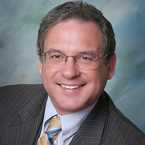
|
| Alan Butkovitz |
The Right Angle club was pleased to hear the City Controller, Alan Butkovitz, give us an insider's view of the municipal finances, but was a little startled to hear how badly the national banking crisis has affected our city. While of course the city does a lot of things, its present finances can be summarized as mainly consisting of two things: the pension system and the management of police/fire/corrections.
Mayors of this city for several decades have been following the national pattern of government to transfer its deficits to the pension funds of the employees. That has the effect of shifting the cost of present operations into the far future and avoiding present confrontations by promising even more generous pension benefits in the future. Over time, the future gets closer and closer; to a large degree, it is right now. Pension funds are largely independent organizations, supposedly receiving current contributions to be invested for future distribution. That requires an assumption about how much investment growth will be achieved in the meantime, now set by the Philadelphia Board of Pensions at 9%. That's not impossible to achieve in some medium-term intervals. But it's optimistic, even inconceivable, for long-haul investing; over periods of thirty or more years, most experts say that 4% is about all anyone gets. More to the point, 9% is particularly unachievable right now, in the present crash of national financial markets. That's bad enough, but repeated shortfalls in contributions to the fund have left it funded at 53% of the calculated requirement to pay the pensions of the future, even using the unrealistic 9% return assumption. A few years ago, Mayor Rendell worried about the underfunding and brought it up to 70% with a billion-dollar bond issue. Unfortunately, the crash in the markets has brought it right back down to 53% again. So, it's fair to say the pension fund is a couple of billion dollars short, even if you accept a 9% income accumulation -- which you probably can't, but at least it brings the pension fund to 70% funding in forty years. Call it four billion dollars short, just to be conservative, since it is presently admitted to being two billion. That isn't Mayor Nutter's fault, but it's sure his problem; and if it gets worse, it will be seen as his fault.
The other expense item of note includes 42% of the budget in the police, fire and prisons systems (education is handled separately through the school board). If you fired all those people, or they quit, we wouldn't have a city, we would have a jungle. But the Controller describes all three as terribly mismanaged, with the local police stations in a deplorable state of disrepair and degradation, bathrooms you wouldn't think of using, and so on. The fire department has only a minor number of fires to fight, perhaps four or five hundred a year, but it includes the emergency rescue services which respond to a couple hundred thousand calls a year. The rescue people report to the firemen, and there is social friction between the two, working to the disadvantage of rescue. It costs about $500 to respond to a call, and it isn't entirely satisfactory to send a fire truck to help someone with a heart attack. The Controller had a number of horror stories about administrative mismanagement in this area. As far as prisons go, everybody knows prisons are bad places, and ours are no exception. Confrontation with the unions is definitely in the future for the Mayor, and the city is going to be in pretty bad shape if he doesn't win some arguments.
That's the expense side of the municipal budget; the revenue side is equally gloomy. The offhand comment was that real estate taxes could double without bringing the pension system under control for twenty years. If our taxes are significantly higher than neighboring cities, or even just the same as in cities with superior uniformed services, it will be hard to attract and hold business taxpayers, causing municipal finance to spiral downward. Along the course of this patter-song, it isn't exactly reassuring to learn that it now takes the City 21 days to process a check and that absenteeism in some departments runs to 20%. We've heard a lot of denunciation of Mayors Giuliani and Bloomberg in New York, but their absenteeism runs 3% because investigators are sent to the house of an absentee, who is subject to court martial if he isn't home.
Somewhere in this nightmare lurks the hidden migration of the unionized workers. Starting with Mayor Rizzo or even earlier, the uniformed services were the main political support of the Democrat political machine. Quietly, they have moved out to the suburbs where the schools are better and the taxes are lower, and it is now said that 70% of union workers live (and vote) outside the city limits. The unions talk tough, bluffing through the uncertainty when their members can no longer provide the votes to be so fearsome. To some degree, their weakening political power is augmented by using their pension funds to provide construction loans for new commercial real estate. Some of that political clout is used up by the need to get zoning variances and tax abatements for the projects. A lot of these power shifts are hard to assess from the outside, but a trend is clear.
The controller didn't mention it, but the city is not only a pension investor in bonds but also an issue. Interest rates are about as low as they can get while the Federal funds rate is nearly zero, so there is only one direction they can go in the future -- sooner or later they will go up. By the iron law of bond financing, the value of the underlying principle will then go down. That could provide an opportunity to buy them back at lower prices, or it could break the city's financial back financing higher interest payments. However, for the pension fund side of things, exactly the opposite is true. Maybe Hizzoner can tap-dance around these dangers and opportunities, but most mayors would have trouble pronouncing the words.
It's part of the job description for the controller to be a pessimist. But the most you can make of this mournful dirge is to hope he is completely wrong.
Windmill Electricity

|
| Windmills |
The Right Angle Club was recently edified at lunch about wind-power generated electricity, by Craig Poff of Iberdrola Renewables, the largest producer of renewable-source electricity in the world. Iberdrola is a Spanish firm, headquartered in Bilboa where they have Basques, near where the Spanish Armada once started its ill-fated journey to battle Sir Francis Drake. Furthermore, it's near where there are caves with wall paintings several thousand years old. Craig is pure American, however, with a background in real estate sales. That isn't as remote a connection as it may sound, because it takes several years and a lot of salesmanships to assemble the leases necessary to create a windmill farm.
We've all seen photographs of these silvery towers, with what looks like aluminum propellers glinting in the sun. They are actually made out of fiberglass in much the same way boats are made, and quite often both are made in the Trenton region. So to speak, two hollow clamshells are held together with masking tape to form a propeller blade. Eventually, it revolves slowly, slowly in the wind, starting around 15 miles per hour, and getting turned off when the wind gets so fast it's dangerous. The blades modify their pitch at different speeds, and the entire contraption rotates to meet the wind. Sometimes one windmill will "steal" the wind from its neighbor, so the middle ones get turned down or turned off. There are local "met masts" to measure the wind and its direction and respond with appropriate directions via computers. There are also regional computer centers, and finally, electric power distribution is controlled by computers in Bilbao. Electricity can't be stored very well, so sometimes a perfectly good wind must be ignored when electricity isn't needed. Scientists are working on big batteries, and also on storing energy by pumping water uphill into storage reservoirs or compressing air into caves. Storing wasted electricity is a major issue, and high hopes are held out for innovation in batteries.
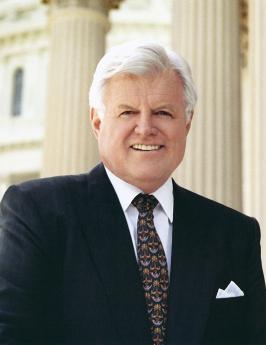
|
| Senator Ted Kennedy |
A typical tower is about 123 meters high, with a wingspan of about 300 feet; the towers are separated by roughly 1500 feet, but by much more when they are downwind. It's easy to see how negotiations with local farmers can be difficult, requiring months of public relations in a new community. Sometimes they encounter someone like Senator Ted Kennedy, who just plain dislikes how windmills look. Negotiations have to be conducted to obtain access roads to the wind farm, and access to the power transmission grid. Negotiations have to be conducted both before and after construction to satisfy game commissions who worry about the birds and the bats. As it works out, a farmer gets about $7000 a year to lease out his land, but windier areas are more prized, so jealous bargaining abounds. It's probably no wonder only 2% of electric power is presently generated this way, even though Pennsylvania law requires the power companies to reach 18% by 2020. Requires? What's the reasoning behind that? At present, the windmill nearest to Philadelphia is in Pottsville.
It's nice this electricity gets generated by a source so clean, which also can't be shut off by the Iranians. But awkwardly it's expensive to make electricity this way, particularly if you include the subsidies it enjoys. Yes, yes, it's true that lots of things are receiving dubious subsidies, and some of them are competitors to wind power. But the unwillingness of wind power advocates to acknowledge the relative costs of their product suggests to any skeptic that relative costs must be extremely high, indeed. Yes, it's clean, but it's expensive and needs a subsidy. Industries that consume large amounts of power have been offered power purchase agreements that constitute a hedge against future cost volatility for many years in the future. That's both a hedge against rising costs and a promise of reliability; some businesses will pay for that. The competitive economics are that the initial cost of wind power is quite high, but future maintenance costs are quite low. More typically, most household consumers feel they have a right to know more precisely what the competitive prices really are, absent loss leaders, subsidies and hype. When we know that for sure, we consumers will decide whether a somewhat cleaner environment is worth the price. The investors in this technology must gamble they can persuade us that it is, and one can be fairly certain competitive energy producers will seek to persuade us that it isn't. What the farmers who lease their land think, also matters. But the farmers will mostly matter in the legislature voting on clean air mandates, where city dwellers tend to lose their influence. You can sort of see how the legislators think: the farmers know how much they have been offered for the land leases, but the city dwellers can only guess at how clean the environment will get, and how much the electric costs will rise.
Reforming Health Reform, New Jersey Style
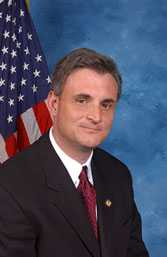 |
| Congressman Robert Andrews |
A single e-mail to constituents, and no other communication visible to the general public, announced a town hall meeting with our Congressman, Bob Andrews, on the campus of Rowan University, from 6 to 8 PM, August 24, 2009. The subject was to be Health Care Reform Legislation. On arrival, it was hard to find the auditorium in the square mile of new college campus, and only a small sign entitled "Event" indicated the place to park. Lots of cars.
By counting seats in a row and multiplying by the number of rows, the University Auditorium held 3000 people, but at 6 PM it was difficult to find a vacant seat. The doors were almost blocked by two lines of people standing to speak at microphones in the center of the hall, snaking all the way out past the television cameras and then out the door. These people were strangely silent, preoccupied but not rude, apparently rehearsing their speeches. In the lobby outside the doors, several workers were distributing posters showing "Thank You!", checking people off on lists of some sort. Many of those who got posters were wearing red T-shirts emblazoned with something or other.
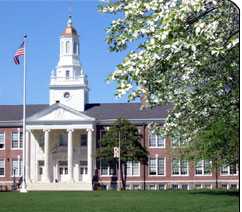 |
| Rowan University |
When I finally got a seat inside, it was behind a whole row of such T-shirted poster-holders, mostly but not entirely of the black race. The Congressman was giving a little speech to the effect that he was one of the committee members who wrote the bill, so of course, he had to support it. Strange, that as a member of Commerce and Labor he was working on a bill which traditionally is the province of the Subcommittee on Health, of the Ways and Means Committee. In any event, that gave him the ability to explain some of the languages which were a little too hard to understand. Several in the audience shouted out something unintelligible at that point, but mostly the audience sat in silence, waiting for the questions. He soon opened it up for questions, because he wanted to know what his constituents were thinking.
Although a few inevitably wandered off the point, questioners were confident, moderately deferential, remarkably effective. No matter how it was stated, and no matter how it began ("I have always voted for you, Congressman"), they were at the microphone to run a sword into him. To some extent, posting the entire bill on the Internet had changed politics. One old man, reading from his papers, said that page 343 says, etc; to which the harassed Congressmen blurted out, "That isn't true!" But the old man held his ground, "Oh, yes, and what else isn't true, that's written in the bill?"
Our congressman represents a working-class district, as clearly illustrated by his previously running for Congress without opposition. In searching for the reason this solidly Democrat audience was so antagonized, one gathers they generally have Unionized health benefits and feel threatened that ensuring the "illegals" will be paid for by impairing their own insurance. Somehow they feel that anyone who denies it is lying to them. ("It isn't what's in the bill, it's what will be in the bill ten years from now.") Except for college professors, Union members have the most luxurious health insurance coverage in America and are accustomed to boasting of it. Somehow, this privileged position drowns out their envy of rich people. When told that only the top x% of the country would have its taxes raised, one man bore right in on the Congressman. "You never heard anyone asking a poor man to give him a job". (Yeah, right, right on, Yeah.)
Although the people in red shirts holding posters put up a fight for fifteen minutes or so, they soon subsided out of recognition of who "owned" the room, and the remaining three hours of "questions" were almost uniformly negative. After an hour, the television cameras left the room, and at that signal, the people in front of me wearing red shirts also left. After a succession of speakers praised physicians somewhat excessively, a couple of physicians got up and made a poor showing at the microphone. One of them, a fat woman, had the poor judgment to tell these folks that many diseases like diabetes were self-inflicted, but was to hear back that it would help if our President would himself stop smoking and leave the rest of us to mind our own business. Two women who proclaimed themselves single mothers were no better treated..
At 9:30, a meeting scheduled to end at 8 PM still had a thousand people in the audience, and fifty at the microphones. But I had enough. They made their point. All that remains is to see how fairly the television editors extract significant clips and to find out how the rest of the nation feels.
LATER FOOTNOTE: As matters turned out a few months later, this national legislation had more of a local New Jersey effect than the audience could have guessed. Mandating health insurance for 30 million uninsureds, Obamacare accomplished it for 15 million of them by forcing them into the state Medicaid program, which is widely acknowledged to be the worst program in American medicine, because it usually is the most under-funded. New Jersey residents are firmly opposed to anything which raised their already high local taxes and will focus intently on the attempt in the coming lame-duck session of Congress (November 2010) which intends to transfer federal money to states to pay for Medicaid, and which is given only the narrowest chance of success. Republican Governor Christie deftly split the industrial unions from the public sector unions with the remark, "Every time they get a raise, you get a tax increase." It was hard to answer.
Harvard Progressives in Philadelphia
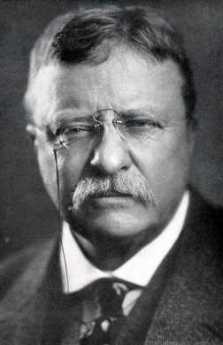
|
| Theodore Roosevelt |
The Progressive movement of the early 20th century is most concisely viewed as a futile social reaction to the vast changes in America caused by urbanization and industrialization after the Civil War. The transcontinental railroad threatened to destroy the wild, wild West, but the enduring environmental movement had overtones of even greater hostility toward industrialization, the cause of it all. In this sense, it joined forces with socialist and labor reform movements, in hating the newly rich, the spoilers, the Robber Barons. It briefly shared sympathies with anti-immigrant groups, while simultaneously expressing great sympathy with the decisions of the people, as opposed to corrupt politicians. There was a strong Calvinist streak in Progressivism, linked back to New England and Harvard its intellectual center. Regardless of any other contradiction, it reflected the viewpoint of Theodore Roosevelt. Teddy Roosevelt, "that damned cowboy" in the view of conservatives, did not invent the ideas of Progressivism, but he surely personified them, illustrated them in action. This confused turmoil of resentments was knocked off the front pages by a real threat to European civilization, the First World War. A terrifyingly well organized German war machine took the place of Robber Barons as a symbol of what was wrong with the world. The crash of 1929 and its ensuing long depression finally put an end to older controversies; it pushed the "reset" button.
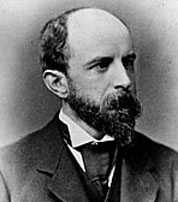
|
| Henry Brooks Adams |
To understand the position of Philadelphia's upper crust during the Progressive era, four or five names need to be fleshed out. Owen Wister and J. William White would be important Philadelphia links to the Bostonians Henry Adams and Henry James. All of them were leading literary figures, and all of them were close friends of Teddy Roosevelt. Roosevelt, it might be recalled, was the author of thirty-four books. This little group of literary giants were members of the leading families of Boston, New York, and Philadelphia; what they said, mattered. Although today Owen Wister is mainly known as the author of The Virginian, the first of the cowboy stories of the Wild West, he was, in fact, an observer of the social climates of not only the West, but the deep South (Lady Baltimore ), and the East Coast ( Romney). Some idea of his political leanings can be gleaned from his presidency of the Immigrant Restriction Society, and the authorship of an article called Shall We Let the Cuckoos Crowd Us From Our Nest . Wister has been called "the best born and bred of all modern writers", referring to his descent
Camden NJ: The Third, or Irish, Tenth
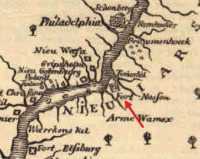
|
| Camden in 1662 |
The early Swedish and Dutch settlers tended to sail up the Delaware Bay, and settle on the right-hand bank, which we now call New Jersey. In time, Seventeenth-century settlers, even William Penn, switched over to the left, or Pennsylvania, side. The Dutch, who had experience with dikes on the Zuider Zee, knew that it was quicker and easier to drain the lowlands than to chop down big trees and dig up the roots. Although the Dutch were more interested in fur trading than agriculture, they had to eat. Fish, crabs, oysters and truck gardens were enough for that purpose. After establishing a Fort Nassau at what is now the town of Gloucester, on the south edge of Camden, fur trading on the New Jersey side began to fall off, and the Dutch settlement was moved across the river as Fort Casimir, next to the mouth of the hidden river, the Schuylkill, just south of what is now the international airport. That was fine for the Dutch to stay close to their ships, but the Indians on the far side of the swamp resisted coming down the swampy river and held back to do their fur trading at Gray's Landing, on the high ground between Bartram's Gardens and the University of Pennsylvania. For the Dutch it was a pleasant paddle up from the mouth of the river at Fort Casimir, and anyway you never know about strangers.
William Penn followed the same path, buying and reselling farmland in New Jersey for a decade before he asked for, and King Charles gave him, Pennsylvania. Skipping many of the details, northern New Jersey, called East Jersey, was given to Scottish Quakers, while what we call South Jersey and they called West Jersey, was divided into ten parts among the English Quakers. The Third Tenth around the Cooper River roughly corresponds to Camden County, and was mainly purchased by Irish Quakers and for a while was called the "Irish Tenth". In time, Gloucester County was split off from Camden County, which was mainly known originally as Newton Township. After a century, the Irish origins of the local inhabitants of Newton and Haddonfield were largely forgotten. The town of Gloucester, however, was situated on the river next to what was to be the vast shipyards of New York Shipbuilding Corp.(1899-1967). First addressing the oak forests of West Jersey for the masts of sailing ships, sailing ships were built with lumber logs floated down the Susquehanna River in rafts during the Nineteenth century. This industry attracted later Irish immigrants during the time of the great Irish migrations, and still more were attracted when World War I made Camden a major steamship building center. The experience was repeated during World War II, reaching its eventual high point when the nuclear Aircraft carrier Eisenhower could be seen under construction by commuters going over the Walt Whitman Bridge.
Shipbuilding, like other heavy industry of the rust belt, moved abroad seeking cheaper labor, and what little remained on American soil moved to Norfolk, Virginia. The response of protectionist legislation made America even less attractive for unionized industry. The wiser workers saw what was happening and sought jobs in other industries, elsewhere. But Gloucester City, underneath the bridge girders and surrounded by winding creeks, held out as an oasis of working-class Irish as the southern anchor of crumbling, decaying Camden. About a thousand homes had been built by the federal government during the labor shortages of World War I, as Fairview. These two little Irish enclaves, 97% Caucasian, continue to hold out for a day that will likely never return, gathering in their taverns to sing songs about old martyrs, fighting to maintain control of the industrial unions, and dominating the Democrat politics of the county. There was a time when leverage might have established political control of South Jersey, and through that to the domination of the whole state, but that gets progressively less likely. Tough politics essentially met more than its match in the river towns of North Jersey, other groups learned to play the ethnic game, and the recent uproar about child molestation has loosened the hold of their church on young adherents with school children. The same pattern seems to be emerging on the Pennsylvania side of the river in Delaware County, where however the political machine has historically been Republican.
Meanwhile, just a little to the north, the city of Camden steadily decays and deteriorates. Now only half the size of its 125,000 "Citadel of Republicanism" in 1950, the title of America's poorest city is applied to an average income of $18,000, and various statistics of violent crime make it the first or second most dangerous place in America to live. The City is 53% black, 29% of Puerto Rican origin, and 44% below the official poverty level. In 2001, its Mayor was sent to jail as an affiliate of the Mafia, and the state took over the running of the city. In 2009, a state auditor reported that the books were in such chaotic condition that it was impossible to say where they stood, financially. Along the way to this sorry state, RCA Victor (1901-1986) finally moved out, after decades of watching its employees migrate to the suburbs, taking their tax revenue with them. Although Campbell Soup loyally maintains and is even expanding its national headquarters in Camden, the soup is made elsewhere. Frozen chicken dinners are made by the hundreds of thousands in Delaware, assembling the tinfoil, chickens, and peas from hundreds of miles to the moment when it is packaged mechanically in a manner that would shame the Japanese. There was a time in living memory when truckloads of Jersey tomatoes were lined up at the Camden soup factory for miles, but all that has moved to California. Jersey tomatoes ripened sequentially throughout the season, requiring human tomato pickers to tell green ones from red ones. A new form of hybrid tomato ripens all the fruit simultaneously, allowing it to be mechanically harvested, and taking advantage of three crops a year in California. The Golden State on our western coast seems to be having labor and tax trouble, too; but that is small comfort to Camden.
As factories close, people abandon their homes, slums result. The schools deteriorate, migration and crime increase. Most people would say it is a mess. A recent sociological study, called Camden After the Fall describes in painful detail how every idea anyone has ever had about how to turn Camden around -- has been tried, amply funded and found to be an utter and discouraging failure. The highway system has been modernized, only to allow commuters to buzz through Camden somewhat faster. Public buildings have been built, only to underline the fact that no new construction has taken place with private money in decades. Building a prison in the center of town created jobs, and now more jobs are being created to tear it down. Rutgers, the state university, has a branch under the shadow of the Ben Franklin Bridge. The battleship New Jersey is at anchor in a lovely riverside park, there's a nice little minor league baseball park. Anything you can build with tax money has been built. There's just no private industry, or business, or profession. Anyone who has a bright idea is welcome to read Camden After the Fall . It's just possible something to try has been overlooked, though it isn't very likely. Except for law, order and good schools.
After decades of watching Camden get steadily worse as I commuted hastily through it, I would say there actually is sort of a plan visible. As houses decay, they are torn down, and the grass is planted. It seems likely that the plan is to wait until a large enough plot of land is cleared and planted to grass, so it eventually becomes attractive to a developer. And then the developer will make tons of money with raw land that even the Indians in 1640 could see was very well situated.
Political Bosses
Cameron, Sr. Cameron, Jr. Quay Boises Penrose
Re-Doing Dilworth Plaza
 |
| Richard Maimon |
Richard Maimon recently visited the Right Angle Club to tell us all about the architectural plans afoot to consolidate the underground transportation network underneath City Hall, change the patterns of foot traffic, open up the views, and draw the visitors to the expanded convention center into the city itself. All of this is to be accomplished by paving over Dilworth Plaza and planting it with grass, along with an extensive fountain installation which can be used for winter ice skating. In the course of creating an entrance hub for Septa, the Broad Street and Market subways, walkways are rearranged and -- it is hoped -- the foot traffic around City Hall will shift around to make it a real city center. It's a very expensive dream because of all the overlapping transportation tunnels hidden under the largest and heaviest stone building in America, leading to a great deal of expensive construction work that doesn't show.
 |
| interior view of concourse north_ |
Dilworth Plaza is currently almost completely deserted, so its conversion will not be much mourned. However, the mixture of contemporary transportation entrances with the neo-classical architectural style of City Hall will probably meet resistance, and there is concern that excessive foot traffic could convert a grassy park into a mud puddle, while a large open-air lake could become a public rest-room for the homeless if the designers aren't careful. To some extent, the public forces to be resisted in the design will be self-policing if the anticipated foot traffic is at the anticipated level, but overwhelmed if the project is too successful, or left to deteriorate if it fails to succeed. And it's all too expensive to do twice; the designers have to get it right the first time.
 |
| Section Pavilions |
So, it all comes down to money. Construction costs are less during a recession, but raising money is easier during a booming economy. High hopes are raised for a Democratic governor to be able to persuade a Democratic president to divert stimulus money our way. High hopes are raised for a former Mayor's ability to divert state funds to our part of the state. In other words, it all depends on Governor Rendell, now that Senator Specter has navigated himself off the Appropriations Chairmanship. In our system of government, public works projects have to be placed somewhere, so the best system is to rotate the goodies in an informal way. This rotation, in turn, depends on a geographical rotation of the top political officers, since they can claim that it is "Philadelphia's turn". So, the grim reality is that only two Philadelphia mayors in history have become governors of the state, with the rather bitter result that Philadelphia has been neglected in the siting of the available public projects for a very long time. Digby Baltzell long preached that it was our own fault, for being too non-aggressive. But most of the rest of us, particularly those who have wrangled with the upstate legislature, blame the situation on narrow-minded opposition from those who have worked the gerrymandering game for a couple of centuries.
First Amendment: Separation of Church and State
 Amendment 1 Congress shall make no law respecting an establishment of religion, or prohibiting the free exercise thereof; or abridging the freedom of speech, or of the press, or the right of the people peaceably to assemble and to petition the government for a redress of grievances. 
|
| The First Amendment |
Simplified histories of America often declare that other Western Hemisphere colonists mostly came to plunder and exploit; whereas English Protestant colonists came with families to settle, fleeing religious persecution. That's a considerable condensation of events covering three centuries, but it is true that before the Revolutionary War, eleven of the thirteen American colonies approximated the condition of having established religions. Massachusetts and Virginia, the earliest colonies, had by 1776 even reached the point of rebelliousness against their religious establishments. The three Quaker colonies (New Jersey, Pennsylvania, and Delaware) were late settlements, in existence less than a century before the Revolution, and still comfortable with the notion they were religious utopias. While differing in intensity all colonials respected the habits of thought and forms of speech, natural to utopians residing in a religious environment.
Once Martin Luther had let the Protestant genii out of its religious bottle, however, revisionist logic was pursued into its many corners. Ultimately, all Protestant questers found themselves confronting -- not religious dogmatism, but it's opposite -- the secularized eighteenth-century enlightenment. Comparatively few colonists were willing to acknowledge doubts openly about miracles and divinity. However, private doubts were sufficiently prevalent among colonial leaders to engender restlessness about the tyrannies and particularly the rigidities of the dominant religions. To this was added discomfort with self-serving political struggles observable among their preachers, and alarm about occasional wars and persecutions over arguably religious doctrines. Arriving quite late in this evolution of thought -- but not too late to experience a few bloody persecutions themselves -- the Quakers sought to purify their Utopia by eliminating preachers from their worship entirely. Thus, the most central and soon the most prosperous of the colonies made it respectable to criticize religious leaders in general for the many troubles it was believed they provoked.
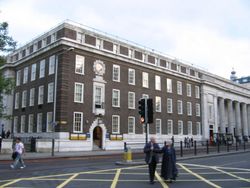
|
| London Yearly Meeting |
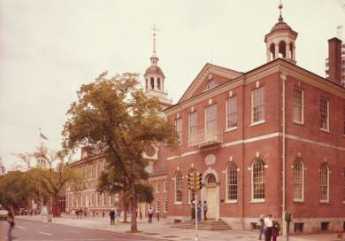
|
| Congress Hall |
In all wars, diplomatic arts and religious restraints get set aside as insufficient, if not altogether failures for an episode of utter barbarism. In the Revolution, some Quakers split from pacifism and became Free Quakers, many more drifted into Episcopalianism, never to return to pacifism. The Constitutional Convention of 1787 was eventually held in this persisting environment; the previous service in the War counted for something, and the great goal was to strengthen the central government -- for more effective regional defense. A great many leaders were Masons, holding that much can be accomplished by secular leadership, independent of religious reasonings. Neither Washington nor Madison revealed much of their religious positions, although Washington the church attender always declined communion; Franklin and probably Jefferson were at heart deists, believing that God might well exist, but had wound up the universe like a clock to let it run by itself. The New England Calvinist doctrines have since evolved as Unitarianism, which outsiders would say theologically is not greatly different from deism. Physically surrounding the Philadelphia convention was a predominantly Quaker attitude; entirely too often, preachers get you into trouble.
When the first Congress finally met under their new constitution, they immediately confronted over a hundred Constitutional amendments, mostly submitted from the frontier and fomented by Jefferson and Patrick Henry, demanding a bill of rights. The demand within these amendments was overwhelming that the newly-strengthened central government must not intrude into the rights of citizens. Recognizing the power of local community action, states rights must similarly be strengthened. Just where these rights came from was often couched in divine terms for lack of better proof that they were innate, or natural. From a modern perspective, these rights in fact often originated in what theologians call Enthusiasm; the belief that if enough people want something passionately enough, it must have a divine source. The newly minted politicians in the first Congress recognized something had to be done about this uproar. Congress formed a committee to consider matters and appointed as chairman -- James Madison. Obviously, the chief architect of the Constitution would not be thrilled to see his product twisted out of shape by a hundred amendments, but on the other hand, a man from Piedmont Virginia would be careful to placate the likes of Patrick Henry. The ultimate result was the Bill of Rights, and Madison packed considerably more than ten rights into the package, in order to preserve the cadence of the Ten Commandments. The First Amendment, for example, is really six rights, skillfully shaped together to sound more or less like one idea with illustrative examples. Overall freedom of thought comfortably might include freedom of speech (and the press), along with freedom of religion and assembly, and the right to petition for grievances. But what it actually says is that Congress shall not establish a national religion. Since eleven states really had approximated a single established religion, the clear intent was to prohibit a single national religion while tolerating unifications within the various states. Subsequent Supreme Courts have extended the Constitution to apply to the states as well, responding to a growing recognition that religious states had the potential to get so heated as to war with each other. No matter what their doctrines, it seemed wise to deprive organized religions of political power as a firm step toward giving the Constitution itself dominant power over the processes of political selection.
At first however it was pretty clear; one state's brand of religion was not to boss around the religion of another state. Eventually within one state, Virginia for example, the upstate Presbyterian ministers were not to push around the Episcopalian bishops of the Tidewater. Madison and Jefferson saw well enough where political uprisings tended to start in those days, in gathered church meetinghouses. In this way, an Amendment originally promoted to protect religions had evolved into a way to ease them out of political power. The idea of separation of church and state has grown increasingly stronger, to the point where most Americans would agree it defines a viable republic. No doubt, the spectacle of preachers exhorting the same nation in opposite directions during the Civil War, settled what was left of the argument.
For Quakers, the most wrenching, disheartening revelation came when they were themselves in unchallenged local control during the French and Indian War. The purest of motives and the most earnest desire to do the right thing provided no guidance for those in charge of the government when the French and Indians were scalping western settlers and burning their cabins. Yes, the Scotch-Irish settlers of the frontier had unwisely sold liquor and gunpowder to the Indians, and yes, the Quakers of the Eastern part of the state had sought to buffer their own safety from frontier violence by selling more westerly land to combative Celtic immigrant tribes. A similar strategy had worked well enough with the earlier German settlers, but reproachful history was not likely to pacify frontier Scots in the midst of a massacre. The Quaker government was expected to do what all governments are expected to do, protect their people right or wrong. To trace the social contract back to William Penn's friend John Locke was too bland for a religion which prided itself on plain speech. Non-violent pacifism just could not be reconciled with the duties of a government to protect its citizens. The even more comfortably remote Quakers of the London Yearly Meeting then indulged themselves in the luxury of consistent logic; a letter was dispatched to the bewildered Quaker Colonials. They must withdraw from participation in a government which levied war taxes. And they obeyed.
Although the frontier Scots were surely relieved to have non-Quakers assume control of their military duty, the western part of the state has still neither forgotten nor forgiven. In their eyes, Quakers were not fit to be in charge of anything. Quaker wealth, sophistication and education were irrelevant; only Presbyterians are fit to rule. A strong inclination toward pre-destination lurks in that idea. Once more, the attractiveness of clear separation of church and state is reinforced.
The French and Indian War in fact had turned out fairly well; most of its victories were located on the European side of the Ocean, anyway. But twenty years later the Revolutionary War turned into a reassertion of the British conquest of all of North America, not merely the part to the west of the Appalachian mountains. To Americans, this came in the form of a demand for taxes to help pay off the costs of a war which greatly benefitted them. The Quaker colonies did not fully sympathize with rebellion, but they had once given up control of a territory larger than England rather than pay war taxes, so they were resistant to both sides in the dispute. Many prosperous and educated Quakers solved their dilemma by fleeing to Canada, but the ardent Quaker proposal for dealing with a coercive British government was not at all impractical. John Dickinson, in particular, argued that since the British motives were economic, success was most likely to come from economic counter-pressure, adroitly leveraged by three thousand miles of intervening ocean. That was shrewd and potentially effective. But the Scots-Presbyterian position was simpler and more direct. If you want us to fight your war, you are going to have to fight to win. The Virginia Cavaliers were probably more likely to win a conventional war if put in charge, but the blunt and almost savage frontiersmen were ideally suited for what has come to be called guerrilla warfare. Washington was a leader, French money was welcome and Ben Franklin was a diplomat, but the clarion call to this particular battle was the voice of Patrick Henry. All in all, the issue of established religion was far more complicated than merely the affirmation of a right to free exercise of religious belief. What united all the colonies was a recognition that, using the church, an arm of the government was just as likely to cause trouble as conducting the state as an instrument of church interests. Eventually, considering how religious America was at the time, there was remarkably little resistance to the firm separation of Church and State in its Constitution.
Puritan Boston & Quaker Philadelphia
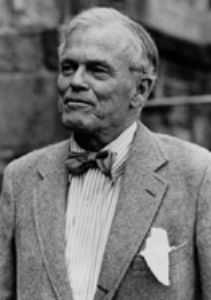
|
| Professor Digby Baltzell |
Digby Baltzell had something of the defiant rebel in him. He surely didn't imagine his employer, the University of Pennsylvania, was pleased to have him a document that Harvard is a better college than Penn. Nor were fellow members of the Philadelphia Club pleased to confront scholarship that his city's gentry was too devoted to money-making to accept the ardors of public leadership. Nor would his relatives in the Society of Friends enjoy accusations their religion impaired the pursuit of excellence in all fields of the city's endeavor. Later articles will here take up some unfair assaults, and defend Quaker simplicity and Peace Testimony. Some blame must, of course, be shared, some mitigating circumstances acknowledged. And let it be said in Baltzell's support that it truly is remarkable how many cultural features do get passed down for ten or more generations. Or even longer; look at the persistence of ancient Chinese, Indian, Esquimo, Viking, Roman, Christian and other cultural heritage. The Quakers got to Pennsylvania early, they are now vastly outnumbered. Many Quaker ideas continue to influence present inhabitants, some ideas probably hold us back. Substitute "Puritans of Boston" for "Quakers" in the foregoing sentence, and conclude by saying "some of those ideas probably give Bostonians an edge". Those two rather unexceptional declarations summarize a controversial book, although they do not completely capture its overall censorious flavoring.
To a certain extent, Digby is his own worst enemy. While alive, he was one of the world's most charming raconteurs, a walking encyclopedia of local lore. Like a good docent in a museum, he could walk into a room hung with portraits, and charm any audience for an hour; presumably, his sociology lectures at Penn held the same magnetism for his classes. In a book for popular readers, however, it is overdone to go on about the same point for six hundred pages. He needed a better editor, or perhaps he needed to permit a better editor to make him restrain his tendency to multiply illustrations beyond the point where the reader loses the thread of the argument. Not all readers will agree with his argument; they can only be legitimately defeated by focused argument. That's perhaps unrequired of college professors holding the power of grade-point averages over nineteen-year-olds, but it is expected of conversation with other adults. If an editor wants to sell books to a general bookstore audience, he should induce authors to overcome the take-it-or-leave-it habit.
As a general reaction to this book, Baltzell seems to think Quakers do not want to be rich and that consequently, latecomers into the region tend to share this feeling. My own view is that Quakers see they can have almost all of the value of being moderately rich -- by disdaining the trivial luxuries of the middle classes. They do not exactly renounce fame and power but are unwilling to gamble much or sacrifice much, in order to enjoy the comparatively small exhilaration of being very rich. They are now no longer surrounded by junior versions of themselves, but by bank-robbing Willie Suttons who readily attack Quakers for being where the money is, and appear to be pushovers at that. When Quakers then promptly demonstrate they are not pushovers at all, they are treated like outsiders in their own town. In many ways and at most times, the populist crowd gives up trying to understand Quakers and decides they must somehow always behave in ways that others would not. It's hard to achieve much deference in such an environment.
Many of Baltzell's important insights grew out of his position as a Philadelphia and academic insider; he personally knew many of the people he described. However, such an infiltrator runs the constant risk of being viewed as a tattle-tale, so a cover is required. Batzell's technique involved frequent use of quotations from others, not so much to prove a point as to rephrase it. This is another feature of the book which might have benefited from a hard-nosed editor. However this is how he wanted it, and in a post-publication revision, here is a condensation of how he summarizes his argument:
When studied with any degree of thoroughness, the economic problem will be found to run into the political problem, the political problem, in turn, run into the philosophical problem, and the philosophical problem itself to be almost indissolubly bound up at last with the religious problem.
--Irving Babbitt
In the South, ....left-wing Quakers came to the fore in the pine barrens of North Carolina-- to this day, North Carolinians speak of their state as "a valley of humilities between two mountains of conceit."
--E. Digby Baltzell
The world is only beginning to see that the wealth of a nation consists more than anything else in the number of superior men it harbors.
-- William James
I believe that ambitious men in democracies are less engrossed than any other with the interests and judgments of posterity; the present moment alone engages and absorbs them...and they are much more for success than for fame. What appears to me most to be dreaded, that in the midst of the small, incessant demands of private life, ambition should lose its vigor and its greatness.
-- Alexis de Tocqueville
Our rulers today consist of a random collection of successful men and their wives. ....They have been educated to achieve success, but few of them have been educated to exercise power. Nor do they count with any confidence upon retaining their power, nor of handing it on to their sons. They live therefore from day to day, they govern by ear. Their impromptu statements of policy may be obeyed, but nobody seriously regards them as having authority.
--Walter Lippmann
Equalitarians holding...extreme views have tended to believe that men of great leadership capacities, great energies or greatly superior aptitudes are more trouble than they are worth.
--John W. Gardiner
In the Jacksonian era in this country, equalitarianism reached such heights that trained personnel in the public service were considered unnecessary...Thus, in the West, even licensing of physicians was lax, because not to be lax was apt to be thought undemocratic.
--Merle Curti
In the late eighteenth century we produced out of a small population a truly extraordinary group of leaders-- Washington, Adams, Jefferson, Franklin, Madison, Monroe, and others. Why is it so difficult today, out of a vastly greater population, to produce men of that character?
--John W. Gardiner
It is nevertheless certain that the high quality of Virginia's political leadership in the years when the United States was being established was due in large measure to those very things which are now detested. Washington and Jefferson, Madison and Monroe, Mason, Marshall, and Peyton Randolph, were products of the system which sought out and raised to high office men of superior family and social status, of good education, or personal force, of experience in management: they were placed in power by a semi-aristocratic political system.
--Charles S. Syndor
Another clue to the relationship between hierarchy and leadership is suggested by Gardner's list of the Founding Fathers. All of these men were reared in Massachusetts or Virginia; none was reared in the colony of Pennsylvania, though Philadelphia was the largest city in the new nation and contained perhaps the wealthiest, most successful, gayest, and most brilliant elite in the land. Not only had Pennsylvanians little to do with taking the lead in our nation's founding, but the state has produced very few distinguished Americans throughout our history...I shall concentrate here on the commercial cities of Boston and Philadelphia, whose great differences in leadership and authority were far more likely to reflect differences in ideas and values.
--E. Digby Baltzell
Whatever else ...America came to be, it was also an experiment in constructive Protestantism.
--H. Richard Niehbur
All this is only to say that man is a product of his history, where nothing is entirely lost and little is entirely new.
--E. Digby Baltzell
For the wine of New England is ...more like the mother-wine in those great casks of port and sherry that one sees in the bodegas of Portugal and Spain, from which a certain amount is drawn off each year, and replaced by an equal volume of the new. Thus the change is gradual, and the mother wine of 1656 still gives bouquet and flavor to what is drawn in 1956.
--S.E. Morison
New Englanders, ambitious beyond reason to excell.
--Henry Adams
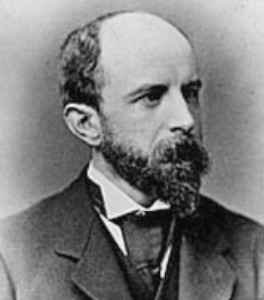
Henry Adams Pennsylvania became the ideal state, easy, tolerant and contented. If its soil bred little genius, it bred less treason. ... To politics, the Pennsylvanians did not take kindly. Perhaps their democracy was so deep an instinct that they knew not what do to with political power when they gained it; as though political power was aristocratic in its nature, and democratic power a contradiction in terms.
--Henry Adams
The reproach I address to the principles of equality is that it leads men to a kind of virtuous materialism, which would not corrupt, but would enervate the soul, and noiselessly unbend its springs of action.
--Alexis de Tocqueville
In our egalitarian age of mistrust, trustworthy men of great ability are increasingly refusing to run for public office or to serve in positions of authority and leadership in our society...In the rest of this book, I shall try to show how and why the Quaker city of Philadelphia, in contrast to Puritan Boston, has suffered from that virus of virtuous materialism for almost three centuries and how its best men, on the whole, have seldom sought public office or positions of societal authority and leadership outside business.
--E. Digby Baltzell
REFERENCES
| Puritan Boston and Quaker Philadelphia: E. Digby Baltzell. ISBN-13: 978-1560008309 | Amazon |
William Penn, Excellent Lawyer, Terrible Businessman
Richard Dunn, who with his wife Mary Maples Dunn stand as the two core authorities on the life of William Penn, merely smiles when asked to describe what Penn was really all about. "What we need is to have one good biography emerge," said he, "but it isn't easy to guess what it will say". For the present, let's just sketch a few paradoxes which somehow need threading together.
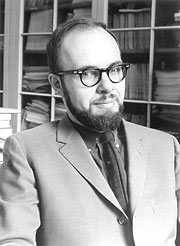
|
| Richard Dunn |
In the first place, the wealth of William Penn can only be described as prodigious. His father had played a central role in restoring the Stuart monarchs, and in the course of it had conquered for the Crown the enormously valuable property of the Island of Jamaica. For these efforts, the father had been rewarded with extensive properties in Ireland and a highly influential position at Court. To all of this was overgenerously added as debt repayment, the American territories which have now become the states of Delaware, New Jersey, and Pennsylvania. Actual ownership of some of this was shared with others, but all of it was quite effectively controlled by young William. No one else stands even close as the largest private landholder in American history. But to appreciate the immensity of his wealth, it should be understood that he treated this property as a sort of hobby. Over the course of his lifetime, the colonies lost money, and Penn subsidized them rather seriously from his other assets.
At the same time, Penn lived vastly beyond his income in ordinary ways, becoming heavily indebted, eventually going to debtor's prison. It probably was not necessary; his sons renounced Quakerism and made a profit on the colonies after they inherited them. Although he could display remarkable organizational talent, particularly in the organization of New Jersey, his management was mostly slack, his judgment of agents often proved too trusting, and he permitted himself to be exploited by poorly-designed contracts to his eventual financial ruin. Even that might not have been serious; he displayed a towering legal mind in the devising of the doctrine of jury nullification and was the winner in a great many lawsuits. He even demonstrated he was capable of winning dubious lawsuits, soundly defeating Lord Baltimore in a border dispute over Maryland which others have said showed Baltimore had the stronger case. We know he had influence at Court, and such legal victories suggest he might on occasion have taken full advantage of it.

|
| Gulielma Maria Springett Penn |
From the sound of things, some have concluded Penn was so rich and powerful he grew careless about his own best interests, which essentially needed very little defense. In particular, he gave this impression to his fellow Quakers, who concluded he did not need nor likely would stoop to collecting what he was owed in taxes and property sales. This cavalier attitude encouraged the early Quaker merchants to follow their own advantage without shame, and as it happened with great vigor. The Constitutions he devised for the colonies are frequently cited as the brilliant cornerstones of fairness and stability, ultimately the models for much of our present Constitution. Penn really was sincere in wanting to provide a better life for the working people than they could have at home in England. But in the Seventeenth Century, the modest role he devised for the Proprietor commanded little respect and was not one his aggressive clients would have chosen for themselves in his position. Perhaps the most generous description of their passive aggression would be that he taught power and governance to be the collective possession of the whole Quaker meeting, so the leaders of the meeting simply took him at his word. For their part, there can be little doubt of their commercial talents; trade and industry immediately thrived in the colony. However, sharp, aggressive trade and commerce were not things a gentleman would himself want to associate with.
Unfortunately, the historical records of the early colonies are not good; for the most part, we have to surmise the struggles and frictions between a rich, financially careless, and sincerely earnest theologian in his contention with a group of poorly educated strivers who had been told he regarded each of them to be his equal. As the saying goes, he was rich beyond denying. And therefore, he was probably arrogant beyond his own ability to see it as a flaw.
Equal before the law, perhaps, and equal in the prayers of First-day Meeting. But everything about his upbringing, his social circle in London, and his staggering wealth suggested that even a saint would have trouble believing, deep in his heart, that these were truly his equals. And even if perchance he did believe it, they would not have believed it for a moment, had their positions been reversed. Penn certainly acted as though he believed in religious freedom, serene in the idea that if every person earnestly thought hard about ethical issues, everyone would eventually reach about the same conclusion. The elders of the meeting, however, behaved in ways which suggested they would personally prefer non-Quakers to settle somewhere else, and given half a chance would create Quakerism as an established church. There seemed to be those who felt that Friend William was perhaps a little too trusting. And anyway there were some obvious paradoxes. William Penn kept personal slaves.

|
| Hannah Callowhill Penn |
With two wives, William Penn had thirteen children. Among them was considerable diversity of opinion, along with the same tendency to rebellion found in any two generations. Early illnesses and chance led to the emergence of those children who renounced Quakerism and showed no shame at all about wanting to have money in order to spend it recklessly. One would have supposed that a man of Penn's intellectual stature would have been able to control his family better, but his own reckless youth had been so extreme that he had few arguments available when, as seems virtually certain, rebellious children defended themselves by reminding him of his own indiscretions. William Penn displayed absolutely no sense of humor; a touch of it would have been useful in mastering a family and friends who were undoubtedly having a little trouble knowing what to make of this apparition in their midst. Some equally pompous Pennsylvania merchants might have had difficulty denying that in their passive aggression, they occasionally resembled the spoiled brats with whom he found he had ample family association.
REFERENCES
| Remember William Penn, 1644-1944: A Tercentenary Memorial : Edward Martin: ISBN-13: 978-1258369934 | Amazon |
William Penn and the Corporate Model
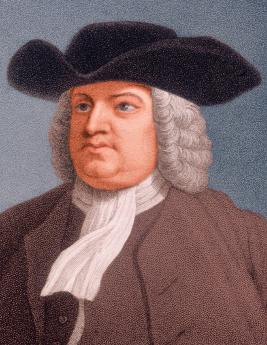
|
| William Penn |
The Proprietorship of West Jersey is pretty much unchallenged as the oldest surviving stockholder corporation in America. A number of points could be made about this creation, but an essential one is that Penn had very few existing models to work from. Nowadays, there are thousands of corporations in existence all over the world, many of them started by men of very little education or notable intelligence. Now that the subject has been mentioned, I can confess that I started three of them, myself. As I recall, it required only an hour's visit to a lawyer's office, for an agreed fee of $500 for each one of them, and after a two-week delay, I was said to be in business.
By contrast, consider Penn's problem. He had to conceive of the idea, and decide to go forward with it in spite of probably having almost no association with any other corporation, and probably without any assistance from any lawyer who had useful experience. While it is unlikely that he designed the modern corporation, or even contributed many useful design ideas, it is also likely he was so unaware of the known features of corporate design that he was nearly in the position of re-inventing this wheel if he expected it to succeed.
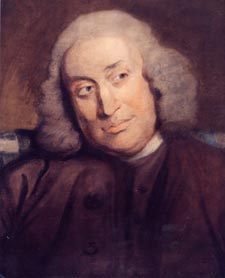
|
| Samuel Johnson |
Nowadays, a lot of entrepreneurs are in a similar state of innocence about corporate structure, but the models exist and the rules have been made and tested. An hour's conference with an accountant and a lawyer is all that is needed to avoid a million pitfalls, simply setting out on a well-trodden path. A modern businessman may go to business school and emerge with the complaint that he was not taught anything very useful, but that is far from the case. An entrepreneur doesn't need to know much about accounting, or corporate law, or tax law, or personnel management. But he does need to know that he needs the services of an accountant, a lawyer, a tax expert, and an office manager. These experts exist and provide their services as a reliable package. Back in the Seventeenth century, those professions didn't exist, and it was scarcely common knowledge that the corporation couldn't function without a number of working parts. The skill of supervision, some concept of how to find and manage capable subordinate leaders, how much to pay them, all fell to the pioneer to discover. In Penn's case, he had to have a reliable organization in order to manage, even to police, the day-to-day complexities of a staff of people going about their duties, while he went about his own. His personal chores included making personal arrangements with the King of England to acquire what has become three states: New Jersey, Pennsylvania, and Delaware; it required negotiations with the Indians, and with New York, Maryland and Virginia about their disputes with him. He had to organize the Assembly, deal with the major stockholders, and worry about wars and uprisings three thousand miles away.
As Samuel Johnson observed about a dog walking on two hind legs, the remarkable thing was not that he did it well, but that he did it at all.
SEPTA's Long Term Planning
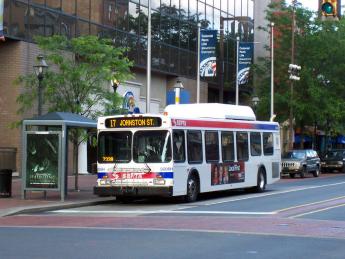
|
| Septa |
Byron S. Comati, the Director of Strategic Planning and Analysis for SEPTA (Southeastern Pennsylvania Transportation Authority), kindly gave the Right Angle Club an inside look at the hopes and plans of SEPTA for the near (five-year) future. Students of large organizations favor a five or six-year planning cycle as both short enough to be realistic, and long enough to expect to see tangible response. If plans continuously readjust to fit the five-year horizon, the concept is that the organization will move forward on these stepping stones, even accounting for setbacks, disappointments, and surprises. Furthermore, a serious level of continuous planning puts an organization in a position to react when funding opportunities arise, such as the sudden demand of the Obama Administration that economic stimulus proposals be "shovel ready."

|
| The Silverline V |
So, SEPTA is currently promoting five major expansions, based on the emerging success of an earlier plan, the Silverliner V. Silverline is a set of 120 shiny new cars, built in Korea on the model of electrical multiple units, which are expected in Spring 2011 to replace 73 cars or units which were built in 1963. Obviously, 120 are more expensive than 73, but they are more flexible as well. And less wasteful; most commuters are familiar with the model of three seats abreast which unfortunately conflict with the social preferences of the public, tending to make the car seem crowded even though it is a third empty. When a misjudgment like this is made, it takes fifty years to replace it with something better. For example, there's currently a movement toward "Green construction", which is acknowledged to be "a little bit more expensive". The actual costs and savings of green construction have yet to become firmly agreed on, so there's an advantage to being conservative about what's new and trendy in things that take fifty years to wear out.

|
| Septa Regional Map |
Four of SEPTA's five major proposed projects are in the Pennsylvania suburbs. New Jersey has its own transportation authority, and Philadelphia is thus left to struggle with the much higher costs of urban reconstruction assigned to its declining industrial population. And left unmentioned is the six hundred pound gorilla of the transportation costs of new casinos. A great many people are violently opposed to legalized gambling, and even more upset by the idea of crime emerging in the neighborhoods of gambling enterprises. Even the politicians who enacted this legislation are uncomfortable to see the rather large expenditures which will eat into the net revenue from this development. Nevertheless, if you are running a transportation system, you have an obligation to plan for every large shift in transportation patterns, no matter what you might think of the wisdom of the venture. The alternative is to face an inevitable storm of criticism if casinos come about, but without any preparation having been made for the transportation consequences. At present, the public transportation plan for the casinos is to organize a light rail line along the Delaware waterfront, connecting to the rest of the city through a spur line west up Market Street; it may go to 30th Street Station, or it may stop at City Hall. That sounds a lot like the present Market-Frankford line, so expect some resistance when the cost estimates are revealed. Because all merchants want to have the station stops near them, and almost no residents want a lot of casino foot-traffic near their homes and schools, expect an outcry from those directions, as well. It would be nice to integrate this activity with something which would revive the river wards, but it seems a long stretch to connect with Wilmington on the south, or Trenton on the north.
The planned expansions in the suburban Pennsylvania counties will probably encounter less controversy, although it is the sorry fate of all transportation officials to endure some hostility and criticism for any changes whatever. Generally speaking, the four extensions follow a similar pattern of building along old or abandoned rail lines, following rather than leading the population migrations of the past. When you are organizing mass transit, there is a need to foresee with some certainty that there will be a net increase in commuters in the region under consideration. The one and two passenger automobile is a much more flexible instrument for adjusting to the growth of new development, schools, retail, and industry. Once the region has become established, there is room for an argument that transportation in larger bulk is cheaper, cleaner or whatever.
The Norristown extension follows the existing but underused rail connections to Reading. Route US 422 opened up the region formerly serving the anthracite industry, but now the clamor is rising that US 422 is impossibly crowded and needs to be supplemented with mass transit.
The Quakertown extension follows the rail route abandoned in 1980 to Bethlehem and Allentown, although the extension is only planned as far as Shelly, PA.
The Norristown high-speed extension responds to the almost total lack of public transportation to the King of Prussia shopping center, and will possibly replace the light rail connection to downtown Philadelphia.
And the Paoli extension follows the mainline Amtrak rails as far as Coatesville.
All of these expansions can expect to be greeted with huzzahs by developers, land speculators, and newsmedia, but resistance will inevitably be as fierce as it always is. Local business always fears an expansion of its competitors; the feeling is stronger in the suburbs than the city, but local business always resists and local politicians always follow their lead. To some extent, the suburbs have a point, since radial extensions are usually much cheaper to build than lateral or circumferential transportation media; bus routes are the favored pioneers in connecting one suburb with another. Therefore, the tendency in these present plans remains typical by threatening the suburbs with a need to travel toward the center hub, then take a reverse branch back in the general direction of where they started, in order to go a short distance to a shopping center or school system. The two main river systems around Philadelphia interfere with the construction of big "X" routes from the far distance in one direction to the far distance in the opposite direction. Euclidian geometry makes the circumferential route elongate as the square of the radius. And jealousies between the politicians in three states create rally foci for the special local interests which feel injured. Since it seems to be an established fact that the proportional contribution to mass transportation by the surrounding suburbs of Philadelphia is traditionally (and considerably) lower than the national average, a political reconciliation might do more for the finances of SEPTA than any federal stimulus package could do. For such reconciliation, a few lateral connections in the net might pacify the suburbs enough to justify the extra cost. Unfortunately, the main source of unjustified cost in regional mass transit is the high wage and benefit levels of the employees, a situation inherited from the old days when commuter rail was part of the stockholder-owned regional railroads. Just as featherbedding was the main cause of the destruction of the mainline railroads, health and pension benefits threaten the life of mass transit. In the old days, local governments acted as a megaphone for union demands. So the railroads just gave the commuter system to the local governments, and let them wrestle with the unions themselves. Since the survival of the urban region depends on conquering this financial drain, the problem must be gradually worn down. But it has been remarkable how long the region has been willing to flirt with bankruptcy rather than bite this bullet.
If anything, this friction threatens to get worse. In 2009, for the first time, a majority of union members in America -- work for the government, the one industry which thinks it cannot be destroyed by losing money. True, SEPTA is not exactly a government function, but it has enough in common with a government department to arouse suburban voters, who regularly refer to it as an arm of the urban political machine. SEPTA isn't too big to fail, but there exists little doubt that government at some level would probably try to bail it out if it did.
WILLIAM BLATHWAYT'S DRAFT OF THE CHARTER OF PENNSYLVANIA
Charles the Second, by the grace of [God] King of England, Scotland, France, and Ireland, Defend[er] of the Faith & Co. To all to whom these presents shall come, greeting.
Whereas our truste[d] and well beloved subject William Penn Esquire, sonne and heire of Sir William Penn, deceased, out of a comendable desire to enlarge our English Empire and promote such usefull comodities as may be of benefit to us and our dominions, as also to reduce the Savage Natives by Gentle and just manners to the Love of civill Society and Christian Religion, hath humbly besought leave of us to transport an ample Colony unto a certaine Country hereinafter described in the parte of America not yet cultivated and planted. And hath likewise humbly besought our Royall Ma[jes]tie to give, grant, and confirme all the said Country with certaine priviledges and Jurisdicions requisite for the good government and safety of the said Country and Colony, to him and his heires for ever. Know yee therefore that wee, favoring the petition and good purpose of the said William Penn, and haveing regard to the memory and merits of his late Father in diverse services and particularly to his conduct, courage, and dircctione {discretion} under our dearest Brother James, Duke of Yorke, in that signall Battle and Victorie fought and obtained against the Dutch Fleet comanded by [illegible word deleted] {The}2 Heer Van Obdam in the yeare 1653. In consideration thereof of our speciall grace, certaine knowledge, and meere motion have given and granted and by this our present Charter for us our heires and successors, doe give and grant unto the said William Penn his heires and Assignes
All that Tract or part of Land of {in}4 America with all the Islands therein contained as the same is bounded on the East by Delaware River from Twelve miles distance Northwards of Newcastle Towne unto the Three and Fortieth degree of Northerne Latitude, If the said River doth extend soe farr northwards. But if the said River shall not extend soe farr northward. then by the said River soe farr as it doth extend, and from the Head of the said River, the Eastern-bounds are to be determined by a Meridian Line to bee drawne from the head of the said River unto the said Three and Fortieth degree; The said Lands {to} extend westward Five degrees in longitude to be computed from the said Eastern bounds, and the said Lands to be bounded on the north by the begining of the Three and Fortieth degree of northerne Latitude and on the South by a Circle drawne of {at}5 12 miles distance from Newcastle northwards6 and westwards, unto the begining of the Fortieth degree of northerne Latitude, and then by a streight line westwards to the limit of Longitude above mentioned7
Wee doe alsoe give and grant unto the said William Penn his heires and Assignes The free and undisturbed use and continuance in and passage into and out of all and singular Ports, Harbours, Bayes, Waters, Rivers, Isles and Inletts belonging unto and {or} leading to and from the Country or Islands aforesaid And all the Soyle, Lands, Feilds, woods, underwoods, mountaines, hills, Fenns, Isles , Lakes, Rivers, Waters, Rivuletts, Bayes, and Inletts scituate or being within or belonging unto the Limitts and bounds aforesaid together with the fishing of all sorts of Fish, whales {sturgeons} and all Royall and other Fishes in the Sea, Bayes, Inletts, waters, or Rivers within the premisses and the Fish therein taken And alsoe all veines Mines and Quarries as well discovered, as not discovered, of gold, silver ,gemms and other {pretious} stones and all other whatsoever bee it of stones, mettalls, or of any other thing or matter whatsoever found or to be found within the Country Isles or limitts aforesaid
And him the said
In Witnesse whereof We have caused these Our Letters to be made Patents, Witness Ourselfe at Westm1 the 4th day of March, In the three and Thirtieth yeare of Our Reigne, 1680/180 Pigott81
Note: Footnotes, edits and insertions from Richard P. Dunn and Mary Maples Dunn, "The Papers of William Penn", U. of PA Press, 1982
Clarifying punctuation and emphasis by George Ross Fisher
Go to Delaware, Elephants?

|
| Dead Elephant |
No one is supposed to know where elephants go to die, but if they are smart as people say they are, my suggestion is to search for dead elephants in the state of Delaware. Most taxes, and estate taxes, in particular, are considerably lower, there. At least this was the message Christopher J. Topolewski, Esq. conveyed to the Right Angle Club recently. His firm, West Capital Management, has prepared a table comparing the taxes in the three states that come together at the southeast corner of Pennsylvania, which for residents of the Philadelphia area are within easy commuting distance of each other. Although Delaware has a marriage penalty (one couple is taxed more than the sum of two singles), it has no estate tax at all, no sales tax, and a property tax rate only half that of Pennsylvania, only a quarter of that in New Jersey. For residents of New Jersey, there is almost no tax which is not lower in Delaware, because but ex-Pennsylvanians would then have to be careful to die or cohabit since ordinary income tax and capital gains taxes are higher in Delaware than Pennsylvania. If you must die (and who doesn't?), go die in Delaware.
This was a situation specifically contemplated as a way to discipline greedy state governments, by James Madison when he was formulating the U. S. Constitution. And there is evidence it is working. By happenstance, I once encountered an official of New Jersey taxation, who told me that 43% of New Jersey taxes are paid by 1% of the population. And that 1% was moving out of the state as fast as it could. If it does, the other 99% of New Jersey residents will find their taxes rising by 43%. West Capital reports that taxation as a percent of income is 1.23% in Delaware, 3.46% in Pennsylvania, and 5.82% in New Jersey, suggesting that a selective flight of the 1% would raise the state taxes of everyone else by 43%, and thus make state taxation as a percent of lowered average income rise to roughly 20%. Relating total income to total tax revenues would be an even better way to detect hidden indirect taxes, such as overtaxing utilities in the knowledge it will be passed on to the consumer. I recently discovered that a few years ago, the Legislature got tired of hearing complaints about local taxes, so they transferred half of the local taxes to the state tax. That's pretty much like taking it from one pocket and putting it into another because now all the hubbub is about state taxes. Armed with even partial information, it becomes easier to understand why New Jersey would evict a governor who had been Co-chairman of Goldman Sachs, during a financial crisis. If a financial whiz can't change this, maybe it requires a meat ax.
This is a time of growing restlessness about public spending, and Tea Party revolts are likely to accelerate during the remaining nine months before the next election. The conjecture is growing about a coming deadlock between a Republican Congress and a Democratic President, lasting at least two more years. What might emerge from a strong third party congressional delegation is too arcane to discuss. But at least the Republicans who leave can console themselves they are selectively raising the taxes of Democrats.
It seems almost inconceivable that professional politicians would demonstrate such a forest of tin ears as to let this happen, but the rest of Mr. Topolewski's talk just heated up the fire. His long-scheduled talk was designed to give guidance about the new estate tax laws, but he found himself confounding his audience with the news that there are no new estate tax laws; in fact, there will be no estate tax laws at all after this year unless they emerge from the congressional gridlock we already have. Which apparently will be followed by a gridlock we can scarcely imagine. Imagine asking your lawyer to write a will which straddles the contingencies that there will be no law, that there might be a continuation of the present one, or there might be some new law of quite uncertain wording. One of the suggestions offered is to allow your executor the discretion to accept or disclaim certain hypothetical provisions.
And that brings up an old story. William Penn was the largest private landowner in the history of America, possibly the whole world. He had a trusted agent, who gave him an enormous pile of papers to sign. A busy rich man like Penn is regularly confronted with a discouragingly large number of routine legal documents to sign. So, Penn signed them all, not noticing that one of the various papers in the pile gave the entire state of Pennsylvania -- to his agent. The outcome of the ensuing uproar was that Penn spent six years in debtors prison.
School Tax Seldom Equates to School Spending
 |
| Little Red Schoolhouse |
As this blog went to press, voters throughout South Jersey had just gone to the polls to vote for school boards and school budgets. Or, at least they had the opportunity to do so, but mostly 15% of eligible voters actually troubled to vote. Meanwhile, school officials chewed their nails in apprehension that many budgets would be disapproved by the taxpayers, and then what? As it turned out, Haddonfield and Moorestown approved their budgets, but over half of the 700 school districts of the state did not. The voters wanted to send a message they were angry about property taxes, and the seemingly related fact that over half of school employees are not teachers. Some of them mistakenly believe county taxes have something to do with schools. If they had really understood the situation, they would have been angry that the size of their local school budget has comparatively little to do with the level of their total tax burden.
Meanwhile, voters with children had been agitating to support the budget or even raise it, even if it raised their taxes; but empty nesters were urging each other to go vote down this budget because their taxes were already excessive. The parents of schoolchildren urged the empty nesters to move somewhere else where they couldn't vote down school budgets. Actually, however, if more empty nesters moved in, property taxes would go down without affecting the school budget, because empty-nesters pay taxes without using the schools. Both groups are quite misguided, however, because raising or lowering school budgets would probably have very little effect on overall taxes. Even school officials failed to make their best case to the public because they misunderstood the tricky way taxes are arranged. They defend every budget by saying it is already cut to the bone. Since it presently makes relatively little difference to overall taxes whether the budget is cut or increased, that's not useful in persuading empty nesters. Budget cutting does make a lot of difference to the quality of education, however, but that's only half of the facts, not a balanced one. The moral of all this is that the voters better get educated about the Jersey political scene, before their children lose the chance to get educated at all.

Since I'm an empty nester, I am pretty familiar with the empty-nest viewpoint. Three of my friends have told me they moved to neighboring suburbs in order to lower their tax burden; they undoubtedly know what they are talking about. But no one I know is able to reconcile that fact with the equally certain fact that Haddonfield has the lowest spending on education, per pupil, in the southern half of the state. In fact, they don't care, because they know that local school taxes are significantly lower almost everywhere else, and they don't have to explain why. School officials should be more concerned with explaining their rank in per-pupil spending compared with other districts, but they are driven to make cuts in service where ever they can in order to produce a leaner budget for the voters. They too, seem oblivious to the fact that voter anger won't be soothed for long by their budget cutting because it won't affect overall taxes. Taxes are what people are mad about, but they must consider all of them, and understand that as one goes down, the other will probably go up. In another article, we discuss how they mysteriously go up even more. A more sophisticated view would be that in addition to concern about eradicating poverty in the long run, residents of New Jersey are increasingly driven by the need to get their children into better quality colleges. They would like to improve secondary education to do so but are hampered by the relative unavailability of high-quality colleges in the state. Some of this has to do with the recent tendency of Princeton and Rutgers to seek a geographical diversity of students. But to be cynical about it, the development officers of those colleges know that major donors are to be found in Texas and California. In New Jersey, the majority of income taxes are paid by 1% of the population, and that !% are fleeing the state to avoid its heavy income and estate taxes, just as fast as they can. This is the group that tends to donate most heavily to college improvements, and New Jersey colleges are suffering from their flight. That argument may well be hard to sell in Newark and Camden, but it has a major indirect effect on business creation and employment in the state as a whole.
To return to basics, New Jersey school spending is governed by the Abbott decision, which happens to have been written by a friend of mine, who is a fine, smart, well-intentioned jurist. So-called Abbott districts were found by the courts to have significantly underfunded schools, to the point where it seemed an important public issue that the wealthier parts of the state must help these underprivileged kids get an adequate education. Whether improving the school system in their districts would reduce the crime rate, or welfare rate, among these children in later life, was not then known, but subsequent experience does not give it much support. Mainly, it wasn't so much trying to reduce public expenditures in the long run that was behind the Abbott decision, as the feeling it was the duty of a prosperous society to give deprived kids an even break, a sort of penance for success. Accordingly, state school tax revenues were rearranged in an effort to make the per-pupil spending for education approximately equal in all districts, and particularly in the most deprived areas, the Abbott Districts. The first clear sign that something unintended was happening is shown in the accompanying table, indicating that spending in the Abbott districts was in fact now about fifty percent greater than in prosperous nearby suburbs. Equality might be all right, but fifty percent greater was probably not acceptable to the taxpaying public. Just how that paradox gets accomplished in Trenton is not yet clear, but the discomfort level about it is heightened by noticing there is generally an inverse relationship between the spending per-pupil and the perceived quality of the educational product. You might compare drop-out rates, crime rates, SAT scores or whatever, but public perception is not likely to overcome data seeming to show that the more you spend, the worse the education. One wag commented that the data also seems to show that the further you get from the Delaware River, the lower the educational spending gets; that relationship is also more or less linear. So, what matters here is opinion, and the prevailing opinion is emphatic that this data is upside down. The Abbott decision that school spending must be equalized but is actually greater accounts for much of this funny data, but in addition there almost has to be some overlooked secondary factor which exaggerates the Abbott effect by as much as 50% beyond equality.
Even the education industry has an incentive to explain at least and possibly to correct, this disparity. Because in politics while you can prove almost anything with statistics, it is quite seductive to imply that this data proves that extra educational spending hurts the quality of education, at least above a certain level. The education industry wouldn't be wise to let that sort of accusation go unanswered, even if it comes as a wisecrack. The real empty-nester accusation, sorry to say, is that "My school taxes are way too high. They not only do me no personal good but are not helping underprivileged children, either." The consequence is empty-nesters are driven out of town and out of state, making taxes higher for everyone else. It could take decades to undo this damage with an angered public, so everybody better get to work explaining and correcting the problem.
Pennsylvania Likes Private Property Private
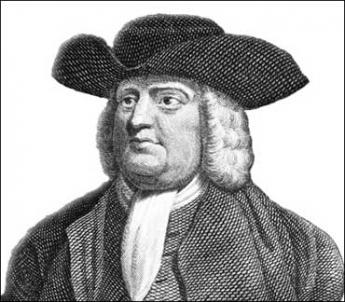
|
| William Penn Holding his Charter |
William Penn was the largest private landowner in America, maybe the whole world. He owned all of Pennsylvania, with the states of Delaware and New Jersey sort of thrown in. Although he and his descendants tried actively to sell off his real estate from 1684 to 1783, they still held an unsold three-fifths of it at the conclusion of the Revolutionary War, which they were forced to sell to the state for about fifteen cents per acre. This bit of history partly explains both the strong feeling this is private, not communal, land despite the existence of 2.3 million acres of the state forest system, which is affirmed right alongside the rather inconsistent feeling that raw land is somehow inexhaustible. Early settlers regarded the center of the state as poor farmland, particularly when compared with soil found in Lancaster and Dauphin Counties, or anticipated by settlers going to Ohio and Southern Illinois. A complimentary description is that glaciers descended to about the middle of Pennsylvania, denuding the northern half of topsoil which was then dumped on the southern part as the glaciers receded. Even today, farmers tend to avoid the northern region if they can, reciting the ancient advice from their fathers that "Only a Mennonite can make a go of it, around there."
So, lumbering had a century-long flurry in Central Pennsylvania, exhausting the trees and moving on. But that only related to the top layer of soil; beneath it lay anthracite in the East, and bituminous coal in Western Pennsylvania, supporting the steel industries of the two ends of the state with exuberant railroad development. Even today worldwide, hauling coal is the chief money-maker for railroads. The resulting availability of rail transport promotes the location of heavy industry near coal regions; the 20th Century decline of coal demand ultimately hurried the decline of heavy industry in the state by impairing the railroads.
Beneath all this lie the aquifers, porous caverns of fresh water. And beneath that, largely unsuspected for two centuries, lie the sedimentary deposits of a huge inland sea, compressed into petroleum which evaporates into natural gas. All of this is held by huge deposits of semi-porous shale rock, now mostly 8000 feet deep, stretching from Canada to Texas and called the Marcellus shale formation. If it can be economically recovered, there is more natural gas than in Arabia, and there is a similar formation along the near side of the Rocky Mountains in Colorado, stretching up to the Athabasca tar sands in Canada. There is another similar formation in France underneath Paris. No doubt, we will find the whole world has similar huge deposits for which the main problem has always been: how do you get it out?
There's another question, of course, of who owns it. Those who clearly do not own it maintain that everyone owns it. In the western world, most particularly in America, it is our firm belief that if you live on top of it, you own it. Since it is expensive to extract, quarrels like this are usually settled by purchasing mineral rights from the surface owner, who generally could not possibly extract it by himself. Those who assert they have a conflicting right to it because it belongs to everyone can expect belligerent resistance. At the present time when America faces a critical fifteen year period of dwindling oil supply, ultimately relieved by perfecting alternative energy sources, there is too little time to achieve consensus for any other governance theory. The problem which could possibly gain enough traction to interfere is the issue of potential damage to others which might result from the extraction of this subsurface treasure. Because of the apparent urgency of a decision to extract or go elsewhere to extract, the best we can hope for is some fairly rough justice.
Selection of Constitutional Rights for the Bill of Rights
When the First Congress convened in 1789, it confronted more than a hundred proposed amendments to the Constitution, largely stirred up by supporters of Thomas Jefferson who feared any strong government would be too similar to the monarchy we had just discarded. Essentially, Congress dumped these noisy dissatisfactions into the lap of James Madison who had largely constructed the Constitution, constituting a committee with Madison as its chairman. The first ten amendments emerged together as a package, enabling trade-offs and compromises; all subsequent amendments have been taken up individually, one by one. Since members of the First Congress and the Constitutional Convention were largely the same people, much of the durability of the Constitution can be traced to them. And therefore, the tendency of the nation to feel its way into a new idea, sometimes retreating, sometimes plunging ahead, has migrated into the Supreme Court. This result was probably accidental, but nevertheless, the power of the Supreme Court was greatly strengthened by default; it alone can tip-toe out of a Constitutional tangle created by momentary impulses.
After winnowing out duplicates and half-baked ideas, Madison's committee condensed the wildly disparate proposals into ten amendments, supposedly limited to ten by alluding to Ten Commandments which were sufficient for Moses. Three main principles emerged. The Constitution should be parsimonious in granting divine, or natural, rights because what Nature's God had granted was hard to tell but what the judiciary could enforce had limits. But thirdly, granting even these few self-evident rights to slaves might tear the Union apart.
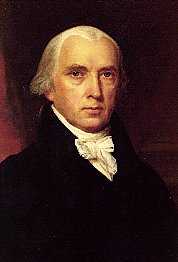
|
| James Madison |
So Madison's committee narrowed the legally enforceable human rights to a handful, selecting only those so self-evident they could withstand the tensions of enforcing them. When contemplating the problem of extending mandated rights to slaves, however, there was no obvious solution at all. That made it easier to limit the Federal Government to enforce a handful of enumerated powers, leaving all unspecified matters to the state legislatures to enforce if they could. The boundary might shift with time, but without saying so, the Bill of Rights kept the Union out of the one main foreseeable problem, of slavery. The unmentioned conflict between universal rights and slavery defaulted to the individual states, or to whomever, but definitely not to the Federal Government.
That tap-dance held together for nearly a century, and then it didn't and we had a Civil War. During all that time, the balance of power was steadily shifting from the confederated states to the centralized federal government, and after the Civil War, it shifted still more. However, the southern confederation may have been defeated, but it was not exactly reconciled, nor were the former slaves exactly equalized. Their current drift toward entitled dependency was particularly unexpected.
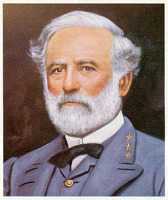
|
| Robert E. Lee |
Many post-war expedients were tested to heal these wounds, some of them useful and some, like forcible Reconstruction, disruptive. Two expedients opened new wounds and distracted the country for a century. The first was the intentional weakening of the quality and effectiveness of state governments, to the point where it can now be asserted that state government is the weakest part of our whole government structure. Those who prized universality and efficiency, or who sought greater international power, regarded state legislatures as a hindrance; just look who got us into a Civil War. Consequently, corruption and ineffectiveness were privately tolerated in state legislatures, because discrediting state governments made them easier to ignore. Repairing the resulting imbalance in our overall system is now growing to be one of our greatest problems. Almost no one remembers this was the price of a ratified Constitution, so increasingly that excuse is futile. In fact, in the thirty-seven more recent states to be admitted to the Union, it is not even accurate.
The second response to a sluggish equalization of racial rights was invented by Madison himself. He felt that the ability to migrate from one state to another would discipline any temptation of a state to misbehave. If your state taxes you unfairly, move. If your state government gets too corrupt, first try to throw the rascals out, but in the last extremity, go somewhere else. This concept has worked magnificently in maintaining national interest rates with appropriate local modifications, and we are about to learn whether it will adequately restrain the half dozen states who have pushed the limits of taxes and borrowing. In the case of former slaves, massive out-migration took a century to happen and then it happened all at once, just after World War II. Wave after wave of slave descendants from the rural South got on buses and came to the heart of Northern cities. Overwhelming the ability of weakened local governments to cope, city institutions disintegrated, particularly the public school and justice systems. The consequence is continuing disarray in Washington DC, Baltimore, Detroit -- and Philadelphia -- together with a host of smaller cities like Reading, Newark, Paterson, Wilkes-Barre, and many others, in all of which the unsustainable wave of immigrants added to local industrial and civic problems which had other causes. So now we have two new problems, weakened state government and disruptive migrations, which in other circumstances tended to mitigate each other, but now increasingly make each other worse. Someone must take hold of the issue that applying Madison's concept of competitive states has created a strong state disincentive to deal with poverty.
It took a century for Madison's scheme to break down into war, and Lyndon Johnson was surely quite right to feel a century was long enough to tolerate the disunity of the Civil War. If he could not make people love one another, at least he could enforce the law. State governments were not doing it, so he whipped the Congress into taking it on as a Federal duty, by passing the Civil Rights Act. Half a century has passed with some progress, but surely not an end to the disunity. State governments have been further weakened, but mass migrations have calmed down. In another half century, the slavery issue and its consequences may fully subside. Meanwhile, the reaction of extending federal power continues, now threatening to extend to the medical profession, the finance industry, the automobile industry, and the Internet. Our Constitution continues to survive more or less intact into its third century, and we grow increasingly wary of tinkering with it as we watch most other nations fail to achieve its essential quality. Which is, it survives. Aside from the Bill of Rights and some technical tweaks, there have only been five amendments of any substance. Meanwhile, new federal statutes and regulations grow by a hundred ponderous volumes a year.
Ms. Mayor

|
| Mayor Letitia Colombi |
One of the great treasures of Haddonfield is a letter from Benjamin Franklin to the husband of Elizabeth Haddon, to the effect that she was the most forceful woman of the region. Indeed, it is part of the tradition of the Haddonfield Meeting of Friends that the men's meeting and the women's meeting met is separate rooms and kept separate minutes at that time. Elizabeth was the clerk of the women's meeting, and while the men's meeting would sign the minutes as "The Meeting on Stoy's Landing" or the "Meeting near Cooper's Creek" or something else topical, the minutes of the women's meeting were consistently signed in a single way. They were from the meeting in Haddonfield. Ultimately, everybody gave up and named the town Haddonfield.
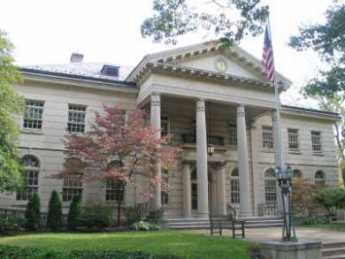
|
| Haddonfield Borough Hall |
Without being able to recall a single other woman who was Mayor of the town, it does seem appropriate that its present mayor is a lady and a forceful one at that. Letitia Colombia has been on the Borough Board of Commissioners for nearly twenty years and seems likely to remain Mayor for as long as she wishes. In the tradition of forcefulness, a number of old timers in the town remember when she first got elected by knocking on every door in the town, and then marched down the main street in the July 4th parade, wearing high-heeled red shoes.
The Right Angle Club was curious to see what this was all about, and her performance was a brilliant demonstration why politics is a full-time sport of every town in Texas. Odessa, her home town, is a few miles from Midland-where-the-oil-comes from, and she and Laura Bush probably attended the same high school. They are certainly both members of the same school.
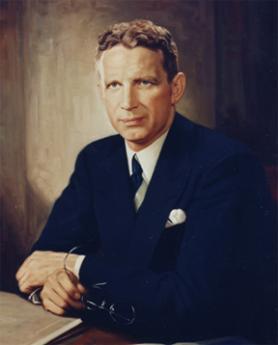
|
| Al Driscoll |
In many ways it was Al Driscoll who as Mayor asked why Haddonfield couldn't be like Princeton, where he once went to school. The answer he got was to change the zoning ordinances and then just wait thirty years. It worked fairly well, although Haddonfield got a parking and traffic problem along with the good features of looking like Princeton. But it wasn't Tish's way; one might say it wasn't the Texas way. She hired some consultants at a cost of $125,000 to work out a detailed plan for changing Haddonfield for the better, and then followed the plan. It included a list of the kind of stores you do and don't want in a town of this type and the general strategy of attracting them. The zoning laws are sort of like Princeton's, but different enough to matter. Year by year, you can see the town change from a sleepy little place into a lively place to be. There are no empty lots in Haddonfield; to change the town, you have to remodel everything, house by house. On a summer evening, there are throngs of people on the sidewalks downtown, entertained by three or four street bands, wandering up and down at the sidewalk sales of the merchants. Haddonfield is "dry" in the sense that liquor sales are prohibited; that policy was recently reconfirmed by a four-to-one vote. But it hasn't kept restaurants away. The residents like BYOB a lot, and fully understand what it means.
Taxes in Haddonfield are, well, generous. But Haddonfield gets no state school aid; its schools are much like a thirty-million-dollar private school system, run by locals to local taste. And a quarter of our taxes go to Camden County. Tish boldly announces we get nothing whatever for those taxes in return. With a slogan like that, it's pretty hard to doubt she's a Republican.
REFERENCES
| Heroines of Haddonfield 1713-2013: Christie Castorino: ISBN: 978-1-4836-2719-9 | Xliris |
Adrift With The Living Constitution
.jpg)
|
| Senator Joe Sestak |
Former Congressman Joe Sestak visited the Franklin Inn Club recently, describing his experiences with the Tea Party movement. Since Senator Patrick Toomey, the man who defeated him in the 2010 election, is mostly a Libertarian, and Senator Arlen Specter who also lost has switched parties twice, all three candidates in the Pennsylvania senatorial election displayed major independence from party dominance, although in different ways. Ordinarily, gerrymandering and political machine politics result in a great many "safe" seats, where a representative or a Senator has more to fear from rivals in his own party than from his opposition in the other party; this year, things seem to be changing in our area. Pennsylvania is somehow in the vanguard of a major national shift in party politics, although it is unclear whether a third party is about to emerge, or whether the nature of the two party system is about to change in some other way.
For his part, Joe Sestak (formerly D. Representative from Delaware County) had won the Democratic senatorial nomination against the wishes of the party leaders, who had previously promised the nomination to incumbent Senator Specter in reward for Specter's switching from the Republican to Democratic party. For Vice-Admiral Sestak, USN (Ret.) it naturally stings a little that he won the nomination without leadership support, but still came reasonably close to winning the general election without much enthusiasm within his party. He clearly believes he would have beaten Toomey if the party leaders had supported him. It rather looks as though the Democratic party leadership would rather lose the election to the Republicans than lose control of nominations, which are their real source of power. Controlling nominations is largely a process of persuading unwelcome contenders to drop out of the contest. Sestak is, therefore, making a large number of thank-you visits after the election, and clearly has his ears open for signs of what the wandering electorate might think of his future candidacy.
America clearly prefers a two-party system to both the dictatorial tendencies of a one-party system, as well as to European multi-party arrangements, such as run-offs or coalitions. A two-party system blunts the edges of extreme partisanship, eventually moving toward moderate candidates in the middle, in order to win a winner-take-all election. Therefore, our winner-take-all rules are the enforcement mechanism for a two-party system. Our deals and bargains are made in advance of the election, where the public can express an opinion. In multi-party systems, the deals are made after the election where the public can't see what's going on, and such arrangements are historically unstable, sometimes resulting in a victory by a minority fringe with violently unpopular policies. In our system, a new third-party mainly serves as a mechanism for breaking up one of the major parties, to reformulate it as a two-party system with different composition. Proportional representation is defended by European politicians as something which promotes "fairness". Unfortunately, it's pretty hard to find anything in politics anywhere which is sincerely devoted to fairness.
Going far back in history one of the great theorists of legislative politics was the Roman Senator Pliny the Younger, who wrote books in Latin about how to manipulate a voting system. For him, parties were only temporary working arrangements about individual issues, a situation where he recommended: "insincere voting" as a method for winning a vote even if you lacked a majority in favor of it. Over the centuries, other forms of party coalitions have emerged in nations attempting to make democracy workable. Indeed, a "republic" itself can be seen as a mechanism devised for retaining popular control in an electorate grown too large for the chaos and unworkability of pure town hall democracy. A republic is a democracy which has been somewhat modified to make it workable. Our founding fathers knew this from personal experience, and never really considered pure democracy even in the Eighteenth century.
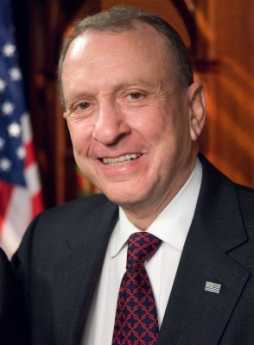
|
| Senator Specter |
The two main actors in shaping the American Republic were George Washington and James Madison. Madison was young, scholarly and largely unknown; Washington was old, famous, and insecure about his lack of academic political education. Both of them knew very well that if Washington really wanted something he was going to have it; what mainly restrained him was fear of looking foolish. But he hated partisanship and conniving, partly as a result of having been the victim of General Mifflin and the Conway Cabal. Washington hated political parties and anything resembling them; Madison was young and uncertain, and briefly surrendered the point. It took about two years of real-life governing for Madison to conclude that political parties were absolutely essential to getting something accomplished. In this, he experienced for the first time those unwelcome "pressures from the home state", with Thomas Jefferson determined to thwart Alexander Hamilton, and Patrick Henry thundering and denouncing any hesitation in going for the jugular vein of opponents. Madison was deeply concerned with making his new nation success and eventually joined Jefferson in the Virginia policy of opposing banks, cities and manufacturing. When Washington saw that Madison was committed to this course, he never spoke to him again. For Washington, honesty was always the best policy, and personal honor is never regained once it is lost. The compromise of 1790 was particularly vexing to their relationship, when Washington's honor and personal finances were used as bargaining chips for moving the nation's capital opposite Mount Vernon on the Potomac River, in return for placating Hamilton and Robert Morris with the assumption of state revolutionary war debts.
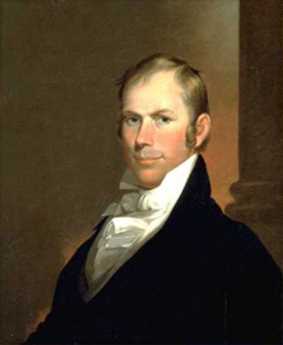
|
| Henry Clay 1811 |
Legislative partisan politics took a violent turn in 1811 when 34-year old Henry Clay was elected to his first term as a member of the House of Representatives. The Senate was less prestigious than the House in those days, and Clay had spent his time as a senator studying the landscape of the House before he made his big move upward. Up until that moment, the role of Speaker was that of mediator and administrator of the rules, partisanship was considered a shameful thing in a Speaker. Young Clay was elected Speaker on the first day of the first session after he moved to the House as a member. Seniority was brushed aside, and this newcomer took over. It takes only a moment's reflection to surmise that a lot of politics had taken place before the House convened. Not only that, but Clay immediately added the power of the Speaker to appoint committee chairmen, to the invisible powers of majority leader. The office of majority leader had not yet been created, but it was not long in emerging that anyone who could assemble enough votes for Speaker was also able to make highly partisan choices for Committee Chairs. Eventually, the seniority system was imposed in part as a reaction to perceived abuses of Speaker power. It is worth a digression to reflect on the role of any seniority system, which as it is clearly seen in labor-management industrial relations, serves to deprive management of promotion power, usually substituting seniority for selection by merit. In the case of the Speaker, the seniority system catapults the power of the Speaker over that of every member of his caucus. To rise in a seniority system for committee chairmen, a member must first be appointed to a desirable committee -- by the Speaker, or by his instructed favorites on the appointment committee. It puts in the hands of the Speaker or his agents the power to humiliate a member by ignoring his seniority; the other members know immediately what that means. To understand the power of this threat, reflect on Woodrow Wilson's famous observation that "Congress in committee, is Congress at work."
Soon after Henry Clay made his dramatic moves, Martin van Buren extended the idea of partisan party politics to the actual election of Congressmen. Much of the hoopla and deceptiveness of subsequent campaigns was invented by Andrew Jackson's vice president. And that included their own deal, in which van Buren worked for Jackson's election in return for a promise that he would be the successor, President. After that came the election of 1848, in which William Henry Harrison was elected as a man born in a log cabin. When, in fact, he had been born in one of the largest mansions in Virginia. That had been approximately George Washington's residence description, too, but it is hard to see Old Stone Face lowering himself to accept any office unless it was offered unanimously.
Compare that with the campaign financing episode which created the urban political machine. The Philadelphia traction king Wm. L. Elkins was narrowly concerned with building streetcar lines along with his business associate P.A.B. Widener; Widener had been a city politician before he got into street cars. One or the other of these two approached the Mayor of Philadelphia with the complaint that it interfered with building streetcar lines to have to bribe every bartender on every street corner. So he made a proposal. It wasn't the money that bothered him, because he could just raise trolley fares to cover it, it was the protracted delays. So, how would it be if the trolley company just delivered a big lump-sum bribe to the mayor? That would give enormous political power to the party boss through the power to distribute or withhold the boodle to party workers. And it would save the trolley company lots of time, while not costing any more than the "retail graft" system. Since then, just about every urban political machine in the country has been largely financed through the macing of utilities.
The downward trend of serial modifications to the Philadelphia Constitution of 1787, should be clear enough without further illustration. If the Tea Parties aren't mad about it, they should be. More likely, however, they are mainly mad about the modern pinnacle of sly tinkerings, plainly displayed on TV during the enactment of the Obama Health Bill. The point was repeated for emphasis in the Dodd-Frank financial bill, in case it is ever claimed to have been accidental. In both cases, 2000 page bills were prepared out of sight and thrust before the Congress with orders to enact them in four hours. If that's a representative government, perhaps we ought to go back to having a King.
Anatomy of an Urban Political Machine

|
| One Big Family |
The Franklin Inn Club meets every Monday morning to discuss the news, and recently it discussed the upcoming local political campaign. The discussion went on for fifteen minutes before a newcomer asked if we were talking about the primary or the general election. The question was met with broad smiles all around because of course, we were talking about the primary. Voter registration is 6:1 in favor of the Democrats in Philadelphia, so the general election is just a required formality. The election, that is, consists only of the Democrat primary; election of the Democrat nominee in the general election is a foregone conclusion. Someone idly remarked on the number of politicians who are blood relatives of other politicians, someone else said that was true of union officers, too. So, skipping from the inside baseball of the election, we took a little time to discuss the anatomy of an urban political machine.
The first step in consolidating control of a city by a political machine is to eliminate the issue of the general election by making the other party's chances seem hopeless. That converts an election which typically turns out 40% of the voters into an exclusively primary election, turning out 20% of the voters, or even less in an off-year. In some "safe" districts a winner needs far less than 10% of the eligible voters to win.
The second step is to run as a prominent member of a local ethnic or religious group, preferably the largest of such groups within the district. If possible, an election is almost assured by being the sole candidate associated with the largest ethnic group. Here's where family connections work for you. If your father held the same seat, or some other family member had been prominent in the district, it helps assure everybody that you are really an ethnic member and not just someone whose name sounds as though it would be. Your relative will know who is important in locally local politics, the members of large families or people are known to be the "go-to guy".
Assembling all that, the final step is to get everyone else who is a member of the ethnic group to drop out of the primary, and to encourage other ethnic groups to field as many candidates as possible, splitting up their vote. Getting other members of your religious group to drop out, consists of having your relative approach them and tell them to wait their turn. The implicit promise underneath that advice is probably next to worthless, unless it is specific and witnessed, and the other fellow's ability to deliver it is credible. If all else fails, the resistant opponent is muscled in some way, verbally at first, and then increasingly threatening. The consequence of this ethnic/religious influence is more involvement in government by clergy than is healthy for either one of them. Now, that's about all there is to achieving permanent incumbency, but the minority party should be mentioned, as well as the flow of money.
It quite often happens that the minority party in the big city, hopeless in its own election chances, finds itself with a Governor and/or Legislature of their party. The patronage of state jobs becomes available to the foot soldiers who have no chance of local election. Much of the wrangling within state legislatures revolves around whether appointive patronage jobs should be lodged in state agencies, or local ones; at the moment, the Parking Authority and the Port Authorities figure prominently as jobs for which a local Republican could aspire. The coin of this trade is maintaining influence in the state nominating process and paying off with increased voter turn-out in elections which have no local effect but may be important at the state or national level. Since party dominance at state and national levels changes frequently, the local machine finds it useful to continue this system. Where they have nothing to lose in local elections, they may even encourage it.
Money is the mother's milk of politics. Except for safe districts no one can get elected without it. And various degrees of corruption provide money to be "spread around" the clubhouse, sometimes to induce people to drop out of primary races, sometimes to console "sacrifice" candidates who run hopeless campaigns just to make the party look good, and sometimes just to enrich the undeserving. The politically connected parts of the legal profession participate a good deal in the flow of funds, sometimes in order to get government legal work, sometimes to obtain judgeships, sometimes to launder the money for clients. One particularly lurid story circulates that professional sports teams are expected to make seven-figure contributions in return for lavish new stadium construction, from which they, in turn, are able to generate various sorts of compensating revenue.
But, as the old story goes, if you eat lunch with a tiger, the tiger eats last.
The Virginian: A Philadelphian Goes West
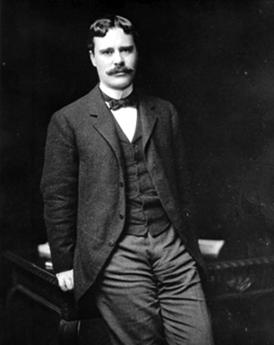
|
| Owen Wister |
Where is the Philadelphia gentleman? According to Owen Wister, that wealthy Philadelphia novelist of the late 19th century, a true gentleman is found on the frontier. He rides horses, brands cattle. He is a cowboy. Wister is credited with creating this great American archetype, now so familiar from hundreds of movies, in his novel, The Virginian: A Horseman of the Plains. Published in 1902, the novel documents the experience of a sensitive young Philadelphian traveling through the still unformed West, where he meets the American nobleman. Wister originally intended this book to be the first of a series of four charactrizations of the types of Americans. A second, about Baltimore, was published, but after that, the fame of his brilliant first novel swept his career in other directions. He seems to have originally intended to describe Virginians more than cowboys, but it's hard to know where his original intention would have carried him.

|
| The Virginian: A Horseman of the Plains |
Here is nevertheless a true classic. Using charmingly archaic language, Wister paints a landscape of sky and wild forests. His narrator speaks to the reader with the kind of verbal affection that only flourished in 19th-century literature. With an air of respect and modesty, the narrator introduces the reader to the novel's hero, the "Virginian." A transplant from the American south, this young man is a true Cowboy, a "daydream of glory made flesh" as Wallace Stegner once wrote. Early in the book, he stamps the hero with the line that made it all famous: "When you call me that, smile."
A host of colorful characters swirl around the Virginian as he aspires to social credibility and respect in the West. Western society, as understood through the Virginian's challenges and successes, is run by its own rules and social norms, norms that are heavily based on a largely male code of honor and decency. We learn about the code of the West as our Virginian learns it.
But the West is not only a myth of the American man; Molly Wood, another Easterner adrift in the wilderness, serves as a passionate, complicated love interest for the Virginian. Their relationship serves to contrast the social regulations of the East with the wilderness and abandon of the West. Wister's search for an American gentleman reminds us what it means to go West in search of something pure and new. What he found in the West has resonated throughout American culture for generations.
REFERENCES
| Philadelphia Gentlemen: The Making of a National Upper Class: E. Digby Baltzell ISBN-13: 978-0887387890 | Amazon |
Term Limits, With Exceptions
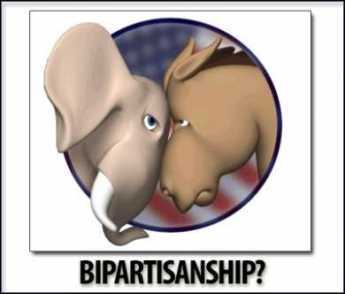
|
Because of precision gerrymandering with computers, congressional incumbents now face very few serious re-election contests. Left with only a few seats in serious contention at each election, the public is dissatisfied by this reduced level of control but does not know how to strengthen it. Turning to the courts, for better rules, probably won't help. Once you fix the number of seats in Congress, give at least one seat to each state, and insist that geographically contiguous districts within a state should all contain the same number of inhabitants, there isn't much wiggle room. That's what then creates the rather strange connection between restraining gerrymandering, and imposing term limits.
Long-term incumbents in a legislative body maintain its institutional memory; their experience is a valuable thing, and recognized gifted veterans should be retained. Although a dozen states have even willingly sacrificed such advantages by imposing term limitations anyway, no one contends that all long-term incumbents are bad. We just have too many of them. The nominating process favors extremists, and they have crowded out the legislators from close districts who must be constantly mindful of current public opinion. Legislative bodies need to have a better balance between the two kinds.
So here's a proposal. Go ahead and impose a reasonable term limit, perhaps eight years. But then allow exceptions for districts which can demonstrate a plausible amount of bipartisanship. If the district in its last election had elected a governor or president of the opposite party from the incumbent congressman, or if one Senator in the state is of the opposite party, these might be reasonable grounds for permitting a district to keep re-electing its incumbent congressman. That might not be enough; perhaps a district should demonstrate two of those proofs of bipartisan spirit. But this would be a start. And a warning.
James Buchanan: The President from Lancaster
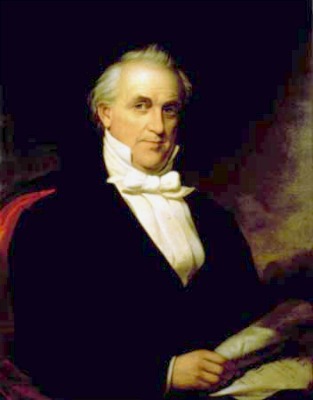
|
| President James Buchanan |
Digby Baltzell (writing in Puritan Boston and Quaker Philadelphia) uses the reputation of President James Buchanan among historians as an example of how poorly Quaker Pennsylvania compares with Puritan Massachusetts, which had four Presidents, all of the men of great stature, while Pennsylvania only had poor Buchanan. To a loyal Pennsylvanian, that's irritating talk, and to it must be added, the only national monument to Buchanan had to be paid for by his own niece, Harriet Lane; construction of even that dinky statue was held up nearly a century by his detractors. It sits in Meridian Hill Park in Washington DC, right next door to where I lived for two years while working at the National Institutes of Health. It seems a little like a personal insult to my little children who played there, that some group or other of historians talk unpleasantly about Pennsylvania's only President.
Buchanan started political life as an elected Federalist, so he seems unlikely to have been secretly sympathetic with secession. A quick look at the map of electoral voting in 1856 shows it was a three-way election, with the peculiarity of the anti-immigration (Know-Nothing) party removing the western part of the country from contention. Essentially, the election was evenly divided between the abolitionist Republicans in the North and the slave states of the South. Swing Pennsylvania and New Jersey toward one side or the other, and you win the election. Buchanan's attraction as Pennsylvania's favorite son won him the Democrat nomination, and hence the election. It's pretty clear that Buchanan politically did owe the South, big-time.

|
| Meridian Hill Park in Washington DC |
That doesn't necessarily make him pro-slavery, but it surely means the South thought he was their best choice. The reasons behind that trace back to his activities on behalf of annexing Cuba while he was Minister to Great Britain. Cuba was bankrupt and having revolutions, and Spain itself wasn't much more effective. These arguments were persuasive to Republicans forty years later when Teddy Roosevelt led the charge and McKinley provided the dubious pretext of the explosion of the battleship Maine. Underneath these jingoist pretexts, the real disputes about Cuba were the Manifest Destiny argument (The United States ought to absorb the whole Caribbean region), and the likelihood that Cuba would be a slave state. The United States House of Representatives had become hopelessly abolitionist as a result of European immigration, so the main hope of the South to stave off abolition of slavery rested with increasing its strength in the U. S. Senate. So the North was favorable to annexing Cuba for Manifest Destiny reasons, while the South was also in favor because of the Senate issue. Buchanan as a politician probably didn't have much trouble seeing himself as a hero by promoting the annexation of Cuba, by force if necessary. The South meanwhile made a decision to seek Senate votes in Kansas and Missouri, since to do so fitted in with another strategy of using their Congressional influence to weaken the military strength of the United States, since that would, of course, be used against them if it came down to a war of secession. It also made a Cuban conquest somewhat more dubious, but in politics, you always have to make choices.
Although it is not much mentioned by historians, that hidden second strategy did, in fact, work out for them. When poor Buchanan got elected and struggled to maintain peace, he found he lacked the military strength to make threatening noises, and indeed General Winfield Scott had to warn him against transferring troops to defend the installations at Fort Sumpter and other Southern locations. This weakening of Union strength is also a largely unmentioned factor in the miserable early performance of the Union armies, early in the Civil War.
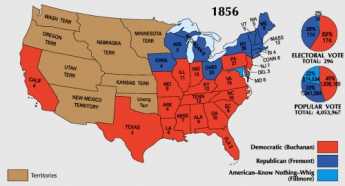
|
| Electoral Vote 1856 |
Both the Abolitionists in the North and the Pro-slavery conspirators in the South presented a vexing pattern of intransigence to the beleaguered Democratic President; after all, they were still American citizens and voters. Although Lincoln in 1860 was not nearly so mindless as many of the other Abolitionist leaders, he was running for President with a clearly anti-slavery program. John Brown was starting insurrections. Whether the Southern hot-heads would blink at the last moment was not clear, but while the pressure on them was that time was running out for their cause, a President mostly elected with their votes still posed an issue that had to restrain them. Time seemed to be on the abolitionist side; no one ever suggests that we would still have slavery in 2011 if there had been no Civil War. If everyone had known we would have 600,000 deaths in that war, the alternative of playing for time would not have seemed so timid.
History is written by the victor, as they say. And then there is the Henry Ford theory of history. Some parts of it, at least, are bunk.
Politics of Employer Hiring Preferences

|
| Interview |
To a remarkable degree, employees tend to remain in either the nonprofit or for-profit sectors of the economy for a lifetime. A prospective new employer naturally wants to know about previous work experience so it is natural enough to poke around for clues. An interviewer may just be jumping around when most questions are fired at a prospective new hire, but this one is hard to dodge.
Whether it is a reasonable position or not, almost everyone on both sides of the interview desk has the impression that for-profit employers prefer to hire people with experience in the for-profit sector, and the reverse is true for non-profits. So far, so good; experience in related fields is an attractive feature. But going considerably beyond favoring prospective employees with related experience, there is a general impression that experience in the other sector has a curse attached, reducing the chances of being hired. When an impression is this widespread, it no longer matters whether it is sensible. Make the wrong answer, and you don't get the job; that's reason enough. And it's equally true in both sectors, so the workforce segregates pretty quickly.
It's plainly true that the for-profit sector votes Republican, the non-profit sector registers, votes and talks pro-Democrat. Since young people usually vote for Democratic candidates, it seems to follow that party-switching is mainly in the direction of young Democrats becoming Republican after a few years of employment, although the reverse is seen when young residents of farm communities move to the city, with college sandwiched in-between.
Going to college may not be exactly like being employed by a college, but it's close enough. The faculty are in a similar power relationship to students as a boss is to employees, in command, but also portraying a role model and parent-figure; it is axiomatic that students emerge from college more liberal-leaning than they entered. It's beyond challenge that college faculties are the most liberal-leaning group in America; their institutional employers are all in the non-profit sector to some degree. As long as government research grants, scholarship grants, construction subsidies (and indirect overhead allowances) continue to dominate the finances of higher education, the allegiance of all colleges and universities will belong to the party so proudly representative of non-profit principles. Professor Gordon S. Wood of Brown University has propounded the theory that the 18th Century concept of a gentleman had three distinctive features: he didn't need to work, he deplored aggressive money-making, and he went to college. Americans dislike the concept of the aristocracy, but they strongly favor playing the role of a gentleman. It's as good an explanation as any.
Future trends are of course hard to predict, but since the proportion of the population going to college is steadily increasing, there is a strong force in the direction of continuing to strengthen the Democratic party. But since taxes derived from the for-profit sector are the ultimate source of all non-profit revenue, some strong push-back from present trends also seems inevitable.
Robert Morris: Businessman Father of the Bureaucracy
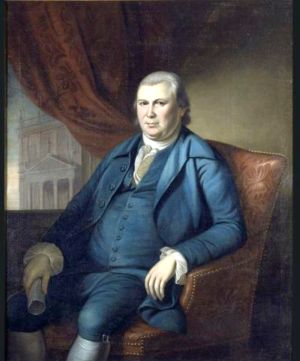
|
| Robert Morris |
UNDER the Articles of Confederation, America had a President who presided, but there was no executive branch for him to do anything administrative. The day to day business of the nation was conducted by committees of Congress, who mainly contracted out the actual work. Evidently, Robert Morris, the businessman had observed this system with displeasure, because it only took him a few days to replace it with departmental employees, reporting to him. The affairs of the nation were evidently in such disarray that there is scarcely any recorded resistance to this astonishing re-arrangement, probably viewed as only one of a series of brisk actions by this foremost businessman of the nation, acting in an emergency and to some extent using his own money. Furthermore, the immediate administrative improvement was apparently so obvious to everyone that the system continued after Morris left office, and was absorbed into the 1787 Constitution without much-recorded debate. Without dissent, as we say, the bureaucracy had been created. As the press of business steadily increased the bureaucracy, from a handful of employees to many millions of them, the fourth branch of government was created without any Constitutional mission statement, not one single word. Following directions set by early America's preeminent no-nonsense businessman, control of the bureaucracy was placed within the Executive branch, in time largely located within the District of Columbia, and governed by rules made by the Civil Service Commission. Sometimes this fourth and largest branch of government skirts dangerously close to encouraging insubordination to their politically appointed superiors.
For some reason, the State Department is particularly suspected of such "Yes, Minister" behavior. Increasingly, government subcontractors are relied upon ("privatization"), as the growth of public sector workforces a return to the subcontractor approach of two centuries earlier; such subcontractors increasingly find the bureaucracy assumes the role of the second Board of Directors. And for the same reason as before: the work of the central government keeps increasing. At a state and local level, an uncomfortable amount of political funding can be traced to utilities and other corporations who have been awarded legal monopolies, uncomfortably like the mercantilism which our colonist ancestors had found so repugnant to deal with. In the 21st Century, we are finally approaching the point where we can foresee the number of people working for some level of government becoming greater than the number of voting citizens, and therefore able to control their income and the nature of their work. When the bureaucracy begins to exert political election power over its elected superiors, elected politicians are almost certain to rebel at what they will surely see as going a step too far. However, on the topic of salary and work environment, they are likely to become allies. Public discontent is already echoed in the growing political movement to limit or shrink the size of government; it would be well to examine and pilot test alternative options before this one gets us into trouble.
In retrospect, this was one of many features of creating the three branches of government where broader implications went unnoticed in 1787. The British government had three branches, King, Parliament, and Judiciary. To create a government consisting of a President, a Congress, and a Judiciary did not then seem like much of a departure. However, the Revolution deposed the King and made the people sovereign. When the real implications of that breezy slogan had to be translated into legislative language serious implications emerged, unexpected then, and now hard to change.
Morris Upended by a Nobody
THE Revolutionary War ended militarily with the Battle of Yorktown in 1781, and diplomatically with the Treaty of Paris in 1783. The careers of Washington and Franklin appeared to be complete, while the economic and financial career of Robert Morris seemed likely to stretch for decades into the future. But as matters actually turned out for these three fast friends, it was Washington who was propelled into a new political career, Franklin soon died, and Morris got himself into a career-ending mess. The financial complexity and economic power of the United States did grow massively in the next several decades, but unfortunately, Robert Morris was soon unable to exert any leadership. At the end of Washington's eight years as President, the power of the Federalists, and particularly the three men most central to it, was coming to a close. John Adams had a tempestuous single term, and then Federalism was all over.
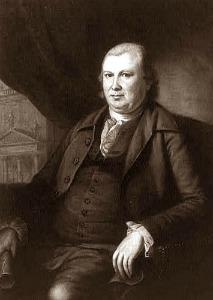
|
| Robert Morris |
The end of the Eighteenth century marked the end of The Enlightenment and the beginning of the Industrial Revolution, accompanied by many national revolutions, not just the American one. This was a major turning point for world history. The momentum of these upheavals still continues, but it is clear that the Industrial Revolution of which the Morris banking revolution was an essential part swept the world far faster than the social and political revolution, in which he also played a pivotal role. In the banking and industrial revolution, it is universally agreed that Morris was almost always right. In the social and political world, it is conversely agreed he was quite wrong. Essentially, Morris assumed that a small minority, an aristocracy of some sort, would rule any country. Within weeks of the ratification of the new Constitution, or even somewhat in anticipation of it, America made it clear that replacing an aristocracy of inheritance with an aristocracy of merit would not satisfy the need. Morris, born illegitimate and soon an orphan, was obviously in favor of promotion based on merit. John Adams defined leadership even more narrowly; he said a gentleman was a man who went to college, and he probably meant Harvard. Nobody extended the leadership class to include Indians and slaves, but the backwoodsmen of Appalachia made it clear that power and leadership at least included them. Thomas Jefferson was the visible leader of this expansion of the franchise, but changed his mind several times. James Madison switched sides; Thomas Paine switched in the opposite direction. The leaders of Shay's Rebellion and the Whiskey Rebellion lacked coherence and consistency on this point; instead of agitating for a refined goal, they mostly seemed to be running around looking for a leader. William Findlay, on the other hand, knew what he wanted. The issue might be defined as follows: it was obvious that hereditary aristocracy was too small and too inflexible to suffice, but it was also obvious that every man a king was too inclusive. An expanded leadership class was needed, but its boundaries were indistinct and contentious. But to return to Findlay, who at least had a clear idea of what he wanted.
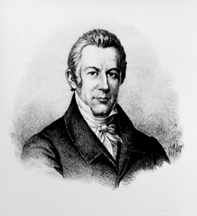
|
| William Findlay |
William Findlay was a member representing Western Pennsylvania in the State Legislature, in 1785. It would be difficult to claim any notable accomplishment in his life; he was largely uneducated. The new leadership class must, therefore, include both the uneducated and the mediocre. The Legislature at that time met in the State House, Independence Hall, in Philadelphia, where no doubt the unconventional dress and manners of backwoodsmen did not pass without audible comment. Findlay made his own political goals quite explicit; he was for paper money to facilitate land speculation which could make him rich. Wealth was a goal, but it did not confer distinction. The rights of the Indians, the rights of the descendants of William Penn, the rights of the educated class and the preservation of property were all just obstacles in the way of an ambitious man who had carefully studied the rules. Everybody's vote was as good as everybody else's, and if you shrewdly controlled a majority of them, you could do as you please. If this meat-ax approach had any rational justification, it lay in the essential selfishness of every single member of the Legislature, working as hard as he could to further his own interest. If someone controlled a majority of such votes, then the majority of the public were declaring in favor of the outcome. Those who believed in good government and the public interest were saps; the refinements of education mostly just created hypocritical liars. There was a strain of Calvinism in all this and a very large dose of Adam Smith's hidden hand of the marketplace. If you were rich, it was proof that God loved you, if you were poor, God must not think much of you, or He wouldn't have made you poor. Findlay had the votes and meant to become rich; if his opponents didn't have the votes, they could expect soon to be poor. In this particular case, the vote coming up was a motion to renew the charter of the Bank of North America. Findlay wanted it to die.
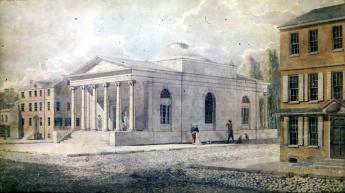
|
| America's first bank, the Bank of Pennsylvania |
It came down to a personal debate between Findlay, and Robert Morris. Morris had conceived and created America's first bank, the Bank of Pennsylvania. Today it would be called a bond fund, with Morris and a few of his friends put up their own money to act as leverage for loans to run the Revolutionary War. After a short time, it occurred to Morris that the money in a bank could be expanded by accepting interest-bearing public deposits and making small loans at a higher interest rate, which is the way most banks operate today. Accordingly, a new bank called the Bank of North America was chartered to serve this function, which greatly assisted in winning the Revolutionary War. There was no banking act or general law of corporations; each corporation had its individual charter, specifying what it could do and how it would be supervised. When the charter came up for renewal, Findlay saw his chance to kill it. Morris, of course, defended it, pointing out the great value to the nation of promoting commerce and maintaining a stable currency. The reply was immediate. Morris had his own money invested in the bank and only wanted to profit from it at the public expense. His protests about the good of commerce and the public interest in stable money were simply cloaking for this rich man's greed to make more money. Findlay made no secret of his interest in reverting to state-authorized paper money, which could then be used by the well-connected to buy vast lands in Ohio for speculation. There were enough other legislators present who could see welcome advantages, and by a small majority the charter was defeated.

|
| John Hancock |
At this point, Morris made a staggering mistake. After all, he was a simple man of no great background, largely uneducated but fortified by his ascent in society from waterfront apprentice to the highest of social positions, a friend of George Washington and Benjamin Franklin, acclaimed as a financial genius, the man who saved the Revolution, very likely the richest man in America. For many years, he had harbored not the slightest doubt of his personal genius, his absolute honesty, and total dedication to the welfare of his country. To have this reputation and accomplishment sneered at by a worthless backwoodsman, a man who would stoop to using the votes of other backwoodsmen to accomplish self-enrichment, was intolerable. Morris announced and actually did sell out his entire business interest as a merchant, at a moment when he fully understood the new nation was about to enjoy an unprecedented post-war boom. So much for his self-interest. It helps to understand that John Hancock and Henry Laurens had done the same thing in Boston and Charleston, against what we now see as a strange aristocratic tradition of prejudice against bankers and businessmen. In even the few shreds of aristocracy now surviving in Britain and Europe, the tradition persists that a true aristocrat is so independently wealthy that no self-interested temptations can attract him away from purest attention to the public good. The original source of this wealth was the King, who conferred high favor on those who served the nation well. A curious exception was made for wealth in the form of land, the only dependable store of tangible wealth, and transactions in land. Wealth was something which came from God and the King in return for public service. Land ownership was its tangible storage and transfer medium. Otherwise, grubbing around with trade and manufacture was beneath the dignity of a true gentleman.
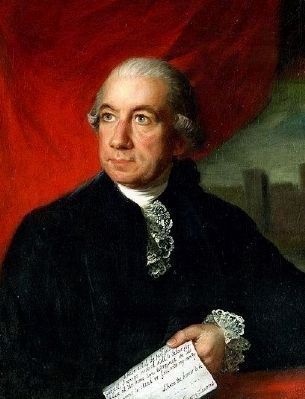
|
| Henry Laurens |
We now know what was coming. Wealth was soon to be the reward of skill and merit, recognized by fellow citizens in the marketplace, by consensus. Findlay and his friends wholly accepted this conclusion, unfortunately skipping the merit part of it for several decades. In their view, you were entitled to the money if you had the votes. As the nation gradually recognized that rewards must be durable, and once granted were yours to have and to hold, the new nation gradually came to see the need for durable ownership of property. Unless or until the owner places it out at risk in the marketplace, legislative votes may not affect its ownership. Our system ever since has rested on the three pillars of meritorious effort, assessment of value by the free market, and respect for pre-existing property. That's quite a change from the Divine Right of Kings, and therefore quite enough material to keep two political parties agitated for a couple of centuries. And quite enough change to bewilder even so brilliant a victim as Robert Morris.
Tammany: Philadelphia's Gift to New York
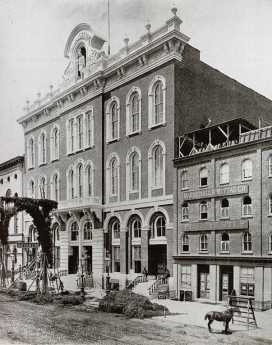
|
| Tammany Hall |
EDWARD Hicks painted a scene over and over, depicting William Penn signing a treaty of peace with the Lenape Indians at Shackamaxon ( a little Delaware waterfront park at Beach Street and E. Columbia Ave.). This scene was apparently a reference to a larger and more finished depiction by Benjamin West. The Indian chief in the painting is Tamarind, chief of the Delaware tribe. Long before Hicks got the idea for the picture from Benjamin West, Tamarind was locally famous for having the annual celebrations of the Sons of St. Tammany named after him. These outings centered on the joys of local firewater and thus may have had something to do with the evolutions of the Mummers Parade. George Washington presided over a lively Tammany party at Valley Forge, and local Tammany Hall clubs sprang up all over the country. The most famous offshoot had its headquarters on 14th Street in New York, as a club within the local Democrat party asserting Irish dominance over New York politics, allegedly using Catholic Church connections to control other immigrant groups. The identity of Tammerend seems to have got thoroughly mixed up along the way; the famous statue of "Tecumseh" at the Naval Academy in Annapolis, much revered by the cadets, is actually a depiction of Tammany.
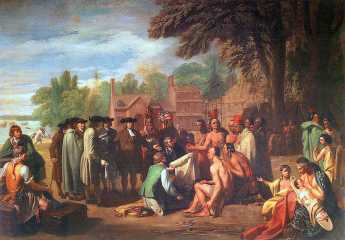
|
| Penn's Treaty With the Indians By Benjamin West |
At earlier times, Tammany was the vehicle Aaron Burr used to assert control of the now-Democrat Party, particularly in the contested Presidential election of 1804. Shooting Alexander Hamilton in a duel, along with disgrace and impeachment as Vice President necessitated Burr's rapid conversion into a non-person, both in New York and in Philadelphia. In Philadelphia, the uproar led to the dispersion of Tammany influence, while in New York other bosses, particularly Boss Tweed, took over the organization and consolidated its role as a small club which dominated a larger political party, which in turn pretty well took over the government of New York City, which in turn dominated the governance of New York State, and even occasionally leveraged itself into national politics. Eventually, Tammany fragmented sufficiently that Mayor Fiorello La Guardia was able to dislodge it from control, which in time led to its dissolution. In a larger sense, however, the decline of New York's Tammany Hall began when in the late 19th Century it adopted the Philadelphia system of consolidating graft from local leaders into unified "donations" from local utilities. That greatly improved the efficiency of collections and disbursements but undermined the need for an effective local organization of ward leaders.
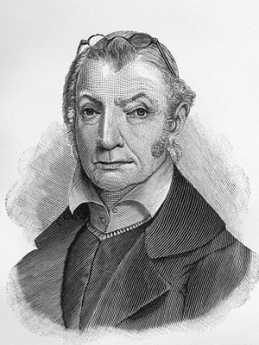
|
| Aaron Burr |
So, although Tammany was originally a Philadelphia creation perfected by New York, it continued to have connections to Aaron Burr in early days, and Philadelphia machine politics later on. But of course for seventy-five years, around here it seemed Republican.
How Could We Improve State Legislatures?
NEARLY every student of government agrees, the state government is the weakest part of the American system. Almost every academic or federal congressman, at least, seems to hold that belief, while almost any lawyer would prefer to have his case in Federal court rather than before a state judge. Although the followers of Thomas Jefferson kept the nation in an uproar for forty years pursuing his notion of government identical with the will of the people, the public opinion he prized nevertheless remains scornful of state government. Such scorn by itself can undermine legislative quality, creating a destructive cycle.

|
| Small Town |
Students of government point to instability and unpredictability as main features of concern about state government. The legal profession values a central principle, called stare decisis: Leave the Law Alone. Stability, or order is desired so highly that dictatorship, corruption, and poverty may be tolerated in order to achieve it. Conversely, an inability to predict what is coming next is highly destabilizing, a sign of amateurism at the controls. Any decision is better than no decision, even a bad decision is better than no decision. The public hesitates to act in the face of indecisive governance, and dynamism drains from the environment. Most of the time it doesn't make much difference what a rule says as long as it is emphatic and prompt. And it's usually the case that bad decisions are quickly reversed. Test it yourself: how much difference does it make whether a one-way street runs East or West? But it would make a considerable difference if almost any street changed Eastward to Westward to Eastward again, several times capriciously. Suppose someone did make a bad mistake: Eastward to Westward and back to Eastward again. Everyone can now see that Westward was a dumb idea, you bonehead. It will be a very long time before anyone tries that, again.
A second general characteristic of state government is the location in a small remote town. The capital of Michigan is in Lansing, not Detroit. In New York, it is in Albany, not New York City, and in Pennsylvania, it moved from Philadelphia to Harrisburg. Even in little Delaware, it is in Dover, in Maryland, it is in Annapolis rather than Baltimore. And so through most of the fifty states, we see the same pattern. No doubt it could be argued: getting away from big-city bosses and political machines is positive, and stretching a network of highways through the open countryside to the new capital is a source of real estate development for the state. But it definitely creates weakness of the governing system to locate it in towns that have little newspaper coverage, no think tanks, few universities, and even poor airports, school systems, museums, and civil society. These are generally one-industry towns, where the children of the bureaucracy all go to school with each other, along with the offspring of lobbyists. Voices in the past have been raised against the development of a ruling class, as might have been seen in Potsdam outside of Berlin and similar political suburbs. But we have just as surely developed a bureaucratic subclass in Bethesda, Maryland and Alexandria, Virginia. No doubt there are many other similar clusters, in other states. Where the children of bureaucrats are clustered in the schools near the Washington Post and the National Journal it can be argued they know the inside game of politics, as well as the children of Boston, know the inside baseball of the Red Sox, and there is a certain value to developing such a political artisan class. But in the vast majority of the country, the dominant problem is that the voters of the state have not the faintest idea of how their state government is functioning. The children of bureaucrats may still learn at the dinner table how to adopt "Yes, Minister" behavior or how to find lifetime bureaucratic jobs with accidentally high fringe benefits. The big flaw is the rest of the state does not realize the smallest part of how prevalent such behavior is in the capital. If the politician who is caught in a scandal is largely unknown to the general public, it is an advantage to the political class. With less notoriety, there is less scandal, possibly even lighter punishment from judges he has been involved in appointing. Rising above this sort of sorry behavior, the quality of legislation is surely diminished when there is diminished fame for doing a good job, diminished scorn for incompetence.
To a certain extent, this pressure for mediocrity is augmented by the reduced importance of the subject material. The federal government is involved in foreign policy and monetary issues Constitutionally forbidden to the state legislature. Even at the bottom of the hierarchy of public notice, the activities of mayors and city councils have a more direct effect of the lives of the local voter than state government does, with importance shaved off at both the top and the bottom. Such activities really can possibly afford to be relegated to some rural small town with nothing to do except play poker and drink in the bar of the local hotel; it's a question which is a cause, which is the effect. The Constitution provides that the Federal government shall be limited to a dozen specified activities, while everything else is governed by the states. Unfortunately, two hundred years of chipping away at the wall separating two governments of limited powers have left the states with little scope to govern anything substantive except the insurance industry. That does not prevent most state governments from considering more than two thousand bills a session, but these are matters of little import, boring, boring.

|
| Big City |
The Progressive Movement of the early Twentieth century saw much the same problems, being handled by much the same sort of people; but they over-reacted to it. Like most reform movements, the Progressives wanted to make a big splash and then go home. A century later, it is difficult to assess how outrageously corrupt the Senatorial process may or may not have been at that time in the past. Somehow, the public became convinced the U.S. Senate was a terribly rotten organization because of the terribly rotten selection system for U.S. Senators. Consequently, the Seventeenth Amendment passed with little fanfare, taking the selection process away from "the states" and giving it to a statewide popular election. In states with large urban political machines, this change meant giving the nominating process to big-city bosses, taking it away from the legislatures. That is definitely a distinction without much difference. Most big-city political bosses are content to select obedient hacks for nomination to the legislature, but this is the source of most rotten boroughs, gerrymandering, corruption, and mediocrity. In the areas of rural machine politics, the boss himself is more commonly attracted to the appointive legislative jobs. In New Jersey, the election law prohibits more than small campaign contributions to legislators but permits unlimited contributions to the county boss. Either way, the progressive reform of 1913 has not had much progressive effect. One thing is very certain. When the method of selection of the state's U.S. Senator is left to the legislature, the resulting Senator is pretty certain to be a current member of the Legislature. And in the instant you aspire to be U.S. Senator, it becomes very clear you will greatly enhance your chances if you first run for the legislature. There were once likely to be half a dozen senatorial aspirants within the Legislature at any one time, so there was an appreciable improvement in the quality of the Legislatures. True, there was probably more grand-standing and maybe even vote-swapping in return for assistance on the Senatorial seat selection. But there was also much more attention paid in return to the state's interests, by the U.S. Senate. The state's voice on the national scene was considerably louder. The value of a legislative seat and the later experience it provided were much enhanced by possessing the power of selecting a U.S. Senator.
A measured assessment of the effects of the Seventeenth Amendment is long overdue. My own view is that ripping the selection process away from the state legislatures and substituting a second popularly elected national legislative house, was both an over-reaction and a careless gesture without much improvement. Because vested interests have been created, it is now nearly useless to ask the present Congress to study the matter. We have to hope that some rich private citizen will see the need for a serious study of these issues, and both fund the effort as well as leave it alone. If it gets captured by ideologues, it will require a second study, or maybe even a third.
And finally, we get to Earl Warren. former governor of California, and President Eisenhower's choice for Chief Justice of the Supreme Court of the United States. Eisenhower later once referred to the appointment as the worst decision he ever made. Two decisions are said to have been his pets: Baker v. Carr and Reynolds v. Sims. Prior to these two decisions, it was really only possible to gerrymander Congress and the fifty state Legislatures. The U.S. Senate and the various state Senates were elected by geographic boundaries, and couldn't be gerrymandered. Tracing back to a corridor conversation between John Dickinson and James Madison, Dickinson had caucused with the other small states and was in a position to block almost any Constitutional Provision at the Convention. He used words to the effect of, "Do you want a Constitution, or don't you?" and went on to describe his total unwillingness to allow big states to dominate small ones. Out of this, Ben Franklin cobbled a compromise of a two-house Legislative Branch. To pass, any legislation would require the approval of both houses. The House of Representatives would have proportional representation, while in the Senate each state would have two senators, regardless of its population. Eventually, almost every state Legislative branch followed this pattern, although it was not a provision of the Constitution.
The hidden dissention in 1789 was over slavery, but Dickinson was a shrewd and experienced lawyer. He knew human nature, and the best example of the power of his insight has later emerged as California has become the largest state. Every new insurance design first seeks to conform to California laws, because it's expensive to launch a new project, and you might as well assure yourself of conforming to the rules of the largest market, first. The smallest state, Delaware, was not about to be pushed around like that, even on many unrelated issues. But centuries later, Earl Warren had learned the same lesson in reverse and lunged for it when he became Chief Justice. Using the argument of "equal justice", he forced 49 state Senates to adopt proportional representation, just like the other house in their branch. New Jersey, which I know best, is typical in being forced by this decision to change its Senate from one vote per county to voting by population. The subtlety was that both houses of state legislatures became dominated by big-city machines and hence were capable of being gerrymandered. They thus gained control of the nomination process, and gerrymandering nation-wide has assumed the posture of machine politics dominating the selection of candidates. It's certainly true that in the Pennsylvania legislative process, you can regularly observe party hacks drive up, and vote on the floor in accordance with a little card which the "leadership" hands them as they step on the floor. The beauty part of this is that decades later, most citizens haven't a clue what had happened.
Espionage in the Revolution

|
| John Nagy |
Both sides fighting the Revolutionary War predominantly spoke English as a native language, so it seemed deceptively simple to pick up a little cash for a tidbit of information or two. John Nagy, who has written several books on spies in the Revolution, recently addressed the Right Angle Club about this interesting topic. According to him, Quakers were favorites as spies because they were widely split in their sympathies, and as pacifists were abundant in the civilian societies of the time. Others have commented that the main difference between Conservatives and Free Quakers was that the Free Quakers were mostly of the artisan class and sympathetic to the Revolution, while the Conservatives were mainly of the merchant class, and Tories. But there were many exceptions, and the plain dress Quakers were hard to tell apart and passed freely through the military lines. No doubt many readers will be incensed by such comments, for which we take absolutely no responsibility.
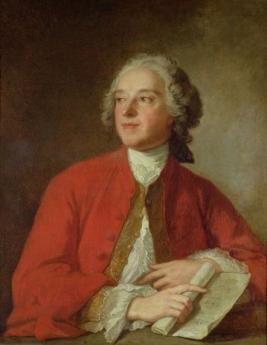
|
| Beaumarchais |
The one main exception to the English-language generalization were the French, who were still smarting from their defeat in the Seven-Years (French and Indian) War. The playwright Beaumarchais was quite active in the French movement to make trouble for the hated English and seems to have stirred up King Louis XVI to be interested in financing rebel trouble-makers, if not to become active combatants. In any event, a wary King thought it was best to send a spy to look over the situation. As detailed in a little pamphlet called The Spy in Carpenter's Hall the Americans were tipped off about the plot. Accordingly, the spy named Bonvoloir was hidden up on the second floor of Carpenter's Hall, while the colonists put on a belligerent falsified performance on the first floor. It is claimed their performance was a convincing one, having the desired effect of creating a report to the King that the colonists were belligerent, warlike, numerous and united. After the Battles of Trenton and Saratoga, the timing was good for using this sort of report to provoke the King into doing what he was mostly of a mind to do, anyway.
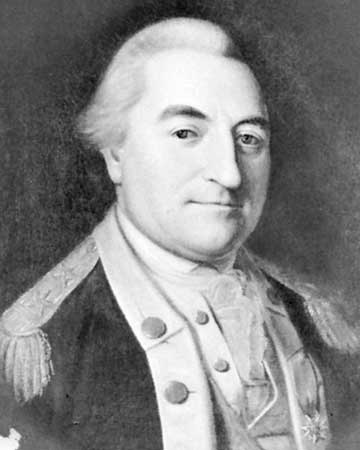
|
| Johann de Kalb |
The French were unusual in favoring aristocrats as spies and Johann de Kalb was anther who snooped around, returning later in the form of General de Kalb of military note. The names of British spies, aside from Major Andre, tended to have a Quaker sound to them, like Dunwoody, Cadwalader Jones and the like. It would take deep research to know whether these were Quaker stalwarts or merely black sheep of some family; there is little doubt that sympathies changed with the changing fortunes of battle. Another feature was the careless lying which took place for propaganda purposes. The famous story of Lydia Darragh, a Quaker who allegedly overheard the British officers plotting the surprise attack on Whitemarsh on December 5, 1777, and walked many miles in the snow to warn Washington -- is apparently a much dressed-up version of what happened. The whole Darragh family was engaged in regular spying, and the evidence is that Lydia's brother William was the one who was the messenger. He apparently carried messages under the cloth covering of the buttons on his coat.
.jpg)
|
| Joseph Galloway |
Two types of spying have a greater ring of authenticity. The British needed pilots to guide their ships up the Delaware past fortifications and obstacles. Maps were nice, but it seemed simpler to enlist the efforts of two ladies of easy virtue, Ms. O'Brien and Ms. McCoy, to hang out in taverns and entice local ship pilots to enlist to guide the British ships into Philadelphia. The British spymasters even had the ingenuity to entice a member of the Continental Congress, Joseph Galloway, to turn over the commentary records from which troop strength could be estimated from the food consumed. It is not recorded whether suitable adjustments were made for starving troops, stolen supplies, or fraudulent charges, however.
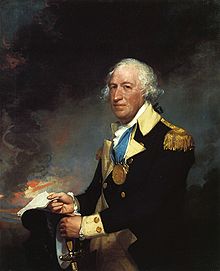
|
| Benedict Arnold |
Two prominent officials were accused of selling out the side, but an accusation of this sort is easily made, hard to prove. When the examples of Benedict Arnold and Peggy Chew can be verified, however, there is always doubt cast on everyone which some will believe. The system of double signatures was used, so there were two co-treasurers of the United States, Joseph Hellegas and George Clymer. Letters have been produced indicating that one or the other sold the commissary records. Hellegas' home is still today the residence outside Pottstown of a prominent Philadelphia surgeon, and his portrait appears on the ten-dollar bill. In so doing, he started a tradition of Secretaries of the Treasury on the ten-dollar bill, presently occupied by Alexander Hamilton. George Clymer, for his part, was a signer of the Constitution and a favorite of George Washington. Are these stories true? Who knows, but in an eight-year war, John Nagy has accumulated evidence that there were over five hundred documented spies. The essential question remains one of whether to believe the documents.
Sources of Revolutionary Populism
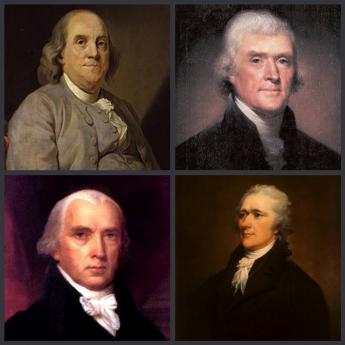
|
| Founding Fathers |
Those who now look back at the Founding Fathers often fail to account for the aging process during the eleven years between the Declaration of Independence in 1776 to the Constitutional Convention of 1787. The two events took place in the same building, Independence Hall, and many participants of the Convention were fellow Revolutionary War veterans. But there was originally a great social difference between a colonial leader and a teen-aged soldier at the beginning of this period, which tended to seem blurred by the experiences of the war. Someone who fought and was wounded as a common soldier might later grow into the dignity of a former war hero, but underneath this veneer was a very different experience from an early leader of the colonial rebellion, or after the onset of serious hostilities, an older man who seemed eligible to be a Revolutionary officer. The original generation of rebels conspired to restore proper British rights for individual colonies, while the teenager who fought in the Continental Army under his idol George Washington saw himself as fighting for the freedoms of individuals, living in a new nation.
What emerged were two generations of Founding Fathers, one of which was generally an officer fighting for the right of his state to be fairly represented, the other a young common soldier, fighting for the individual right of free speech. One wanted to protect his colonial region's religion, the other wanted the freedom to choose his own religion. Both of them felt entitled to say how things were to be run, but young men eventually become older men. No better example of aging's transformation of attitudes could be found than the life of John Marshall. This teenaged wounded veteran of the Battle of Trenton evolved into Chief Justice of the Supreme Court, the author of a multi-volume biography of George Washington, and almost the last man standing who could be called a Federalist. Other teenaged soldiers took different paths in life.
History belongs to the victor, so it is also important to recollect that almost a third of the colonists had been Tories. In general, the upper crust of society tended to be more loyalist. Thousands of Loyalists fled to Canada, and thousands more fought on the British side. When General Clinton abandoned the occupation of Philadelphia, three thousand Loyalists accompanied him. The loss of these more educated and wealthier citizens and the lowered public profiles of those who remained in America skimmed off a considerable portion of the natural leadership of the colonies. Those young men who were left behind were victors, often exhilarated to discover that if they did not lead, no one would lead.
The embodiment of these population shifts was to be found in state governments with unicameral legislatures, popular election of judges, and weak executives -- all of which have since been repudiated by experience, but all of which reflect a distrust of leaders. Partly this might be attributed to lack of experience, greater reliance on collective government by the herd instinct, the recklessness of youth, and fear that power will eventually return to the hands of those who are educated to handle it. The hostility of the lower classes to those who are better off has many causes, but in this situation, it was promoted by unexpected elevation to leadership, combined with a subsequent determination not to lose power again -- balanced against the rather strong possibility that they would. Add to this the continued influx of immigrants fleeing from foreign oppression, and it is not surprising that the result is an enduring strain of populism stirring up a latent tendency to class warfare. You, too, can be President; but you must fight if you expect to succeed. The former aristocratic attitude was that you are born to rule, as long as you don't do something stupid.
REFERENCES
| The Great Courses: History of the United States, 2nd Edition Course #8500: Lecture 14 Creating the Constitution: Aurthor: Allen C. Guelzo: ISBN: 156585763-1 | The Great Courses |
U.S. Army Corps of Engineers in the Delaware Valley
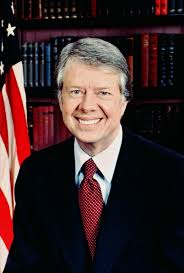
|
It seems unlikely a peanut farmer from Georgia would have much interest in Philadelphia, let alone the activities of its local Army Corps of Engineers. But it seems there is some sort of story, there. An acquaintance chairing a local meeting of Americans for Democratic Action at the time remembers an episode dating from the 1976 presidential nominating campaign. Morris Udall was the main opponent of Jimmy Carter for the Democrat nomination. You might suppose an out of town politician would have instincts tell him to be nice to the local mayor of his own party, but Jimmy Carter went out of his way to attack Frank Rizzo. Udall took the path of conventional wisdom and refrained from joining Carter in the attack. Since Pennsylvania votes were considered pivotal in that particular race, it was watched with considerable interest. But to the surprise of the insiders, Carter won the Pennsylvania votes, suggesting that hidden animosity to Rizzo was extensive. Furthermore, from that event, it would be possible to suppose either of two conclusions. Either Carter would be grateful to Pennsylvania for putting his nomination over the top, or else he had some sort of grievance against Rizzo.
Subsequent events suggest he had a grievance, but it would be very hard to imagine where the two would even have met each other in the past. More likely, he made some slighting remark to an aide, who took it on himself to curry favor when in fact Carter had forgotten all about it.

|
| U.S. Army Corps of Engineers |
In any event, the local division of the Army Corps of Engineers went into some sort of decline, dating from about that time, which might well have been over-reacting to the so-called Love Canal episode. The chief of the division was to have no higher rank than Lt. Colonel. The activities of the division had been centered on building dams and flood control projects but began to be mostly environmental protection, particularly repair of hurricane-damaged ocean beaches. The headquarters was moved from the Custom House to the Wanamaker Building because the personnel and budget had declined. There was the talk of merging the district with another district. The Delaware Division is the smallest district in the country, almost difficult to find on a map whereas some other districts enclose eight states. When you get more states you get more Senators, so you get more budget, and so on. It was sad that the Navy and Marines were founded here, the Revolution and the War of 1812 caused many fortifications to be centered here, the capital of the country. From that point to the present, there has been a long decline. It was particularly painful that West Point is primarily an engineering college, with a tradition that the top five percent of every class is offered a place in the Corps of Engineers. In Army politics, it is clear that a heavy proportion of the generals were West Point graduates, just as it is almost exclusively true that all admirals have Annapolis in their background. Jimmy Carter went to Annapolis, but so what?

|
| Love Canal |
Rather than follow a line of thought which leaves many uncomfortable, perhaps it is more relevant to notice that all of our rivers seem to be drying up. Colorado and the Rio Grande are mere trickles, the Mississippi now has wide banks of mud. Delaware has long been recognized as having a wide mouth and a short length, reflecting its origin as a small river emptying (at Trenton) into a wide bay which is really the back bay of the huge barrier peninsula of Southern New Jersey. What might have been its extensive watershed runs instead into the Susquehanna, about a hundred miles north of Philadelphia, probably because of volcanic shifts? But what was once a thriving port has dwindled as a result of labor troubles and some unfortunate legislation. That's where the number of Senators in your district makes a difference.

|
| Panama Canal |
Wilmington, Delaware has the largest port for bananas in the nation; Delaware points southward, toward all of Latin America. The Chinese are financing, and probably engineering, a widening of the Panama Canal to accommodate giant container ships that now can't get through. The first port on the Atlantic seaboard to deepen its harbor accordingly, will probably get first-mover advantage and hold it because it is expensive to play catch up. Philadelphia is about half-finished in the deepening of the channel to forty-five feet. But New York's deepening of the Hudson is almost complete. New Jersey politics involves both channels on its north and south borders, but New Jersey has long since thrown in its lot with New York. Now that it probably won't matter, the Pennsylvania dredging will probably be permitted to finish. If that happens, the only hope for Philadelphia in the race to be a big container port will depend on a recession in China slowing down their import traffic until we catch up. After all, Philadelphia is blessed with an almost world-unique combination of rail, highway, airport, and ocean shipping interchanges at a single point, on relatively undeveloped land close to a major city. Without wishing any evil on China, we do have to wish they would encounter some reason to slow down for us. Slow down, that is until our natural advantages can overcome the foibles of our politicians.
Fisher on TV

|
| Governor Chris Christie |
As I was rushing out of my office tonight, trying not to be late for a gathering of constituents, I was suddenly confronted by a nice young lady holding a piece of paper, closely followed by a young man with a big professional TV camera. I like to think they were lying in wait for me, but more likely they were haunting the Starbucks across the street.
The question was fired at me, what did I think about Governor Christie using the Supreme Court about gay marriage? I had to admit I don't watch TV all day long, so I hadn't heard about it. Well, do you think it is appropriate for the Governor of a state to sue the Supreme Court? Huh, do you? Caught totally by surprise by a question I don't know much about, I answered, or mumbled, that it seemed to be a lawyer's question, and I'm not a lawyer. I do know that the U.S. Supreme Court will refuse to take a case unless the plaintiff can show he has sustained a personal loss of some sort. But I don't know anything about the New Jersey Supreme Court or its rules, and the whole thing seems to me to be above my pay grade. Or something like that.
If I had had more than ten seconds to think about it, I might have said, "What you really are asking me is Don't you think Christie is a bad, insensitive person?" And my answer to that question if put a little more plainly, would be, "No, I like Governor Christie a lot and I trust a former U.S. Attorney to know the fine points of law better than I do, so I support him."
And if I am wrong, and the real question you are asking me is Am I gay? Then, my answer would be, "No, I'm not gay one bit. But I am inclined to let other people do as they please, as long as it is harmless to others."
And if the hidden question is do I approve of people being gay, I would have to answer that if everybody became gay, it's pretty hard to see how the human race would survive. Now could I ask you a question? Who are you, and who is paying you to ask me slanted questions?
Follow-up, written the next day: The next day's newspaper gave an entirely new slant to this little episode. It seems the decision was made by the Superior Court, not the Supreme Court, and Governor Christie appealed the decision, he did not sue anybody. So the whole interview process was a put-up job, slanting the attention away from a record-breaking court decision to Governor Christie, who was dutifully responding to a Superior Court ruling which overturned a state law. All the rest of it was either intended to shift attention or else to tangle me up in a confused reaction to some events which did not happen at all.
In that case, let me state my central position. Governor Christie is a great guy, who definitely needs to win re-election November 5. And I am running for the role of Assemblyman for the 6th District, prepared to help him in every way I can.
Fisher on Proposed Economic Zones
There's an idea that politicians are all negative characters, saying nasty things. That's probably because the public only listens to them during the last week of a campaign when campaign advisors urge them that negative works best. So, here's a positive idea. And it comes from Camden County Republicans.
There's no doubt New Jersey is in a fiscal squeeze. Our property taxes are second-highest in the nation, but our municipal bonds are regarded as risky unless we raise taxes or cut spending. If we raise taxes, people will move to other states. In fact, we mainly haven't lost population because New York City is more heavily taxed, so New Yorkers move to New Jersey. Philadelphia has lost 40% of its population since the peak, and if you ask your neighbors, many of them moved from Philadelphia. Camden City just moved away, period. The people you don't talk to are the ones who have moved from New Jersey. So we are afraid to raise taxes, and we are a little afraid to cut them for fear the municipal bond market will strangle our borrowing power. Here's the proposal.
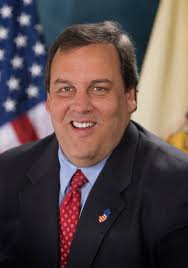
|
| Governor Chris Christie |
While we continue with Governor Christie's efforts to cut spending, like getting rid of those 800 paid Committees, and seeing if defined benefit pensions can be converted to defined contribution plans, and the like, let's cut taxes where it would help the most. The Camden County Republican proposal is to cut taxes in defined enterprise zones. If we can attract some new businesses into those zones, they and their employees would pay taxes, and the gamble might pay for itself. It might not, of course, but that's the risk any businessman takes when he makes an investment.
Right now, Exit 4 on the Turnpike is not in Legislative District 6, because the borders get shifted around by gerrymandering. But it's close, and most of the business activity it has created is within District 6, along the route toward Philadelphia. Most of the theory of business clusters suggests that a cluster of business activity is most sustainable when it contains a diversity of industries, but it needs a dominant industry to get started. Tom Booth suggests medical supplies already have a big start in our geographical area, and I can agree that eighty percent of the pharmaceutical industry is located within a hundred miles of us. Burlington County has demonstrated that you can keep everybody happy if you segregate commuters and farmers, which means helping the environmentalists and the businessmen at the same time. It really can be done and is being done by some of our neighbors. Not a bit of doubt you have to be careful about creating winners and losers, because that's where the graft comes from. But there's no doubt if you succeed, you will succeed big.
Cutting (some) taxes and helping the deficit at the same time. Just think of that. And think about 13% of unemployment in Camden County. We have to do something about that or it will destroy us.
Burlington Leads the Way
Somewhere in the past few decades, Burlington became quite activist. Although many tend to think of real estate planning as urban planning, this largely rural county went in for planning in a big way, deciding what it was and what it wanted to be. Generally speaking, its decision was to replace urban sprawl with cluster promotion. The farmers didn't like an invasion by McMansions or industries, while the towns lost their vigor through tax avoidance behavior of the commuter residents. Overall, the decision was to push urban development along the river in clusters surrounding the declining river towns, while pushing exurban development closer to logical commuting centers, leaving the open spaces to farmers. Incentives were preferred to compulsion, with a determination never to use eminent domain except for matters of public safety.
To implement these goals, two referenda were passed with 70% majorities to create special taxes for a development fund, which bought the development rights from the farmers and -- with political magic -- re-clustered them around the river towns. The farmers loved it, the environmentalists loved it, and the towns began to revive. The success of this effort rested on the realization that exurbanites and farmers didn't really want to live near each other, and only did so because developers were looking for cheap land. Many other rural counties near cities -- Chester and Bucks Counties in Pennsylvania, for example -- need to learn this lesson about how to stop local political warfare. Corporation executives don't want to live next to pig farms, but pig farmers are quite right that they were living there, first. When this friction seeps into the local school system, class warfare can get pretty ugly.

|
| Burlington Bristol Bridge |
In Burlington County, they thought big. The central project was to push through the legislature a billion-dollar project to restore the Riverline light rail to the river towns, along the tracks of the once pre-eminent Camden and Amboy Rail Road. It was an unexpected success. During the first six months of operation, ridership achieved a level twice as large as was projected as a ten-year goal. Along this strip of the Route 206 corridor, the old Roebling Steel Works are becoming the Roebling Superfund Site, now trying to attract industrial developers. The Haines Industrial Site originally envisioned as a food distribution center was sold to private developers who have created 5000 jobs in the area. Commerce Park beside the Burlington Bristol Bridge is coming along, as are the Shoppes of Riverton and Old York Village in Chesterfield Township. As Waste Management cleans up the site of the old Morrisville Steel plant across the Delaware River, a moderate-sized development project is becoming an interstate regional one.
No doubt there will be bumps in these roads; the decline of real estate prices nationally is a threat on the horizon, because it provokes a flight of mortgage credit. It works the other way, too, as banks decide to deleverage by reducing outstanding loans; this is the way downward spirals reinforce themselves. And anyone who knows anything about all state legislatures will be skeptical about political cooperation in a state as tumultuous as New Jersey. The Pennsylvania Railroad destroyed the promise of this state once; some other local interest could do it again. Nevertheless, right now Burlington County looks like a real winner, primarily because of effective leadership.
Fisher on Stuffing Ballot Boxes

|
| Stuff the Ballot Box |
Shortly before election last year, the papers were full of agitation about passing laws to require voters to identify themselves. That doesn't sound so burdensome, considering how teenagers pester you to get a driver's license when they reach a certain age. But, oh my goodness, it was a terrible thing to ask of voters who are barely able to crawl to the voting place, much too poor to afford a car, and grossly offended by the suggestion that anyone would dare to have such nasty suspicions. So, being new to the candidate business, I asked a few hardened old pros about it. Is there much voter fraud in Camden County? And if so, how is it accomplished?
For some reason, this innocent question was greeted with gales of laughter. When it settled down, two or three suggestions were offered. In the first place, said the old guy on a park bench, tell the poll watchers to be certain the voting machines have been set to zero before any voter uses them. How would requiring a driver's license prevent that kind of thing? It wouldn't; it depends on having poll watchers.
All right, what else? Well, there's the "old fashioned way". What that refers to is waiting until about an hour before the polls close, and there is nobody watching in the polling place because it's dinnertime. When the coast is clear, just take the list of registered voters who haven't yet voted -- and vote them for your party. Pretty smooth, right? And if you would be required to write down the driver's license number for every voter, it's pretty easy to spot deficiencies when the results get challenged. So, maybe requiring some sort of ID would be effective, and wouldn't amount to frisking a citizen. And then, there's a law to mention.
In New Jersey, and maybe elsewhere too, a poll watcher is required to be a resident of his district. So, a little old lady with knitting is unlikely to want to watch the polls in some of the tougher districts. For this, both parties employ "flying squads" of some of the party faithful who look like professional football players. One beep on the cell phone and this squad come flying. Well, my Goodness me.
Written several months later:
Judge Richard Posner, whose writings I have come to admire greatly, was interviewed recently on television. Although he said he had written earlier that he saw nothing wrong with asking voters to identify themselves, he now reverses himself and concludes that voter identification laws prevent more people from voting than they prevent fraud. He bases this opinion on what someone tells him is credible evidence, but I'm afraid I neither believe the evidence nor think it is an important way to think about this issue.
I believe the most important issue is to have the public believe the elections were fair, so we don't get more civil disobedience stirred up by political "contractors", or in spite of heated fanaticism heating up in the last few days of an election. There are numerous examples of candidates who supported a fraudulent election of their opponent, rather than have his own supporters injure the reputation of our procedures. Somebody has to win an election, and the election has to be seen as final. In our system, any close election could probably be reversed by a well-managed recount and reversed again on re-recount. To discover large frauds, even if potentially balanced by improved enfranchisement, is to discredit the election process. And since there are many local polling districts near me which have not had dual poll watchers for twenty years, the suspicion of voter fraud in those districts is quite a natural one. I"m not sure what the issues are, surrounding the credibility of absentee ballots.
All I know is a lot of people are increasingly resorting to them because they distrust the conventional polling places. If that's what it takes to convince people the elections are fair, let's try it out wholesale in some districts where obtaining dual poll watchers has been difficult. Like Chicago, for instance?
Yard Signs
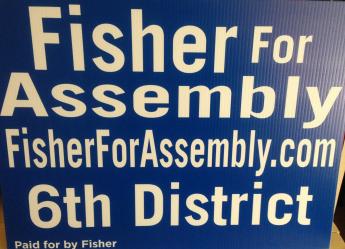
|
| Yard Signs |
For two weeks before election day, I had two "Fisher for Assembly" yard signs outside the entrance to my office, flapping back and forth in the wind. That's in the center of our little town, and the signs were stuck in the ground of what I assume is public property. If not, it is my rented property. One morning, I came to work and found they were gone. Perhaps it was Hallowe'en kids on a prank, perhaps the trash collectors swept them up. But the nice fellow with a beard who sits on a park bench next to the place, said, "No, it was some woman. She said it was against the law to put up signs in the business district, and he didn't argue with her. Nobody I asked had heard of any such law, so I have to assume she was an overzealous supporter of my opponents. In elections, this sort of partisanship has been known to get much worse than taking down an opponent's signs.
Anyway, my older daughter had been appointed campaign manager,, and she was very brisk about yard signs. Yes, indeed. Yard signs are very effective. How many do you have? The answer was five since at fifty dollars apiece, they seemed pretty pricey for what little good they did. No, no, they do a lot of good, so get fifty more immediately, and I'll help you place them. Well, that took a little pleading and arm-twisting, but the next day we had them. And, after church on Sunday (after Meeting on the First Day, as Quakers would say), we went off on a wild sign-placing ride. She drove, while I attached the wire stands to them. We were looking for signs that had been put up by other Republicans.
There are several reasons for putting your signs with those of your friends, in clusters. In the first place, this is one of the functions of a political party. There have been many previous elections, and the people who will give permission have long since been identified. The permission is only good for members of his party, however, since if you are an opponent you are likely to be confronted by ladies who say it is against the law. And the good places to put signs have long since been identified, usually at places where passing cars must slow down for a stop light. But how can anybody read your sign as they whiz by? They can't, which is why repetition is the thing. The same sign, with the same distinctive design, is finally read by someone who has seen it before but could only see the color pattern the first time. Putting a funny jingle on five successive signs was a very good idea once used extensively by Burma Shave. But it's expensive, and although everyone recognized a Burma Shave jingle, I have to admit that I never met anyone who actually used Burma Shave.
In the final outcome, I got 19,000 votes. Since I can scarcely imagine shaking 19,000 hands, that's pretty gratifying. Unfortunately, in this election, it would have been useful to have 750 more.
Political Parties, Absent and Unmentionable
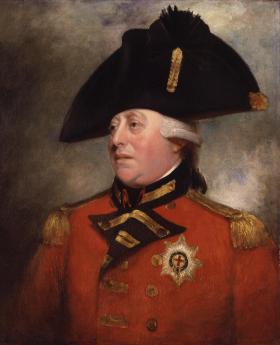
|
| King George III |
BECAUSE America had recently revolted to rid itself of King George III, the Constitutional framers of 1787 sought to construct a government forever free from one-man rule. Inefficiency could be accepted but central dictatorial power, never. It is unrealistic however to expect a wind-up toy to keep working forever, and our Constitution creates the same worry. After two centuries, some chinks have appeared.
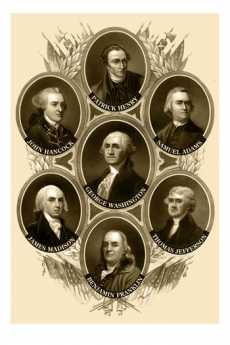
|
| Founding Fathers |
Political parties existed in 18th Century England and Europe, but the American founding fathers seem not to have worried about them much. Within ten years of Constitutional ratification, however, Thomas Jefferson had created a really partisan party which naturally provoked the creation of its partisan opposite. James Madison was slowly won over to the idea this was inevitable, but George Washington never budged. Although they were once firm friends, when Madison's partisan position became clear to him, Washington essentially never spoke to him again. Andrew Jackson, with the guidance of Martin van Buren, carried the partisan idea much further toward its modern characteristics, but it was the two Roosevelts who most fully tested the U.S. Supreme Court's tolerance for concentrating new powers in the Presidency, and Obama who recognized that the quickest way to strengthen the Presidency was to weaken the Legislative branch.
Dramatic episodes of this history are not central to present concerns, which focuses more on the largely unnoticed accumulations of small changes which bring us to our present position. Wars and economic crises induced several presidents, nearly as many Republicans as Democrats, to encourage migrations of power advantage which never quite returned to baseline after each crisis. Primary among these migrations was the erosion of the original assumption of perfect equality among individual members of Congress. A new member of Congress today may tell his constituents he will represent them ably, but when he arrives for work he is figuratively given an office in the basement and allowed to sit on empty packing cases. This is not accidental; the slights are intentional warnings from the true masters of power to bumptious new egotists, they will get nothing in their new environment unless they earn it. Not a bad idea? This schoolyard bullying is a very bad idea. If your elected representative is less powerful, you are less powerful.
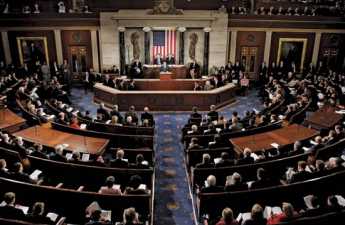
|
| Houses of Congress |
Partisan politics begins with vote-swapping, evolves into a system of concentrating the votes of the members into the hands of party leaders, and ultimately creates the potential for declaring betrayal if the member votes his own mind in defiance of the leader. The rules of the "body" are adopted within moments of the first opening gavel, but they took centuries to evolve and will only significantly change direction on those few occasions when newcomers overpower the old-timers, and only then if some rebel among the old timers takes the considerable trouble to help organize them. In the vast majority of cases, after adoption, the opportunity to change the rules is then effectively lost for two years. Even the Senate, with six-year staggered terms, has argued that it is a "continuing body" and need not reconsider its rules except in the face of a serious uprising on some particular point. Both houses of Congress place great weight on seniority, for the very good purpose of training unfamiliar newcomers in obscure topics, and for the very bad purpose of concentrating power in "safe" districts where party leaders are able to exercise iron control of the nominating process. Those invisible bosses back home in the district, able to control nominations in safe districts, are the real powers in Congress. They indirectly control the offices and chairmanships which accumulate seniority in Congress; anyone who desires to control Congress must control the local political bosses, few of whom ever stand for election to any office if they can avoid it. In most states, the number of safe districts is a function of controlling the gerrymandering process, which takes place every ten years after a census. Therefore, in most states, it is possible to predict the politics of the whole state for a decade, by merely knowing the outcome of the redistricting. The rules for selecting members of the redistricting committee in the state legislatures are quite arcane and almost unbelievably subtle. An inquiring newsman who tries to compile a fifty-state table of the redistricting rules would spend several months doing it, and miss the essential points in a significant number of cases. The newspapers who attempt to pry out the facts of gerrymandering are easily gulled into the misleading belief that a good district is one which is round and compact, leading to a front-page picture showing all districts to be the same physical size. In fact, a good district is one where both parties have a reasonable chance to win, depending for a change, on the quality of their nominee.
So that's how the "Will of Congress" is supposed to work, but the process recently has been far less commendable, and in fact, calls into dispute the whole idea of a balance of power between the three branches of government. We here concentrate on the Health Reform Bill ("Obamacare") and the Financial Reform Bill ("Dodd-Frank"), which send the same procedural message even though they differ widely in their central topic. At the moment, neither of these important pieces of legislation has been fully subject to judicial review, so the U.S. Supreme Court has not yet encumbered itself with stare decisis of its own creation.
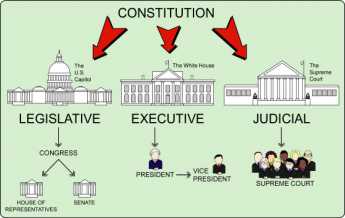
|
| Three branches of government |
In both cases, bills of several thousand pages each were first written by persons who if not unknown, are largely unidentified. It is thus not yet possible to determine whether the authors were affiliated with the Executive Branch or the Legislative one; it is not even possible to be sure they were either elected or appointed to their positions. From all appearances, however, they met and organized their work fairly exclusively within the oversight of the Executive Branch. Some weighty members of the majority party in Congress must have had some involvement, but it seems a near certainty that no members of the minority party were included, and even comparatively few members of highly contested districts, the so-called "Blue Dogs" of the majority party. It seems safe to conjecture that a substantial number either represent special interest affiliates or else party faithful from safe districts with seniority. The construction of the massive legislation was conducted in such secrecy that even the sympathetic members of the press were excluded, and it would not be surprising to learn that no person alive had read the whole bill carefully before it was "sent" to Congress. It's fair to surmise that no member of Congress except a few limited members of the power elite of the majority party were allowed to read more than scattered fragments of the pending legislation in time to make meaningful changes.
The next step was probably more carefully managed. No matter who wrote it or what it said, a majority of the relevant committees of both houses of Congress had to sign their names as responsible for approving it. Because of the relatively new phenomenon of live national televising of committee procedure, the nation was treated to the sight of congressmen of both parties howling that they were only given a single day to read several thousand pages of previously secret material -- before being forced to sign approval of it by application of unmentioned pressures enabled by the rules of "the body". When party members in contested districts protested that they would be dis-elected for doing so, it does not take much imagination to surmise that they were offered various appointive offices within the bureaucracy as a consolation. As it turned out, the legislation was only passed narrowly on a straight-party vote, so there can be a considerable possibility of its likely failure if the corruptions of politics had been set aside, with members voting on the merits. Nevertheless, since this degree of political hammering did result in a straight-party vote, it leaves the minority party free to overturn the legislation when it can. The prospect of preventing an overturn in succeeding congresses seems to be premised on "fixing" flaws in the legislation through the issuance of regulations before elections can open the way to overturn of the underlying authorization. Legislative overturn, however, is very likely to encounter filibuster in the Senate, which presently requires 40 votes. Even that conventional pathway is booby-trapped in the case of the Dodd-Frank Law. The Economist magazine of London assigned a reporter to read the entire act, and relates that almost every page of it mandates that the Executive Branch ("The Secretary shall") must take rather vague instructions to write regulations five or ten times as long as the Congressional authorization, giving the specifics of the law. The prospect looms of vast numbers of regulations with the force of law but written by the executive branch, emerging long after the Supreme Court considers the central points, years after the authorizing congressmen have had a chance to read it, and well after the public has rendered final judgment with a presidential election. The underlying principle of this legislation is the hope that it will later seem too disruptive to change a law, even though most of it was never considered by the public or its representatives.
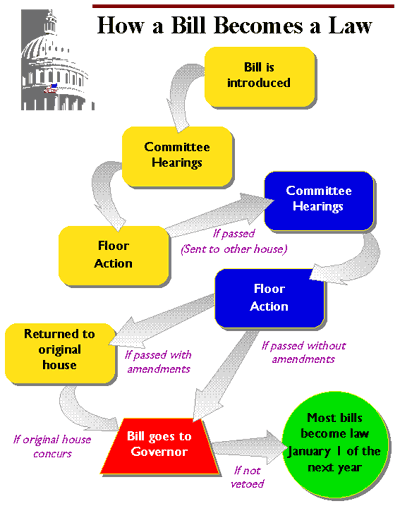
|
| Bill become a Law |
The "regulatory process" takes place entirely within the Executive branch. Congress passes what it terms "enabling" legislation, containing language to the effect that the Cabinet Secretary shall investigate as needed, decide as needed, and implement as needed, such regulations as shall be needed to carry out the "Will" of Congress. Since the regulations for two-thousand-page bills will almost certainly run to twenty thousand pages of regulations with the force of law, the enabling committee of Congress will be confronted with an impossible task of oversight, and thus will offer few objections. The Appropriations Committees of Congress, on the other hand, are charged with reviewing every government program every year and have the power to throttle what they disapprove of, by the simple mechanism of cutting off the program's funds. Members of the coveted Appropriations Committees are appointed by seniority, come from safe districts, and are attracted to the work by the associated ability to bestow plums on their home districts. By the nature of their appointment process, unworried by the folks back home but entirely beholden to the party bosses, they have the latitude to throttle anything the leadership of their party wants to throttle badly enough. The outcome of such take-no-prisoners warfare is not likely to improve the welfare of the nation, and therefore it is rare that partisan politics are allowed to go so far.
The three branches of government have become unbalanced. These bills were almost entirely written outside of the Legislative branch, and the ensuing regulations will be written in the Executive branch. The founding fathers certainly never envisioned that sweeping modification will be made in the medical industry and the financial industry, against the wishes of these industries, and in any event without convincing proof that the public is in favor. This is what is fundamentally wrong about taking such important decisions out of the hands of Congress; it threatens to put the public at odds with its government.
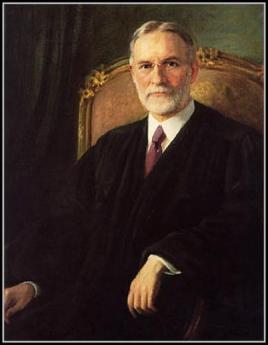
|
| Justice George Sutherland |
There is no need to go further than this, harsher words will only inflame the reaction further than necessary to justify a pull-back. And yet, the Supreme Court would do us mercy if it doused these flames; the Supreme Court needs a legal pretext. May we suggest that Justice George Sutherland, who sat on the court seventy years ago, may have sensed the direction of things, short of using a particular word. Justice Sutherland recognized that although it is impractical to waver from the principle that ignorance of the law is no excuse, it is entirely possible for a person of ordinary understanding to read law in its entirety and still be confused as to its intent. He thus created a legal principle that a law may be void if it is too vague to be understood. In particular, a common criminal may be even less able to make a serious analysis. Therefore, at least in criminal cases, a lawyer may well be void for vagueness. In this case, we are not speaking of criminals as defendants or civil cases of alleged damage of one party by a defendant. Here, it is the law itself which gives offense by its vagueness, and Congress which created the vagueness is the defendant. Since we have just gone to considerable length to describe the manner in which Congress is possibly the main victim, this situation may be one of the few remaining ones where a Court of Equity is needed. That is, an obvious wrong needs to be corrected, but no statute seems to cover the matter. The Supreme Court might give some thought to convening itself as a special Court of Equity, on the special point of whether this legislation is void for vagueness.
We indicated earlier that one word was missing in this bill of particulars. That would be needed, to expand the charge to void for intentional vagueness, an assessment which is unflinchingly direct. It suggests that somewhere in at least this year's contentious processes, either the Executive Branch or the officers of the congressional majority party, or both, intended to achieve the latitude of imprecision, that is, to do as it pleased. Anyone who supposes the general run of congressmen voluntarily surrendered such latitude in the Health and Finance legislation, has not been watching much television. Given the present vast quantity of annually proposed legislation, roughly 25,000 bills each session, the passage of a small amount of vague legislation might only justify voiding individual laws, whereas an undue amount of it might additionally justify a reprimand. However, engineering laws which are deliberately vague might rise to the level of impeachment.
| Posted by: Joseph Clark | Oct 13, 2013 7:58 PM |
68 Blogs
Philadelphia's Republican Machine
 Almost all big-city political machines have been part of the Democratic Party, except Philadelphia. There were reasons for that.
Almost all big-city political machines have been part of the Democratic Party, except Philadelphia. There were reasons for that.
When Bosses Ruled Philadelphia
 Starting with the gas works, a scholar makes the point that modern big-city political machines are financed by Utility companies. Utilities prefer one-stop payoffs to a lot of petty grafters, and being monopolies, they pass the cost to the customers.
Starting with the gas works, a scholar makes the point that modern big-city political machines are financed by Utility companies. Utilities prefer one-stop payoffs to a lot of petty grafters, and being monopolies, they pass the cost to the customers.
The Republican Convention (1900)
 The political bosses wanted to get Teddy Roosevelt out of the Governor's chair in Albany. As things turned out, they made him President of the United States.
The political bosses wanted to get Teddy Roosevelt out of the Governor's chair in Albany. As things turned out, they made him President of the United States.
That Damned Cowboy
 and The political bosses wanted to get Teddy Roosevelt out of the Governor's chair in Albany. As things turned out, they made him President of the United States.
and The political bosses wanted to get Teddy Roosevelt out of the Governor's chair in Albany. As things turned out, they made him President of the United States.
Republican Convention in the Wigwam (1860)
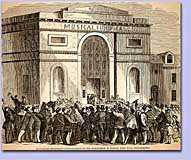 Honest Abe got nominated for President in a raucous brawl.
Honest Abe got nominated for President in a raucous brawl.
Mayors and Limos
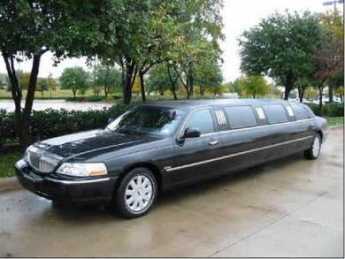 Mayors sometimes want to be noticed riding around, and sometimes want to be invisible. They have been both.
Mayors sometimes want to be noticed riding around, and sometimes want to be invisible. They have been both.
Mark Twain Observes 1890 Pennsylvania Politics
 Our politicians were a joke, even a century ago.
Our politicians were a joke, even a century ago.
Local Elections (2)
 The FBI listens to what Philadelphia politicians have to say, and tape-records it for all to hear.
The FBI listens to what Philadelphia politicians have to say, and tape-records it for all to hear.
Local Elections
 To be Announced...
To be Announced...
Highway Beautification
When American tourists notice this, they are very smug.
Henry George, Single Tax
 The Henry George idea of a single tax still lives on in a school run in his old house on Eleventh Street.
The Henry George idea of a single tax still lives on in a school run in his old house on Eleventh Street.
TV and Politics
 Political campaign costs are mostly TV costs. It has the effect of silencing TV news reporting.
Political campaign costs are mostly TV costs. It has the effect of silencing TV news reporting.
The Web As Investigative Reporter
 Just as cellphones reduce street crime, the Internet reduces the risk and cost of investigative reporting. That should help democracy.
Just as cellphones reduce street crime, the Internet reduces the risk and cost of investigative reporting. That should help democracy.
Benjamin Franklin: Chronology
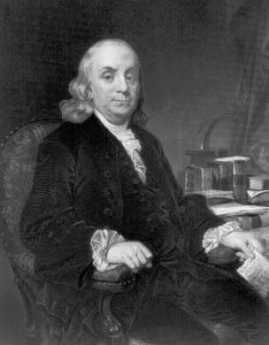 Franklin retired at age 42, and spent the other half of his life in public service. Only fifteen years of that career was spent in America. His timing was good, however; he was here for the French and Indian War, the Declaration of Independence, and the Constitutional Convention.
Franklin retired at age 42, and spent the other half of his life in public service. Only fifteen years of that career was spent in America. His timing was good, however; he was here for the French and Indian War, the Declaration of Independence, and the Constitutional Convention.
Corrupt and Contented
Pennsylvania elects judges, and that is slightly worse than appointing them.
Mussolini in South Philadelphia
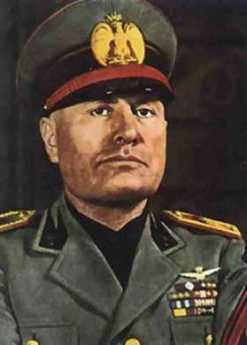 The American public had scarcely heard of Benito Mussolini before World War II, but Italian immigrants in South Philadelphia were agitated by news from the old country.
The American public had scarcely heard of Benito Mussolini before World War II, but Italian immigrants in South Philadelphia were agitated by news from the old country.
Healthcare Reform: Looking Ahead (3)
 If radical new proposals for health care reform appear in the next few years, they are likely to originate in Detroit.
If radical new proposals for health care reform appear in the next few years, they are likely to originate in Detroit.
New Jersey: A Keg Tapped at Both Ends (2)
 The New Jersey legislature began by ratifying the Declaration of Independence in Haddonfield, then moved to Trenton and concerned itself with debts, then with railroads, then corporations, and now -- with debts, again.
The New Jersey legislature began by ratifying the Declaration of Independence in Haddonfield, then moved to Trenton and concerned itself with debts, then with railroads, then corporations, and now -- with debts, again.
Chester: To the Dark Tower
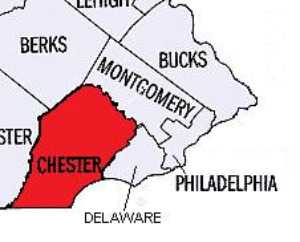 The ancient town of Chester struggles to revive..
The ancient town of Chester struggles to revive..
Social Disintermediation
 A term borrowed from the banking world seems to explain the recent decline of local government, local clubs, and local news sources. Alas, the consequence of such social disintermediation is a rise of insolence, insubordination, and junkyard dog-ism.
A term borrowed from the banking world seems to explain the recent decline of local government, local clubs, and local news sources. Alas, the consequence of such social disintermediation is a rise of insolence, insubordination, and junkyard dog-ism.
Port of Philadelphia
 The Port of Philadelphia has access to six U.S. Senators from its surrounding states, but the price to be paid is endless political wrangling.
The Port of Philadelphia has access to six U.S. Senators from its surrounding states, but the price to be paid is endless political wrangling.
Detroit Makes, Philadelphia Takes
 The heap of crushed auto bodies at the foot of Philadelphia's Platt Bridge is an important part of the regional economy.
The heap of crushed auto bodies at the foot of Philadelphia's Platt Bridge is an important part of the regional economy.
Unwritten Constitution
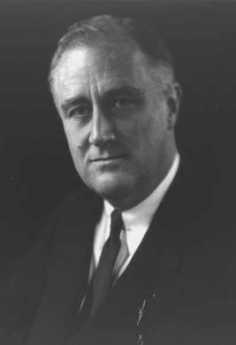 The Twenty-second Amendment to the U.S. Constitution serves an excellent purpose, even though the 80th Congress which proposed it may have had quite different motives.
The Twenty-second Amendment to the U.S. Constitution serves an excellent purpose, even though the 80th Congress which proposed it may have had quite different motives.
Commercial Academic Think Tank
 There are universities and there are think tanks. Philadelphia has at least one commercial consulting firm which combines elements of both.
There are universities and there are think tanks. Philadelphia has at least one commercial consulting firm which combines elements of both.
War Dance
 The Iroquois had politics figured out long before the White Man arrived
The Iroquois had politics figured out long before the White Man arrived
A Pennsylvania Farmer in Delaware
 John Dickinson achieved national fame in 1773 by publishing twelve letters written earlier denouncing the Townshend Acts. They were published anonymously as Letters From a Pennsylvania Farmer. His farm, curiously, was in Delaware.
John Dickinson achieved national fame in 1773 by publishing twelve letters written earlier denouncing the Townshend Acts. They were published anonymously as Letters From a Pennsylvania Farmer. His farm, curiously, was in Delaware.
SCUBA Tours of the Andrea Doria
 The Stockholm collided with the Andrea Doria and sank her in 1956 in 250 feet of water. Lots of weekend visitors still wander around inside the ship.
The Stockholm collided with the Andrea Doria and sank her in 1956 in 250 feet of water. Lots of weekend visitors still wander around inside the ship.
Vote Counting, Past and Future
 Voting law changes followed the contested 2000 Presidential election, but U.S. Supreme Court still comes out looking pretty good. Close elections will always cause problems, some of them brand new ones.
Voting law changes followed the contested 2000 Presidential election, but U.S. Supreme Court still comes out looking pretty good. Close elections will always cause problems, some of them brand new ones.
Merging Cities With Their Suburbs
 When middle-sized cities are thriving and growing, they tend to want to annex neighboring districts. Their newspapers are ecstatic about it.
When middle-sized cities are thriving and growing, they tend to want to annex neighboring districts. Their newspapers are ecstatic about it.
Philadelphia City-County Consolidation of 1854
 Prior to 1854, Philadelphia City was one of twenty-nine political entities within Philadelphia County. After that, it became one big city without suburbs. Growth pressure now reverses toward suburbs without a city. Political boundaries should thus shift inwardly.
Prior to 1854, Philadelphia City was one of twenty-nine political entities within Philadelphia County. After that, it became one big city without suburbs. Growth pressure now reverses toward suburbs without a city. Political boundaries should thus shift inwardly.
Constitution V: The Unforeseeable
The sturdiness of the American Constitution emerges from surveying the way it copes with huge changes which could not possibly have been foreseen.
Philadelphia City Controller
 A City Controller is expected to criticize the city's administration. Alan Butkovitz does his duty.
A City Controller is expected to criticize the city's administration. Alan Butkovitz does his duty.
Windmill Electricity
 There isn't a windmill within a hundred miles of Philadelphia, but wind power is being actively promoted.
There isn't a windmill within a hundred miles of Philadelphia, but wind power is being actively promoted.
Reforming Health Reform, New Jersey Style
 U.S. Representative Robert Andrews (D, NJ) had a night he won't soon forget on August 24, 2009. Facing 3000 constituents angry about Health Reform, he practically had a public stoning.
U.S. Representative Robert Andrews (D, NJ) had a night he won't soon forget on August 24, 2009. Facing 3000 constituents angry about Health Reform, he practically had a public stoning.
Harvard Progressives in Philadelphia
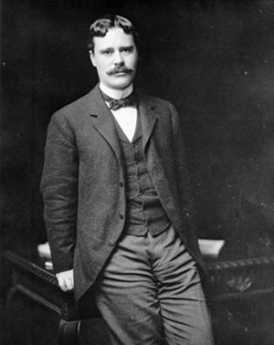 The Progressive movement of the early 20th century was a strange hodge-podge of political reformers, nostalgic aristocrats, would-be socialists, and anti-immigrant. The central figure was Theodore Roosevelt, traveling in strange company like Owen Wister, Robert M. LaFollette, Henry James, and Henry Adams. The Philadelphia link seems to have been through Harvard.
The Progressive movement of the early 20th century was a strange hodge-podge of political reformers, nostalgic aristocrats, would-be socialists, and anti-immigrant. The central figure was Theodore Roosevelt, traveling in strange company like Owen Wister, Robert M. LaFollette, Henry James, and Henry Adams. The Philadelphia link seems to have been through Harvard.
Camden NJ: The Third, or Irish, Tenth
 Early settlers of the Delaware Bay, generally picked the eastern, now New Jersey, side of the river because the terrain was easier to farm. In time, the vast wilderness on the western, or Pennsylvania, side led to more commerce.
Early settlers of the Delaware Bay, generally picked the eastern, now New Jersey, side of the river because the terrain was easier to farm. In time, the vast wilderness on the western, or Pennsylvania, side led to more commerce.
Re-Doing Dilworth Plaza
 Plans are afoot to rearrange the whole focus of center-city Philadelphia, by merging the transportation network around City Hall, and changing the walking patterns. Dilworth Plaza is in the center of it all.
Plans are afoot to rearrange the whole focus of center-city Philadelphia, by merging the transportation network around City Hall, and changing the walking patterns. Dilworth Plaza is in the center of it all.
First Amendment: Separation of Church and State
 Eleven of the original thirteen colonies had,"established" religions. The separation of church and state by the First Amendment was not a statement of fact, but a worrisome departure from the past, mostly prompted by the behavior of the Virginia Episcopalians. For the Pennsylvania Quakers, disestablishment was a most disheartening event.
Eleven of the original thirteen colonies had,"established" religions. The separation of church and state by the First Amendment was not a statement of fact, but a worrisome departure from the past, mostly prompted by the behavior of the Virginia Episcopalians. For the Pennsylvania Quakers, disestablishment was a most disheartening event.
Puritan Boston & Quaker Philadelphia
 The University of Pennsylvania Sociology professor E. Digby Baltzell drew attention to the strong persistence of earlier elite influences, using Philadelphia's Quakers and Boston's Puritans as prime examples.
The University of Pennsylvania Sociology professor E. Digby Baltzell drew attention to the strong persistence of earlier elite influences, using Philadelphia's Quakers and Boston's Puritans as prime examples.
William Penn, Excellent Lawyer, Terrible Businessman
 William Penn was the central force in the establishment of a religion, Quakerism, certain central features of the legal system, three colonies of America, and many of the central concepts of Constitutional Law. He leaves us over three thousand documents, but it remains very hard to form a picture of what he was like.
William Penn was the central force in the establishment of a religion, Quakerism, certain central features of the legal system, three colonies of America, and many of the central concepts of Constitutional Law. He leaves us over three thousand documents, but it remains very hard to form a picture of what he was like.
William Penn and the Corporate Model
 Among his many accomplishments, William Penn created the oldest surviving stockholder corporation in America, now well over three hundred years old.
Among his many accomplishments, William Penn created the oldest surviving stockholder corporation in America, now well over three hundred years old.
SEPTA's Long Term Planning
 SEPTA is slowly making progress, but it's a struggle, every step of the way.
SEPTA is slowly making progress, but it's a struggle, every step of the way.
WILLIAM BLATHWAYT'S DRAFT OF THE CHARTER OF PENNSYLVANIA
William Blathwayt was clerk of the British Board of Trade. His draft of Penn's charter for Pennsylvania was essentially a staff proposal for the King to sign. It conforms to the final charter in all but minor wording [,punctuation, and emphasis marks].
Go to Delaware, Elephants?
 It's about a 20-minute commute from Delaware to Philadelphia, with a big difference in estate taxes. Moving from New Jersey to Delaware would double that difference.
It's about a 20-minute commute from Delaware to Philadelphia, with a big difference in estate taxes. Moving from New Jersey to Delaware would double that difference.
School Tax Seldom Equates to School Spending
 Voting today on school budgets, local districts in New Jersey do not seem to realize how poorly school spending correlates with school tax rates.
Voting today on school budgets, local districts in New Jersey do not seem to realize how poorly school spending correlates with school tax rates.
Pennsylvania Likes Private Property Private
 The King used to own the whole country. William Penn got us used to the idea that my property is mine, not the King's.
The King used to own the whole country. William Penn got us used to the idea that my property is mine, not the King's.
Selection of Constitutional Rights for the Bill of Rights
 James Madison tried to preserve the Union by allowing states some latitude in enforcing civil rights. Eventually, we got a Civil War, a weakening of state legislatures, massive black migration to northern cities, and the Civil Rights Act. It's all about slavery is hard to eliminate.
James Madison tried to preserve the Union by allowing states some latitude in enforcing civil rights. Eventually, we got a Civil War, a weakening of state legislatures, massive black migration to northern cities, and the Civil Rights Act. It's all about slavery is hard to eliminate.
Ms. Mayor
 The current, and long time, Mayor of Haddonfield New Jersey is a lady from Odessa, Texas.
The current, and long time, Mayor of Haddonfield New Jersey is a lady from Odessa, Texas.
Adrift With The Living Constitution
.jpg) With apologies to any political tricks left unmentioned.
With apologies to any political tricks left unmentioned.
Anatomy of an Urban Political Machine
 If Philadelphia is typical, here is how urban machine politics works.
If Philadelphia is typical, here is how urban machine politics works.
The Virginian: A Philadelphian Goes West
 Owen Wister, that unchallenged example of the Philadelphia Gentleman, established his literary reputation as creator of the American Cowboy in his first novel.
Owen Wister, that unchallenged example of the Philadelphia Gentleman, established his literary reputation as creator of the American Cowboy in his first novel.
Term Limits, With Exceptions
 Here's a suggestion for increasing congressional bipartisanship, a little.
Here's a suggestion for increasing congressional bipartisanship, a little.
James Buchanan: The President from Lancaster
 Historians rank Buchanan as our worst President. Since he is Pennsylvania's only President, let's see how we might defend his reputation.
Historians rank Buchanan as our worst President. Since he is Pennsylvania's only President, let's see how we might defend his reputation.
Politics of Employer Hiring Preferences
 The for-profit or nonprofit nature of your previous employer affects your chances of being hired by a new boss.
The for-profit or nonprofit nature of your previous employer affects your chances of being hired by a new boss.
Robert Morris: Businessman Father of the Bureaucracy
 Only a few days after being appointed Financier, or acting President of the United States before the Constitution, Robert Morris swept away Congressional committees and replaced them with administrative employees.
Only a few days after being appointed Financier, or acting President of the United States before the Constitution, Robert Morris swept away Congressional committees and replaced them with administrative employees.
Morris Upended by a Nobody
 Adjusting to winning the Revolutionary War was almost as painful as losing it would have been. Especially for Robert Morris.
Adjusting to winning the Revolutionary War was almost as painful as losing it would have been. Especially for Robert Morris.
Tammany: Philadelphia's Gift to New York
 All the bad things they say about Tammany Hall are somewhat true. William Penn, George Washington, and Aaron Burr can be happy that Tammany Hall is now mostly a New York tradition, its Philadelphia origins long forgotten.
All the bad things they say about Tammany Hall are somewhat true. William Penn, George Washington, and Aaron Burr can be happy that Tammany Hall is now mostly a New York tradition, its Philadelphia origins long forgotten.
How Could We Improve State Legislatures?
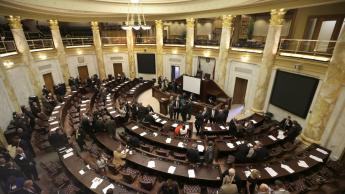 If state legislatures are as bad as their reputation, we ought to be asking questions. Like, how did they get that reputation, and what can improve it?
If state legislatures are as bad as their reputation, we ought to be asking questions. Like, how did they get that reputation, and what can improve it?
Espionage in the Revolution
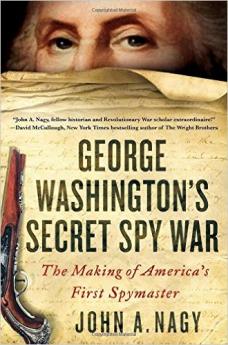 Almost everyone in the American Revolution could speak English, so it is not surprising to hear of many spies.
Almost everyone in the American Revolution could speak English, so it is not surprising to hear of many spies.
Sources of Revolutionary Populism
 A major source of growing populism among the aristocratic founding fathers was the aging of rebel boys into Revolutionary Veterans.
A major source of growing populism among the aristocratic founding fathers was the aging of rebel boys into Revolutionary Veterans.
U.S. Army Corps of Engineers in the Delaware Valley
 The Delaware division of the Corps of Engineers is dwindling away. The engineers don't know nuttin', but they say on the street, Jimmy Carter did it.
The Delaware division of the Corps of Engineers is dwindling away. The engineers don't know nuttin', but they say on the street, Jimmy Carter did it.
Fisher on TV
 They stop you on the street with a movie camera, these days.
They stop you on the street with a movie camera, these days.
Fisher on Proposed Economic Zones
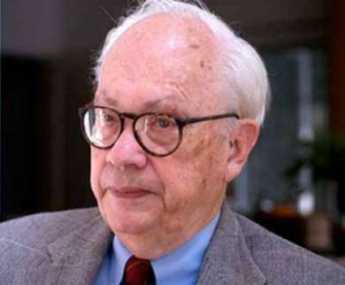 If you can't lower taxes across the board, perhaps you can lower them for specific purposes that stimulate the economy.
If you can't lower taxes across the board, perhaps you can lower them for specific purposes that stimulate the economy.
Burlington Leads the Way
Even the most rural counties can wake up and become activists. Because the leaders were Quakers, they did it without making people mad.
Fisher on Stuffing Ballot Boxes
 I hear, but scarcely can believe, that there is occasional voter fraud.
I hear, but scarcely can believe, that there is occasional voter fraud.
Yard Signs
 It is hard to know whether yard signs do any good, but they are part of the election ceremony.
It is hard to know whether yard signs do any good, but they are part of the election ceremony.
Political Parties, Absent and Unmentionable
 Our Constitution is much praised for exquisitely balancing power between the three branches of government. It would even be an achievement to require two centuries to find a way to unbalance them.
Our Constitution is much praised for exquisitely balancing power between the three branches of government. It would even be an achievement to require two centuries to find a way to unbalance them.